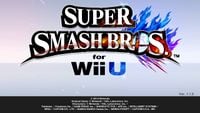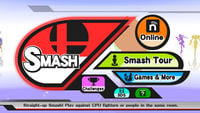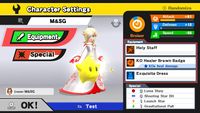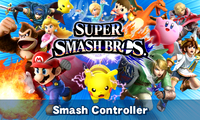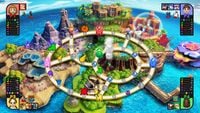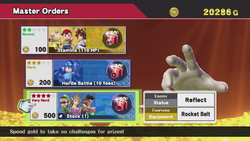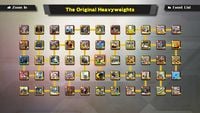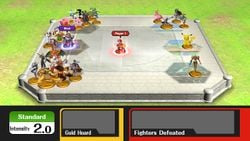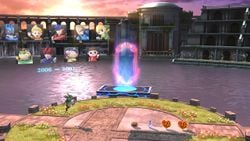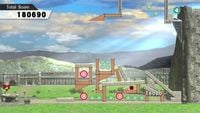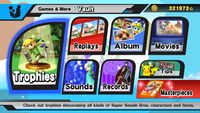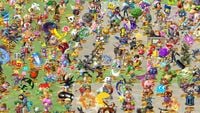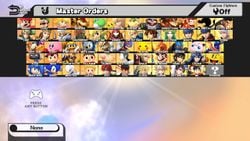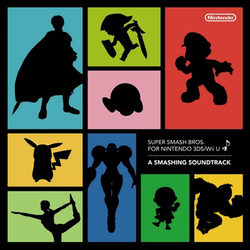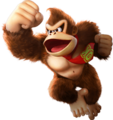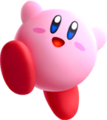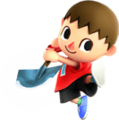Super Smash Bros. for Wii U: Difference between revisions
(→1.1.0) |
No edit summary |
||
| (434 intermediate revisions by more than 100 users not shown) | |||
| Line 1: | Line 1: | ||
{{italic title}} | {{italic title}} | ||
{{ | {{game infobox | ||
|image=[[File:SSBWiiU NA Boxart.png|250px]]<br>'''Wii U North American | |image=[[File:SSBWiiU NA Boxart.png|250px]]<br>'''Wii U North American box art''' | ||
|developer=[[Sora Ltd.]]<br>[[Bandai Namco Games]] | |developer=[[Sora Ltd.]]<br>[[Bandai Namco Entertainment|Bandai Namco Games]] | ||
|publisher=[[Nintendo]] | |publisher=[[Nintendo]] | ||
| | |release={{flag list|USA|November 21, 2014|Mexico|November 28, 2014<ref>{{cite|url=www.smashbros.com/wiiu-3ds/es-la|language=es-419|title=Sitio oficial - Super Smash Bros. para Nintendo 3DS / Wii U|publisher=Nintendo|accessdate=June 25, 2024}}</ref>|Europe|November 28, 2014|South Africa|November 28, 2014<ref>{{cite|url=www.nintendo.com/en-za/News/2014/November/Super-Smash-Bros-for-Wii-U-and-amiibo-take-South-Africa-by-storm-this-festive-season-939623.html|title=''Super Smash Bros. for Wii U'' and amiibo take South Africa by storm this festive season|date=November 27, 2014|publisher=Nintendo of South Africa|language=en-gb}}</ref>|Australia|November 29, 2014|Japan|December 6, 2014}} | ||
|genre=Fighting | |languages={{languages|en_us=y|en_gb=y|fr_fr=y|fr_ca=y|es_es=y|es_latam=y|de=y|it=y|nl=y|ru=y|pt_pt=y|jp=y}} | ||
|ratings={{ratings|esrb=E10+|pegi=12|cero=A|acb=PG|usk=12}} | |genre=[[Genre#Fighting|Fighting]] | ||
|modes=Single player | |ratings={{ratings|esrb=E10+|pegi=12|cero=A|acb=PG|usk=12|classind=10|fpb=10-12}} | ||
|modes=Single-player, Multiplayer | |||
|platforms=[[Wii U]] | |platforms=[[Wii U]] | ||
| | |format={{format|wiiu=1|wiiudl=1}} | ||
|input={{input|wiiu=1|wiiununchuk=1|wiiuclassic=1|wiiusideways=1|wiiupro=1| | |input={{input|wiiu=1|wiiununchuk=1|wiiuclassic=1|wiiusideways=1|wiiupro=1|wiiugcn=1|wiiu3ds=1}} | ||
|serials={{flag list|USA|WUP-AXFE-USA}} | |||
}} | }} | ||
'''''[[smashwiki:Super Smash Bros. for Wii U|Super Smash Bros. for Wii U]]''''' is the [[Wii U]] version of the fourth installment of the [[Super Smash Bros. (series)|''Super Smash Bros.'' series]] and was developed by [[Sora Ltd.]] and [[Bandai Namco Entertainment|Bandai Namco Games]].<ref>{{cite|url=www.nintendo.com/us/nintendo-direct/06-21-2012|title=Nintendo Direct 6.21.2012|publisher=Nintendo of America|language=en-us|accessdate=June 25, 2024}}</ref> While this game and ''[[Super Smash Bros. for Nintendo 3DS]]'' were developed simultaneously, the [[Nintendo 3DS]] version launched earlier due to its earlier completion of development. | |||
Like with most other Nintendo 3DS and Wii U software titles, this title can be purchased at retail stores and could be purchased from the [[Nintendo eShop#Wii U|Nintendo eShop]] until March 27, 2023, with the digital version requiring 15,700 MB (about 15.3 GB) of memory to be installed. Due to the amount of space that it requires, standard set Wii U consoles cannot download this title without an external storage device, but deluxe set Wii U consoles can. | |||
The game could be played online via [[Nintendo Network]], but the service was terminated on April 8, 2024, making the game no longer playable online.<ref name=Shutdown>{{cite|author=@NintendoAmerica|date=October 4, 2023|title=As of early April 2024, online play and other functionality that uses online communication will end service for Nintendo 3DS and Wii U software. Thank you very much for your continued support of our products.|url=x.com/NintendoAmerica/status/1709418623566020975|publisher=X|accessdate=February 17, 2024}}</ref><ref name=ShutdownUpdate>{{cite|author=@NintendoAmerica|date=January 23, 2024|title=Update: as of 4/8, online play and other functionality that uses online communication will end service for Nintendo 3DS and Wii U software. Thank you very much for your continued support of our products.|url=x.com/NintendoAmerica/status/1749963072998166670|publisher=X|accessdate=February 17, 2024}}</ref> | |||
A follow-up title for the [[Nintendo Switch]], ''[[Super Smash Bros. Ultimate]]'', was released four years after ''Super Smash Bros. for Wii U'' on December 7, 2018. | |||
==Gameplay== | ==Gameplay== | ||
[[File:SSBWIIUTitle.jpg|thumb|200px|Title screen.]] | |||
''Super Smash Bros. for Nintendo 3DS'' and ''Super Smash Bros. for Wii U'' have some similarities and differences from ''[[Super Smash Bros. Brawl]]'', as well as differences between the two versions. [[Final Smash | [[File:Smash Wii U Main Menu.jpg|thumb|200px|left|Main menu.]] | ||
''Super Smash Bros. for Nintendo 3DS'' and ''Super Smash Bros. for Wii U'' have some similarities and differences from ''[[Super Smash Bros. Brawl]]'', as well as differences between the two versions. [[Final Smash]]es and [[smashwiki:Footstool Jump|Footstool Jump]]ing make a return, while the "tripping" mechanic has been removed.<ref name="Developer Direct">{{cite|url=www.youtube.com/watch?v=vQD1yJinzeQ|title=Wii U & Nintendo 3DS Developer Direct - Super Smash Bros. for Nintendo 3DS and Wii U @E3 2013|author=Nintendo of America|date=June 11, 2013|publisher=YouTube|language=en-us|accessdate=June 25, 2024}}</ref> The pace of battles has also been stated to be in between ''[[Super Smash Bros. Melee]]'' and ''Super Smash Bros. Brawl''. | |||
Both games have the same roster of playable characters in order to keep them consistent. The movesets and animations of some returning characters were changed more significantly than during the transition from ''Super Smash Bros. Melee'' to ''Super Smash Bros. Brawl'', with many returning characters having completely new moves, and major alterations (such as Pit). Aesthetically, the games are much more stylized and visually intense than previous entries, with the overall colors being bolder and brighter and many elements having been redone to stand out more | Both games have the same roster of playable characters in order to keep them consistent. The movesets and animations of some returning characters were changed more significantly than during the transition from ''Super Smash Bros. Melee'' to ''Super Smash Bros. Brawl'', with many returning characters having completely new moves, and major alterations (such as Pit). Aesthetically, the games are much more stylized and visually intense than the previous entries, with the overall colors being bolder and brighter and many elements having been redone to stand out more, and the characters also appear more similar to their current appearances from their franchises of origin, lacking realistic details in them. | ||
The Wii U version does not make much use of the GamePad's touch screen during gameplay. However, in addition to Off-TV Play, the Wii U GamePad can display in-battle stats, such as damage percentages.<ref name="Smash Wii U Direct">{{cite|url=www.youtube.com/watch?v=j0BBGzfw0pQ|title=Wii U - ''Super Smash Bros. for Wii U'' 50-Fact Extravaganza|date=October 23, 2014|publisher=YouTube|language=en-us|author=Nintendo of America|accessdate=June 25, 2024}}</ref> Like in all games, Smash has its traditional fighting game mode with its customized rules where four chosen fighters play on chosen stages. This includes the Stamina mode (where players get HP that decreases), Time (time limit), Stock (lives) and Coin Battle (winner is the one that collects the most coins). Special Smash also returns in this version, allowing players to battle under certain conditions.<ref name="Smash Wii U Direct"/> | |||
===Customization/cross-connectivity=== | ===Customization/cross-connectivity=== | ||
{{main|Equipment}} | {{main|Equipment}} | ||
[[File:Rosalina-Custom- | [[File:Rosalina-Custom-SSBWiiU.jpg|thumb]] | ||
Players can send customized fighters from one version to the other. Players can customize fighter's special attacks with one of three variations for each. The Mii Fighters and Palutena, however, have custom special attacks that | Players can send customized fighters from one version to the other. Players can customize fighter's special attacks with one of three variations for each. The Mii Fighters and Palutena, however, have custom special attacks that are not variants of the original attacks; these are unlocked from the beginning. Players can also equip items to fighters to increase specific attributes (attack, defense, or speed) while sacrificing others. Up to three items can be equipped at a time, and some items provide additional side effects to the fighter.<ref>{{cite|url=www.smashbros.com/wiiu-3ds/us/howto/entry2.html|title=''Super Smash Bros. for Nintendo 3DS / Wii U'' - Character Creation|publisher=Nintendo of America|language=en-us|accessdate=June 25, 2024}}</ref> | ||
Custom characters cannot be used in With Anyone online. Additionally, by connecting the two games the player can use their Nintendo 3DS as a controller for the Wii U version<ref>S. Good, Owen | [[File:Super Smash Bros. Smash Controller title screen 2D.webp|left|thumb|Smash Controller's title screen.]] | ||
Custom characters cannot be used in "With Anyone" online. Additionally, by connecting the two games the player can use their Nintendo 3DS as a controller for the Wii U version;<ref>{{cite|author=S. Good, Owen|date=September 13, 2014|language=en|url=www.polygon.com/2014/9/13/6145039/super-smash-bros-on-will-u-will-allow-players-to-use-a-3ds-as-a|publisher=Polygon|accessdate=June 25, 2024}}</ref> alternatively, players were able to purchase the "Smash Controller" application that was released on June 14, 2015 from the Nintendo 3DS eShop to use their system as a controller.<ref>{{cite|author=Sahdev, Ishaan|date=June 14, 2015|url=www.siliconera.com/you-can-now-use-your-3ds-to-control-super-smash-bros-for-wii-u-without-a-copy-of-the-game|title=You Can Now Use Your 3DS To Control ''Super Smash Bros. for Wii U'' Without A Copy Of The Game|publisher=Siliconera|accessdate=June 25, 2024}}</ref> The "Smash Controller" application requires 314 blocks (40.1 MB) to be installed. | |||
===8-Player Smash=== | ===Exclusive modes=== | ||
[[File:SSB4 Wii U 8-player Smash.jpg|thumb|210px|An 8-Player Smash on [[Mario Galaxy (stage)|Mario Galaxy]] | ====8-Player Smash==== | ||
A new game mode known as 8-Player Smash is also available. As opposed to the traditional four player battles ''Super Smash Bros.'' is known for, up to eight players can join a single battle. In this special game mode, most stages are restricted when five or six players are playing and even more when seven or eight are playing.<ref | {{main-wiki|SmashWiki|8-Player Smash}} | ||
[[File:SSB4 Wii U 8-player Smash.jpg|thumb|210px|An 8-Player Smash on [[Mario Galaxy (stage)|Mario Galaxy]]]] | |||
A new game mode known as 8-Player Smash is also available. As opposed to the traditional four player battles ''Super Smash Bros.'' is known for, up to eight players can join a single battle. An option of four teams is allowed, with the yellow team serving as a new team color choice. In this special game mode, most stages are restricted when five or six players are playing and even more when seven or eight are playing; in stages that are playable in 8-Player Smash, stage hazards such as bosses and other features are removed for optimization purposes, though stage incompatibility has shown to be mostly arbitrary, with even some incompatible stages featuring 8-Player spawn points.<ref>{{cite|author=Soneek BCM|date=December 12, 2015|url=www.youtube.com/watch?v=DfMgThz4WYU|title=8 Player Smash on ANY stage|publisher=YouTube|accessdate=June 25, 2024}}</ref> Omega variants of the same stage may allow for more players. Players additionally cannot play coin battles in 8-Player Smash. | |||
===Smash Tour=== | ====Smash Tour==== | ||
[[File:SmashTourSSBWiiU.jpeg|thumb|200px|left|The normal sized Smash Tour board | {{main-wiki|SmashWiki|Smash Tour}} | ||
Smash Tour is a new mode serving as the exclusive mode for the Wii U version. Smash Tour is a board game mode in which players (as Miis) travel around a board by spinning a wheel, collecting fighters and power-ups for their fighters scattered around the board. Players start with two fighters by default. If two players cross paths, then all players are pitted into a Smash battle for a reward, and the winner obtains a fighter from one of the other players. Players may also obtain items that can be used to trigger various effects, and random events may also occur on the board. Checkpoints are also scattered around the board which boost players' stats when they pass over them. | [[File:SmashTourSSBWiiU.jpeg|thumb|200px|left|The normal-sized Smash Tour board]] | ||
{{br}} | Smash Tour is a new mode serving as the exclusive mode for the Wii U version. Smash Tour is a board game mode in which players (as Miis) travel around a board by spinning a wheel, collecting fighters and power-ups for their fighters scattered around the board. Players start with two fighters by default. If two players cross paths, then all players are pitted into a Smash battle for a reward, and the winner obtains a fighter from one of the other players. Players may also obtain items that can be used to trigger various effects, and random events may also occur on the board. Checkpoints are also scattered around the board which boost players' stats when they pass over them. The number of turns can be set between 15 and 25, and after all the turns have ended, players fight in a Stock match using their stat boosts, their stock based on the fighters they collected. The player can choose between a small, normal-sized, and big board to play on.<ref name="Smash Wii U Direct"/> | ||
{{br|left}} | |||
====Special Orders==== | ====Special Orders==== | ||
In Special Orders, the player has the choice of playing either "Master Orders" or "Crazy Orders", referring to [[Master Hand]] and [[Crazy Hand]] | {{main-wiki|SmashWiki|Special Orders}} | ||
[[File:MasterOrders-SSBWiiU.png|thumb|250px|Master Orders]] | |||
In Special Orders, the player has the choice of playing either "Master Orders" or "Crazy Orders", referring to [[Master Hand]] and [[Crazy Hand]]. In their respective modes, Master Hand and Crazy Hand construct challenges for the player. Players purchase tickets in order to face challenges. In Master Orders, players purchase tickets in order to try one of three challenges, the reward depending on the difficulty; each ticket is used separately, and each challenge may only be tried once. Playing Crazy Orders requires the player to either use a pass or pay 5,000 gold; the player can then play any number of challenges to rack up rewards within a set time limit before facing Crazy Hand in a final battle. If the player loses at any point they lose some of their rewards.<ref name="Smash Wii U Direct"/> | |||
====Events==== | ====Events==== | ||
Events return | [[File:SSB4 Events.jpeg|thumb|left]] | ||
Events return from the previous two installments, in which players take on a series of themed battles. Events are arranged in a grid, however, and the path forward reveals itself when the player completes a given event. Players can also receive various rewards such as trophies, gold, and Special Orders passes by completing challenges. Like in ''Super Smash Bros. Brawl'', two player Events are also available.<ref name="Smash Wii U Direct"/> | |||
{{br}} | |||
====Masterpieces==== | |||
{{main-wiki|SmashWiki|Masterpieces}} | |||
[[File:SSB4 WiiU Masterpieces.jpg|thumb|150px|The Masterpiece selection screen in ''Super Smash Bros. for Wii U'']] | |||
Masterpieces from ''Super Smash Bros. Brawl'' returns as a feature in the [[#Vault|Vault]]. It offers short demos of past Nintendo games that can be played for a certain amount of time. The game can redirect the player to the [[Nintendo eShop]] where they may purchase the [[Virtual Console]] version of the game, if it is available on the service. | |||
The following is a list of the Masterpieces: | |||
{|class="wikitable"style="text-align:center" | |||
!Game!!Time!!Menu Artwork!!Description | |||
|- | |||
|''[[Super Mario Bros.]]'' (NES) | |||
|3:00 | |||
|Mario | |||
|The game begins at the title screen rather than World 1-1 like in ''Super Smash Bros. Brawl''. | |||
|- | |||
|''[[Super Mario Bros.: The Lost Levels]]'' (NES) | |||
|3:00 | |||
|Mario | |||
|The game begins at the title screen, where the player can choose to play as Mario or [[Luigi]]. | |||
|- | |||
|''[[Wrecking Crew]]'' (NES) | |||
|2:00 | |||
|Mario | |||
|The game begins at the title screen. | |||
|- | |||
|''[[wikirby:Kirby's Dream Land|Kirby's Dream Land]]'' (Game Boy) | |||
|3:00 | |||
|Kirby | |||
|The game begins at the title screen. | |||
|- | |||
|''[[wikirby:Kirby's Adventure|Kirby's Adventure]]'' (NES) | |||
|3:00 | |||
|Kirby | |||
|The game begins at the title screen and allows the player to choose from three save files: Two from the beginning of the game, and one before the final battle. The Masterpiece is unlocked by clearing Solo Classic as Kirby on intensity 5.5 or higher. | |||
|- | |||
|''[[wikirby:Kirby Super Star|Kirby Super Star]]'' (SNES) | |||
|3:00 | |||
|Kirby | |||
|The game begins in the Great Cave Offensive. | |||
|- | |||
|''[[zeldawiki:The Legend of Zelda|The Legend of Zelda]]'' (NES) | |||
|4:00 | |||
|Link | |||
|Like the Masterpiece in ''Super Smash Bros. Brawl'', the player immediately starts from the beginning of the game. | |||
|- | |||
|''[[zeldawiki:Zelda II: The Adventure of Link|Zelda II: The Adventure of Link]]'' (NES) | |||
|4:00 | |||
|Link | |||
|The player immediately starts from the beginning of the game. | |||
|- | |||
|''[[fireemblem:Fire Emblem: Shadow Dragon and the Blade of Light|Fire Emblem: Shadow Dragon and the Blade of Light]]'' (NES) (Japan only) | |||
| | |||
|Marth | |||
| | |||
|- | |||
|''[[Super Mario World]]'' (SNES) | |||
|3:00 | |||
|Mario | |||
|The game starts on the world map in front of [[Yoshi's House]], where the player can choose to start from [[Yoshi's Island 1]] or [[Yoshi's Island 2]]. | |||
|- | |||
|''[[Super Mario Kart]]'' (SNES) | |||
|3:00 | |||
|Mario | |||
|The player starts in [[SNES Mario Circuit 1|Mario Circuit 1]] of the [[Mushroom Cup]], racing as Mario. | |||
|- | |||
|''[[Dr. Mario (game)|Dr. Mario]]'' (Game Boy) | |||
|3:00 | |||
|Dr. Mario | |||
|The game starts at the settings menu after the title screen. It is unlocked by clearing 10-Man Smash without taking damage as Dr. Mario. | |||
|- | |||
|''[[Yoshi (game)|Yoshi]]'' (NES) | |||
|3:00 | |||
|Yoshi | |||
|The game begins at the title screen. It is unlocked by clearing Solo Classic as Yoshi on any intensity. | |||
|- | |||
|''[[wikipedia:Mega Man 2|Mega Man 2]]'' (NES) | |||
|3:00 | |||
|Mega Man | |||
|Despite the menu icon depicting a screenshot of Air Man's stage, the game begins from the cutscene leading to the first stage of Wily Castle. The player has two Energy Tanks as well as every upgrade and Robot Master's weapon. | |||
|- | |||
|''[[fzerowiki:F-Zero|F-Zero]]'' (SNES) | |||
|3:00 | |||
|Captain Falcon | |||
|The player starts in Mute City, racing as the [[Blue Falcon]]. | |||
|- | |||
|''[[nwiki:Pilotwings|Pilotwings]]'' (SNES) | |||
|2:00 | |||
|Light Plane | |||
|The game starts in the Light Plane training level. | |||
|- | |||
|''[[nwiki:Pac-Man|Pac-Man]]'' (NES) | |||
|2:00 | |||
|Pac-Man | |||
|The game begins at the title screen. | |||
|- | |||
|''[[nwiki:Balloon Fight|Balloon Fight]]'' (NES) | |||
|2:00 | |||
|Villager (Balloon Trip) | |||
|The game begins at the title screen, where the player is given the choice to play the main game or Balloon Trip mode. | |||
|- | |||
|''[[Donkey Kong (game)|Donkey Kong]]'' (NES) | |||
|2:00 | |||
|Donkey Kong | |||
|The player starts at [[75m]], the second level of the NES port of the game. | |||
|- | |||
|''[[nwiki:Punch-Out!! (NES)|Punch-Out!!]]'' (NES) | |||
|3:00 | |||
|Little Mac | |||
|The game begins at the title screen. The player can choose to start from the beginning or input a password to fight an opponent encountered later in the game. The Masterpiece is unlocked by clearing the Event "No Mere Sparring Match" ("Intensive Sparring" in PAL versions) on Normal or Hard difficulty. | |||
|- | |||
|''[[metroidwiki:Metroid (game)|Metroid]]'' (NES) | |||
|3:00 | |||
|Samus | |||
|The player starts directly from the beginning of the game, where Samus first arrives on [[Brinstar]]. | |||
|- | |||
|''[[metroidwiki:Super Metroid|Super Metroid]]'' (SNES) | |||
|4:00 | |||
|Samus | |||
|The Masterpiece is exactly the same as the one in ''Super Smash Bros. Brawl'', with two save files to choose from: One at the beginning of the game, and one in Norfair. | |||
|- | |||
|''[[icaruspedia:Kid Icarus|Kid Icarus]]'' (NES) | |||
|3:00 | |||
|Pit | |||
|The player starts in the first level, the Underworld. | |||
|- | |||
|''[[wikibound:EarthBound|EarthBound]]'' (SNES) | |||
|5:00 | |||
|Ness | |||
|The game starts at the opening cutscene. It is unlocked by hitting [[Sandbag]] at least 1968 ft./600 m. in [[Home-Run Contest]]. | |||
|} | |||
===Classic=== | |||
The Wii U version's Classic Mode operates in a different manner from that of the 3DS version. It still maintains the intensity system in the 3DS version; players can spend gold to increase the intensity level, and if the player gets a Game Over, some of | {{main-wiki|SmashWiki|Classic Mode (SSB4-Wii U)}} | ||
[[File:Classic SSBWiiU.jpeg|thumb|250px|The board in Classic Mode]] | |||
The Wii U version's Classic Mode operates in a different manner from that of the 3DS version. It still maintains the intensity system in the 3DS version; players can spend gold to increase the intensity level, and if the player gets a Game Over, some of their rewards will be lost, and the intensity will lower by .5, unless the intensity level is set at 2.0. Classic Mode can be played with two players together. | |||
Instead of paths, the player has to choose which group of fighters that | Instead of paths, the player has to choose which group of fighters that they want to fight. As many as seven opponents may be fought in a single stage. One of the opponents includes the rival, which is programmed to be harder than the other opponents. The longer the rival stays alive, the stronger it becomes. On some occasions, an intruder may pop up for one match; the intruder will either be giant-sized or metallic. Some opponents may even possess rewards, which can either be gold, trophies, custom parts, or a Crazy Orders Pass. | ||
When the player KOs any opponents, their trophies will be displayed in the "Fighters Defeated" box. The defeated opponents can later be used as allies for any team battle matches. In team battles, opponents that the player's allies KO will also be added to the "Fighters Defeated" box. | When the player KOs any opponents, their trophies will be displayed in the "Fighters Defeated" box. The defeated opponents can later be used as allies for any team battle matches. In team battles, opponents that the player's allies KO will also be added to the "Fighters Defeated" box. | ||
There are a total of seven stages, with the first three stages consisting of battles against default opponents and the rival. For stages 4 and 5, the player will face an additional group of opponents, but they | There are a total of seven stages, with the first three stages consisting of battles against default opponents and the rival. For stages 4 and 5, the player will face an additional group of opponents, but they will use their alternate color schemes; these opponents may also come equipped with their custom special moves. Stage 6 pits the player against the [[Fighting Mii Team]], where they must KO twenty Fighting Miis. Stage 7 pits the player against Master Hand, but higher intensities will add Crazy Hand, and even Master Core to the mix. Unlike in the 3DS version, the player does not have the option to avoid fighting Crazy Hand on intensity levels 3.0 and higher. Upon completing the mode, the player earns a trophy of their current character. | ||
{|class="wikitable"width="100%" | |||
{|class="wikitable" width="100%" | |||
!width="10%"|Level | !width="10%"|Level | ||
!width="10%"|Intensity | !width="10%"|Intensity | ||
| Line 113: | Line 254: | ||
|2200 | |2200 | ||
|Master Hand, Crazy Hand, and Master Core (Master Giant, Master Beast, Master Edges, Master Shadow, Master Fortress (Solo only)) | |Master Hand, Crazy Hand, and Master Core (Master Giant, Master Beast, Master Edges, Master Shadow, Master Fortress (Solo only)) | ||
|} | |} | ||
===All-Star=== | |||
Unlike Classic, All-Star is almost the same as in the Nintendo 3DS version. Some differences include a larger rest area, and the | {{main-wiki|SmashWiki|All-Star Mode}} | ||
[[File:All-Star Wii U.jpg|thumb|250px|The All-Star rest area]] | |||
Unlike Classic, All-Star is almost the same as in the Nintendo 3DS version. Some differences include a larger rest area, and the characters appear in reverse chronological order; at the beginning, players face the newest characters and finish with the oldest fighters in the game. All-Star Mode can be played with two players together. | |||
Like in ''Super Smash Bros. Brawl''{{'}}s Boss Battles Mode, the player receives a [[Game Over]] with no continues if they lose their one stock or run out of time, which then leads to the results display screen showing the gold, Global Smash Power, score, trophies, Crazy Orders Passes, and custom parts that the player earned so far. | |||
{|class=wikitable style="width:50%; margin:auto; text-align:center" | Upon completing the mode, the player earns a [[Final Smash]] trophy of their current character. | ||
{|class=wikitable style="width:50%;margin:auto;text-align:center" | |||
!Time period | !Time period | ||
!Opponents | !Opponents | ||
!Stages | !Stages | ||
|- | |- | ||
| | |2015-2007**, 2007-2013 | ||
|[[Greninja]]<br>[[Lucina]]*<br>[[Robin]]<br>[[Dark Pit]]*<br>[[Shulk]]<br>[[Wii Fit Trainer]]<br>[[Rosalina]] & [[ | |[[Corrin]]**<br>[[Greninja]]<br>[[Lucina]]*<br>[[Robin]]<br>[[Dark Pit]]*<br>[[Shulk]]<br>[[Bayonetta]]**<br>[[Wii Fit Trainer]]<br>[[Rosalina]] & [[Luma]] | ||
|[[Mario Galaxy]]<br>[[Kalos Pokémon League]]<br>[[Skyworld]]<br>[[Coliseum]]<br>[[Wii Fit Studio]] | |[[Mario Galaxy]]<br>[[Kalos Pokémon League]]<br>[[Skyworld]]<br>[[Coliseum (stage)|Coliseum]]<br>[[Wii Fit Studio]]<br>[[Umbra Clock Tower]]** | ||
|- | |- | ||
|2006-2001 | |2006-2001 | ||
|[[Lucas]]**<br>[[Lucario]]<br>[[Ike]]<br>[[Zero Suit Samus]]<br>[[Toon Link]]<br>[[Bowser Jr.]]<br>[[Roy (Fire Emblem)|Roy]]**<br>[[Olimar]]<br>[[Villager]] | |[[Lucas]]**<br>[[Lucario]]<br>[[Ike]]<br>[[Samus|Zero Suit Samus]]<br>[[Link|Toon Link]]<br>[[Bowser Jr.]]<br>[[Roy (Fire Emblem)|Roy]]**<br>[[Captain Olimar|Olimar]]<br>[[Villager]] | ||
|[[Town and City]]<br>[[Smashville]]<br>[[Mario Circuit (Super Smash Bros. for Wii U)|Mario Circuit]]<br>[[Pyrosphere (stage)|Pyrosphere]]<br>[[Castle Siege]]<br>[[Garden of Hope]] | |[[Town and City]]<br>[[Smashville]]<br>[[Mario Circuit (Super Smash Bros. for Wii U)|Mario Circuit]]<br>[[Pyrosphere (stage)|Pyrosphere]]<br>[[Castle Siege]]<br>[[Garden of Hope]]<br>[[Pirate Ship (stage)|Pirate Ship]]** | ||
|- | |- | ||
|1998-1994 | |1998-1994 | ||
|[[Ganondorf]]<br>[[Sheik]]<br>[[Jigglypuff]]<br>[[Charizard]]<br>[[Pikachu]]<br>[[Mewtwo]]**<br>[[Diddy Kong]]<br>[[Ness]] | |[[Ganondorf]]<br>[[Sheik]]<br>[[Cloud Strife|Cloud]]**<br>[[Jigglypuff]]<br>[[Charizard]]<br>[[Pikachu]]<br>[[Mewtwo]]**<br>[[Diddy Kong]]<br>[[Ness]] | ||
|[[Onett]]<br>[[Pokémon Stadium 2]]<br>[[Bridge of Eldin]]<br>[[Kongo Jungle (Super Smash Bros.)|Kongo Jungle 64]] | |[[Onett]]<br>[[Pokémon Stadium 2]]<br>[[Bridge of Eldin]]<br>[[Kongo Jungle (Super Smash Bros.)|Kongo Jungle 64]]<br>[[Midgar]]** | ||
|- | |- | ||
|1993-1991 | |1993-1991 | ||
|[[Meta Knight]]<br>[[Falco Lombardi|Falco]]*<br>[[ | |[[Meta Knight]]<br>[[Falco Lombardi|Falco]]*<br>[[Fox]]<br>[[Wario]]*<br>[[King Dedede]]<br>[[Kirby]]<br>[[Sonic]] | ||
|[[Halberd]]<br>[[Orbital Gate Assault]]<br>[[Lylat Cruise]]<br>[[Gamer (stage)|Gamer]]<br>[[Windy Hill Zone]]<br>[[Dream Land (Super Smash Bros.)|Dream Land (64)]] | |[[Halberd]]<br>[[Orbital Gate Assault]]<br>[[Lylat Cruise]]<br>[[Gamer (stage)|Gamer]]<br>[[Windy Hill Zone]]<br>[[Dream Land (Super Smash Bros.)|Dream Land (64)]]** | ||
|- | |- | ||
|1990-1986 | |1990-1986 | ||
|[[Captain Falcon]]<br>[[Yoshi]]<br>[[Dr. Mario]]*<br>[[Marth]]<br>[[Mega Man]]<br>[[Ryu]]**<br>[[Palutena]]<br>[[Pit]] | |[[Captain Falcon]]<br>[[Yoshi]]<br>[[Dr. Mario]]*<br>[[Marth]]<br>[[Mega Man]]<br>[[Ryu]]**<br>[[Palutena]]<br>[[Pit (character)|Pit]] | ||
|[[Wily Castle]]<br>[[Woolly World]]<br>[[Yoshi's Island (Super Smash Bros. Melee)|Yoshi's Island]]<br>[[Port Town Aero Dive]]<br>[[Suzaku Castle]] | |[[Wily Castle]]<br>[[Woolly World]]<br>[[Yoshi's Island (Super Smash Bros. Melee)|Yoshi's Island]]<br>[[Port Town Aero Dive]]<br>[[Suzaku Castle]]** | ||
|- | |- | ||
|1986-1984 | |1986-1984*, 1986-1985 | ||
|[[Samus]]<br>[[ | |[[Samus]]<br>[[Zelda]]<br>[[Link]]<br>[[Bowser]]<br>[[Princess Peach|Peach]]<br>[[R.O.B.]]*<br>[[Duck Hunt (character)|Duck Hunt]]* | ||
|[[Mushroom Kingdom U]]<br>[[ | |[[Mushroom Kingdom U]]<br>[[Figure-8 Circuit (stage)|Mario Circuit (Brawl)]]<br>[[Skyloft]]<br>[[Norfair]]<br>[[Duck Hunt (stage)|Duck Hunt]]<br>[[Wrecking Crew (stage)|Wrecking Crew]]<br>[[Peach's_Castle (Super Smash Bros.)|Peach's Castle (64)]]**<br>[[Hyrule Castle|Hyrule Castle (64)]]** | ||
|- | |- | ||
|1984-1980 | |1984-1980 | ||
| Line 152: | Line 297: | ||
|[[Delfino Plaza]]<br>[[Luigi's Mansion (stage)|Luigi's Mansion]]<br>[[Flat Zone X]]<br>[[Pac-Land]] | |[[Delfino Plaza]]<br>[[Luigi's Mansion (stage)|Luigi's Mansion]]<br>[[Flat Zone X]]<br>[[Pac-Land]] | ||
|} | |} | ||
<small>* - Only available in the full All-Star mode.</small> | |||
<small>** - Downloadable content. Only available in this mode after downloading, but it will be removed if the player deletes the game's DLC data. Inclusion does not affect any of the game's challenges.</small> | |||
===Stadium=== | |||
{{main-wiki|SmashWiki|Stadium}} | |||
[[File:Target Blast (Super Smash Bros. for Wii U).jpg|thumb|Target Blast]] | |||
Just like in the Nintendo 3DS version, three stadium games are playable. [[Home-Run Contest]] follows the same rules as in the previous installment but with an option to compete with four players. [[Target Blast]] now has three stages to play with instead of one, up to four players can participate, and the bomb is bigger in the second round, resulting a bigger explosion when that happens. Multi-Man Smash remains the same as in the Nintendo 3DS version. Multi-Man Smash can be played with up to four players. | |||
=== | ===Vault=== | ||
[[File: | {{main-wiki|SmashWiki|Vault}} | ||
[[File:SSB4 Vault Menu.jpeg|thumb|left|Vault menu]] | |||
Similar to the Nintendo 3DS version, the Vault allows players to view and buy Trophies and view records, tips, and replays as well as listen to the sound effects and music. In this version, however, players can also view the games' promotional trailers, ending movies for the fighters, as well as play [[#Masterpieces|Masterpieces]]. | |||
{{br}} | |||
Similar to the Nintendo 3DS version, the Vault allows players to view and buy Trophies and view records, tips, and replays as well as listen to the sound effects and music. In this version however, players can also view the games' promotional trailers, ending movies for the fighters, as well as play Masterpieces. | ====Trophies==== | ||
{{main|List of trophies in Super Smash Bros. for Wii U}} | {{main|List of trophies in Super Smash Bros. for Wii U}} | ||
There are a total of | [[File:Wii U Trophy Hoard.jpg|thumb|A hoard of trophies]] | ||
There are a total of 743 trophies in the Wii U version. In the Trophies menu, players have the option to buy Trophies from the Trophy Shop like in the Nintendo 3DS version. Trophy Rush is also available, though in this version up to two players can play. Like in ''Super Smash Bros. Brawl'', Photo Studio allows the player to pose and resize their Trophies on various backgrounds and take pictures of them. Another new mode known as Trophy Box allows the player to fill boxes with trophies based on given criteria, such as game series (''Paper Mario'', ''New Super Mario Bros.'') or specific games (''Super Mario Galaxy'', ''Super Mario Galaxy 2'').<ref name="Smash Wii U Direct"/> | |||
{{br}} | |||
==Online Play== | ==Online Play== | ||
This game features online play similar to ''Super Smash Bros. Brawl'' in that players from all over the world can face others in matches. When playing With Friends, players can customize the rules to their liking. Voice chat is also available when playing With Friends, though like ''Mario Kart 8'' it can only be used between battles.<ref name="Smash Wii U Direct" | This game features online play similar to ''Super Smash Bros. Brawl'' in that players from all over the world can face others in matches. When playing With Friends, players can customize the rules to their liking. Voice chat is also available when playing With Friends, though like ''Mario Kart 8'' it can only be used between battles.<ref name="Smash Wii U Direct"/> When playing With Anyone, two basic options are available: For Fun and For Glory. In For Fun mode, players battle on randomly-selected normal stages, excluding Final Destination, with all items turned on. Losses are not recorded in this mode. In For Glory mode, players only play on the flat, Final Destination versions of stages, without items. Players can either play standard Smash or Team Smash matches in both modes, and For Glory offers a 1-on-1 mode as well. | ||
Conquest pits some of the game's various characters against each other, and players who win battles with them in With Anyone mode will add points to that character's score. After a few days, the winning fighter is revealed, players who took part in the conquest by playing as that character get rewarded with gold, and the next conquest begins. | Conquest pits some of the game's various characters against each other, and players who win battles with them in With Anyone mode will add points to that character's score. After a few days, the winning fighter is revealed, players who took part in the conquest by playing as that character get rewarded with gold, and the next conquest begins. | ||
| Line 207: | Line 326: | ||
==Playable characters== | ==Playable characters== | ||
Including DLC characters, this installment features a total of | [[File:SSBWiiU Character Select.jpg|thumb|250px|The full character select screen, including all downloadable characters.]] | ||
Including DLC characters, this installment features a total of 58 playable characters. These consist of 37 veterans and 21 newcomers. Certain characters from the previous ''Super Smash Bros.'' games have been removed from the rosters of both the Nintendo 3DS and Wii U versions in order to keep them consistent, partly due to limitations with the Nintendo 3DS version. Unlike the previous games in the series, with the removal of in-game transformations, [[Sheik]], [[Samus|Zero Suit Samus]], and [[Charizard]] are now standalone characters. Of the playable character roster, if excluding [[Mii Fighter]]s and [[Roy (Fire Emblem)|Roy]], eleven originate from the [[Super Mario (franchise)|''Super Mario'' franchise]] and its spin-off series (eighteen if counting each of the Koopalings), with [[Mario]], [[Luigi]], [[Princess Peach|Peach]], [[Bowser]], [[Rosalina]] & [[Luma]], [[Dr. Mario]], [[Bowser Jr.]], [[Donkey Kong]], [[Diddy Kong]], [[Yoshi]], and [[Wario]] being playable. | |||
[[Mewtwo]] returns from ''Super Smash Bros. Melee'' as a downloadable, 50th character, releasing for free to Club Nintendo members who signed up for a promotion involving the purchase of both the Nintendo 3DS and Wii U versions of the game.<ref name=" | [[Mewtwo]] returns from ''Super Smash Bros. Melee'' as a downloadable, 50th character, releasing for free to Club Nintendo members who signed up for a promotion involving the purchase of both the Nintendo 3DS and Wii U versions of the game.<ref name="clubnintendo">{{cite|deadlink=y|archive=web.archive.org/web/20140902060741/http://club2.nintendo.com/smash-promo|title=Super Smash Bros Offer|publisher=Club Nintendo|language=en-us|accessdate=June 25, 2024}}</ref> It was released as a paid download later on for those who did not register both versions.<ref name="Mewtwo confirmed to launch as paid DLC later on">{{cite|url=x.com/nintendoeurope/status/535440807214743552|title=Mewtwo will be available to purchase later in #SmashBros, for those who don't register both versions. <nowiki>http://</nowiki>fal.cn/Efs|publisher=X|accessdate=June 25, 2024|date=November 20, 2014|language=en-gb|author=Nintendo of Europe}}</ref> In addition, two more characters return from the previous installments as downloadable characters, namely Roy from ''Super Smash Bros. Melee'' and [[Lucas]] from ''Super Smash Bros. Brawl''. Four more newcomers made their debut as playable characters: [[Ryu]] from the ''{{wp|Street Fighter}}'' series, [[Cloud Strife]] from ''{{iw|strategywiki|Final Fantasy VII}}'', [[Corrin]] from ''{{iw|fireemblem|Fire Emblem Fates}}'', and [[Bayonetta]] from the ''{{iw|nwiki|Bayonetta series|Bayonetta}}'' series. DLC characters do not have any custom special moves or any unique Palutena's Guidance conversations. | ||
With the discontinuation of digital purchases for Wii U in March 2023, it is no longer possible to buy the downloadable characters, though they can still be downloaded by those who purchased them when they were available. | |||
'''NOTE''': Characters in ''italics'' are newcomers. | '''NOTE''': Characters in ''italics'' are newcomers. | ||
{|class=wikitable width=100% | |||
!colspan="5"style="font-size:12px"| | |||
===Default characters=== | |||
|- | |||
!style="font-size:12px"width="22%"colspan="2"|Character | |||
!style="font-size:12px"width="40%"|Trophy description | |||
!style="font-size:12px"width="19%"|Special Attacks | |||
!style="font-size:12px"width="19%"|Final Smash | |||
|- | |||
!align=center colspan="2"|[[File:Mario SSB4 Artwork.png|120x120px]]<br>[[Mario]][[File:Mario Emblem.png|35px|class=invert-dark]] | |||
|As iconic as iconic gets, this gaming celebrity is known for saving the world from Bowser. He's got amazing jumping skills and makes use of a wide range of transformations. In his free time, he plays too many sports to count. In Smash Bros., he's a well-rounded fighter you can rely on. Say it with me: "It’s-a me, Mario!" | |||
|Standard - [[Fireball]]<br>Side - [[Cape]]<br>Up - [[Super Jump Punch]]<br>Down - [[F.L.U.D.D.]] | |||
|[[Mario Finale]] | |||
|- | |||
!align=center colspan="2"|[[File:Luigi SSBWiiU.png|120x120px]]<br>[[Luigi]][[File:Mario Emblem.png|35px|class=invert-dark]] | |||
|Luigi recently celebrated his 30th anniversary with the [[Year of Luigi]], but all that attention just made him even more shy and awkward. In Smash Bros., Luigi takes a lot of cues from his brother in fighting style, adding flair to moves like Super Jump Punch. His taunts, however, are truly unique. | |||
|Standard - [[Green Fireball|Fireball]]<br>Side - [[Green Missile]]<br>Up - [[Super Jump Punch]]<br>Down - [[Luigi Cyclone]] | |||
|[[Poltergust 5000]] | |||
|- | |||
!align=center colspan="2"|[[File:Wii U Peach artwork.png|120x120px]]<br>[[Princess Peach|Peach]][[File:Mario Emblem.png|35px|class=invert-dark]] | |||
|Princess of the Mushroom Kingdom, Peach continues to prove that "powerful" and "cute" are not mutually exclusive. In Smash Bros., Peach uses her dress to float above the fray, suddenly descending and attacking with numerous weapons. A frying pan? Umbrella? TOAD?! Where does she keep it all? | |||
|Standard - [[Toad (move)|Toad]]<br>Side - [[Peach Bomber]]<br>Up - [[Peach Parasol (move)|Peach Parasol]]<br>Down - [[Vegetable (move)|Vegetable]] | |||
|[[Peach Blossom]] | |||
|- | |||
!align=center colspan="2"|[[File:SSB4 - Bowser Artwork.png|120x120px]]<br>[[Bowser]][[File:Mario Emblem.png|35px|class=invert-dark]] | |||
|The archenemy of Mario and the reason Peach spends more time kidnapped than in [[Peach's Castle|her own castle]]. His plans aren't always the best, and occasionally he even finds himself on Mario's side. In Smash Bros., he's a serious heavyweight who laughs off weaker attacks. Hit him hard to send him flying! | |||
|Standard - [[Fire Breath]]<br>Side - [[Flying Slam]]<br>Up - [[Whirling Fortress]]<br>Down - [[Bowser Bomb (move)|Bowser Bomb]] | |||
|[[Giga Bowser]] | |||
|- | |||
!align=center colspan="2"|[[File:YoshiSSB4.png|120x120px]]<br>[[Yoshi]][[File:Yoshi Emblem.png|30px|class=invert-dark]] | |||
|As dependable a partner as one could hope for, Yoshi often aids Mario in his adventures. Yoshi can swallow just about anything and make an egg of it instantly. He's got some serious airborne power, making launching opponents skyward and then following up with more attacks a wise choice. | |||
|Standard - [[Egg Lay]]<br>Side - [[Egg Roll (move)|Egg Roll]]<br>Up - [[Egg Throw]]<br>Down - [[Yoshi Bomb]] | |||
|[[Super Dragon]] | |||
|- | |||
!align=center colspan="2"|[[File:SSB4 Rosalina Artwork.png|120x120px]]<br>''[[Rosalina]] & [[Luma]]''[[File:Mario Emblem.png|35px|class=invert-dark]] | |||
|The mysterious Rosalina lives in the Comet Observatory with the Lumas. She first traveled with them in search of their mother. In Smash Bros., Rosalina and Luma can fight in different places at the same time. If you can trap someone between Rosalina and Luma, you'll be able to unleash incredible damage! | |||
|Standard - [[Luma Shot]]<br>Side - [[Star Bit]]s<br>Up - [[Launch Star (move)|Launch Star]]<br>Down - [[Gravitational Pull (move)|Gravitational Pull]] | |||
|[[Grand Star (move)|Power Star]] | |||
|- | |||
!align=center colspan="2"|[[File:Bowser Jr - Super Smash Bros. for Nintendo 3DS and Wii U.png|120x120px]]<br>''[[Bowser Jr.]]''[[File:Mario Emblem.png|35px|class=invert-dark]]<br><small>Alternate characters: The seven [[Koopalings]]</small> | |||
|Bowser's beloved, spoiled son sports a bandanna with a large mouth drawn on it. Like his father, Bowser Jr. longs to take Mario down. In Smash Bros., he'll fight from inside his heavily armed Junior Clown Car. The Clown Car takes less damage than Bowser Jr., so mind your positioning. | |||
|Standard - [[Clown Cannon]]<br>Side - [[Clown Kart Dash]]<br>Up - [[Abandon Ship (move)|Abandon Ship]]<br>Down - [[Mechakoopa (move)|Mechakoopa]] | |||
|[[Shadow Mario Paint]] | |||
|- | |||
!align=center colspan="2"|[[File:SSB4 - Donkey Kong Artwork.png|120x120px]]<br>[[Donkey Kong]][[File:DK Emblem.png|30px|class=invert-dark]] | |||
|This king of the jungle really, really loves bananas. His adventures usually start with people stealing his hoard of them. In Smash Bros., he's known for his incredible strength and long reach. Despite his size, he's still pretty quick. He can even jump carrying heavy items! Use this knowledge well. | |||
|Standard - [[Giant Punch]]<br>Side - [[Headbutt]]<br>Up - [[Spinning Kong]]<br>Down - [[Hand Slap]] | |||
|[[Konga Beat]] | |||
|- | |||
!align=center colspan="2"|[[File:Diddy Kong SSB4 - Artwork.png|120x120px]]<br>[[Diddy Kong]][[File:DK Emblem.png|30px|class=invert-dark]] | |||
|Donkey Kong's trusty partner. He sports his signature look: red hat, red shirt, Rocketbarrel Pack. In Smash Bros., he's incredibly agile. Charge the Rocketbarrel Pack by holding down the button before launch, and you can steer with left and right. Don't forget to drop banana peels--enemies love it! | |||
|Standard - [[Popgun|Peanut Popgun]]<br>Side - [[Monkey Flip]]<br>Up - [[Rocketbarrel Boost]]<br>Down - [[Banana Peel (move)|Banana Peel]] | |||
|[[Rocketbarrel Barrage]] | |||
|- | |||
!align=center colspan="2"|[[File:LittleMacSSB4.png|120x120px]]<br>''[[Little Mac]]''[[File:PunchOutSymbol.png|35px|class=invert-dark]] | |||
|This little boxer from the Punch-Out!! series makes up in heart what he lacks in height. He wasn't afraid to take on the boxing champs, and he's not afraid of the Nintendo stars. In Smash Bros., he packs a serious punch. When his KO Meter fills up, wade in and trigger a devastating uppercut. | |||
|Standard - [[Little Mac#Straight Lunge|Straight Lunge]]<br>Side - [[Little Mac#Jolt Haymaker|Jolt Haymaker]]<br>Up - [[Little Mac#Rising Uppercut|Rising Uppercut]]<br>Down - [[Little Mac#Slip Counter|Slip Counter]] | |||
|[[Little Mac#Giga Mac|Giga Mac]] | |||
|- | |||
!align=center colspan="2"|[[File:SSB4 - Link Artwork.png|120x120px]]<br>[[Link]][[File:Zelda Emblem.png|30px|class=invert-dark]] | |||
|Green clothes? Pointy hat? Yep, it's Link, all right! In this game, his sword and shield make for effective attacking and blocking, and his bow, bombs and boomerang will spice up any battle. He's even brought his Clawshot for grabbing enemies and edges. Jeez, just how much stuff can Link carry? | |||
|Standard - [[Link#Hero's Bow|Hero's Bow]]<br>Side - [[Link#Gale Boomerang|Gale Boomerang]]<br>Up - [[Link#Spin Attack|Spin Attack]]<br>Down - [[Link#Bomb|Bomb]] | |||
|[[Link#Triforce Slash|Triforce Slash]] | |||
|- | |||
!align=center colspan="2"|[[File:SSB4 - Zelda Artwork.png|120x120px]]<br>[[Zelda]][[File:Zelda Emblem.png|30px|class=invert-dark]] | |||
|This is the namesake of the Legend of Zelda games. Her appearance may change, but she always plays an important role. In Smash Bros., she's quick on the draw when it comes to magic, though a bit slow when moving. She has a new move that summons a Phantom to her aid. | |||
|Standard - [[Zelda#Nayru's Love|Nayru's Love]]<br>Side - [[Zelda#Din's Fire|Din's Fire]]<br>Up - [[Zelda#Farore's Wind|Farore's Wind]]<br>Down - [[Zelda#Phantom Slash|Phantom Slash]] | |||
|[[Zelda#Light Arrow|Light Arrow]] | |||
|- | |||
!align=center colspan="2"|[[File:SheikSSB4.png|120x120px]]<br>[[Sheik]][[File:Zelda Emblem.png|30px|class=invert-dark]] | |||
|In The Legend of Zelda: Ocarina of Time, Sheik claimed to be a surviving Sheikah. However, this was just a cunning disguise for Princess Zelda so that she could escape Ganondorf. In Smash Bros., she's the complete opposite of Zelda, striking with fast attacks that can keep an opponent off balance. | |||
|Standard - [[Sheik#Needle Storm|Needle Storm]]<br>Side - [[Sheik#Burst Grenade|Burst Grenade]]<br>Up - [[Sheik#Vanish|Vanish]]<br>Down - [[Sheik#Bouncing Fish|Bouncing Fish]] | |||
|[[Sheik#Light Arrow|Light Arrow]] | |||
|- | |||
!align=center colspan="2"|[[File:GanondorfSSB4.png|120x120px]]<br>[[Ganondorf]][[File:Zelda Emblem.png|30px|class=invert-dark]] | |||
|The King of Evil that awaits Link at the end of most of his adventures. Ganondorf possesses the Triforce of Power. In Smash Bros., he makes up for his low speed with devastating power. The strength of his blows can knock back most opponents. Get close with a dash attack and pummel your foes! | |||
|Standard - [[Ganondorf#Warlock Punch|Warlock Punch]]<br>Side - [[Ganondorf#Flame Choke|Flame Choke]]<br>Up - [[Ganondorf#Dark Dive|Dark Dive]]<br>Down - [[Ganondorf#Wizard's Foot|Wizard's Foot]] | |||
|[[Ganondorf#Beast Ganon|Beast Ganon]] | |||
|- | |||
!align=center colspan="2"|[[File:SSB4 - Toon Link Artwork.png|120x120px]]<br>[[Link|Toon Link]][[File:Zelda Emblem.png|30px|class=invert-dark]] | |||
|This cartoonish version of Link is how he appeared in The Legend of Zelda: The Wind Waker and a few other titles. In Smash Bros., he uses moves much like his older, taller counterpart. His small size gives him extra speed, though, so take advantage of that to send your foes flying. | |||
|Standard - [[Link#Hero's Bow|Hero's Bow]]<br>Side - [[Link#Boomerang|Boomerang]]<br>Up - [[Link#Spin Attack|Spin Attack]]<br>Down - [[Link#Bomb|Bomb]] | |||
|[[Link#Triforce Slash|Triforce Slash]] | |||
|- | |||
!align=center colspan="2"|[[File:SSB4 - Samus Artwork.png|120x120px]]<br>[[Samus]][[File:Metroid Emblem.png|30px|class=invert-dark]] | |||
|Samus Aran has fought her way across a variety of planets in the Metroid series. She wears a Power Suit designed by the Chozo, giving her incredible versatility in a fight. She can wade in, but she favors beams and missiles. A fully charged Charge Shot packs a serious punch! | |||
|Standard - [[Samus#Charge Shot|Charge Shot]]<br>Side - [[Samus#Missile|Missile]]<br>Up - [[Samus#Screw Attack|Screw Attack]]<br>Down - [[Samus#Bomb|Bomb]] | |||
|[[Samus#Zero Laser|Zero Laser]] | |||
|- | |||
!align=center colspan="2"|[[File:ZeroSuitSamusSSB4.png|120x120px]]<br>[[Samus|Zero Suit Samus]][[File:Metroid Emblem.png|30px|class=invert-dark]] | |||
|Samus is far from helpless when her Power Suit is deactivated. Sure, she loses a lot of the moves and weapons she had access to before, but her Jet Boots pick up the slack! She also has the Paralyzer, a versatile weapon that can shock her rivals or change into a Plasma Whip to grab edges and enemies. | |||
|Standard - [[Samus#Paralyzer|Paralyzer]]<br>Side - [[Samus#Plasma Whip|Plasma Whip]]<br>Up - [[Samus#Boost Kick|Boost Kick]]<br>Down - [[Samus#Flip Jump|Flip Jump]] | |||
|[[Samus#Gunship|Gunship]] | |||
|- | |||
!align=center colspan="2"|[[File:PitSSB4.png|120x120px]]<br>[[Pit (character)|Pit]][[File:KidIcarus Emblem.png|35px|class=invert-dark]] | |||
|Pit is the captain of Palutena's royal guard. Despite the wings on his back, Pit needs the Power of Flight from Palutena in order to truly fly. In Smash Bros., he can still get more air than most, with four jumps and a special move that boosts him higher. He has a new reflect move-it protects both sides! | |||
|Standard - [[Pit (character)#Palutena Bow|Palutena Bow]]<br>Side - [[Pit (character)#Upperdash Arm|Upperdash Arm]]<br>Up - [[Pit (character)#Power of Flight|Power of Flight]]<br>Down - [[Pit (character)#Guardian Orbitars|Guardian Orbitars]] | |||
|[[Pit (character)#Three Sacred Treasures|Three Sacred Treasures]] | |||
|- | |||
!align=center colspan="2"|[[File:Palutena SSB4.png|120x120px]]<br>''[[Palutena]]''[[File:KidIcarus Emblem.png|30px|class=invert-dark]] | |||
|In Kid Icarus: Uprising, the goddess of light uses telepathy to communicate and grants miracles to support Pit on his adventure. In Smash Bros., she has special moves like Warp and Heavenly Light at her disposal. She's very adaptable-you can customize her into a long- or close-range fighter! | |||
|Standard - [[Palutena#Autoreticle|Autoreticle]] / [[Palutena#Explosive Flame|Explosive Flame]] / [[Palutena#Heavenly Light|Heavenly Light]]<br>Side - [[Palutena#Reflect Barrier|Reflect Barrier]] / [[Palutena#Angelic Missile|Angelic Missile]] / [[Palutena#Super Speed|Super Speed]]<br>Up - [[Palutena#Warp|Warp]] / [[Palutena#Jump Glide|Jump Glide]] / [[Palutena#Rocket Jump|Rocket Jump]]<br>Down - [[Palutena#Counter|Counter]] / [[Palutena#Lightweight|Lightweight]] / [[Palutena#Celestial Firework|Celestial Firework]] | |||
|[[Palutena#Black Hole Laser|Black Hole Laser]] | |||
|- | |||
!align=center colspan="2"|[[File:SSB4 - Marth Artwork.png|120x120px]]<br>[[Marth]][[File:FireEmblem Emblem.png|30px|class=invert-dark]] | |||
|The first hero from the Fire Emblem series, Marth is the prince of Altea and descendant of the hero Anri. In Smash Bros, he's known as an exceptional swordfighter, swinging his blade with grace. Striking with the tip will maximize the damage dealt. Teach aggressive foes a lesson with his strong Counter move. | |||
|Standard - [[Marth#Shield Breaker|Shield Breaker]]<br>Side - [[Marth#Dancing Blade|Dancing Blade]]<br>Up - [[Marth#Dolphin Slash|Dolphin Slash]]<br>Down - [[Marth#Counter|Counter]] | |||
|[[Marth#Critical Hit|Critical Hit]] | |||
|- | |||
!align=center colspan="2"|[[File:IkeSSB4.png|120x120px]]<br>[[Ike]][[File:FireEmblem Emblem.png|30px|class=invert-dark]] | |||
|One of the main characters of the Fire Emblem series. Having fought in the Mad King's War, restored the fallen nation of Crimea and taken on the Begnion Empire, Ike is rightly called a hero. He has the strength to back the title-one good swing of his blade can launch the heaviest of foes. | |||
|Standard - [[Ike#Eruption|Eruption]]<br>Side - [[Ike#Quick Draw|Quick Draw]]<br>Up - [[Ike#Aether|Aether]]<br>Down - [[Ike#Counter|Counter]] | |||
|[[Ike#Great Aether|Great Aether]] | |||
|- | |||
!align=center colspan="2"|[[File:Robin SSB4.png|120x120px]]<br>''[[Robin]]''[[File:FireEmblem Emblem.png|30px|class=invert-dark]]<br><small>Male/female variants</small> | |||
|This is the male Robin, an avatar in Fire Emblem Awakening. The goal of that game doesn't change much because of your gender choice, but Robin's hairstyle options do. In Smash Bros., Robin brings powerful magic and swordplay to bear. He can exhaust his moves, but they'll be restored over time. | |||
|Standard - [[Robin#Thunder|Thunder]]<br>Side - [[Robin#Arcfire|Arcfire]]<br>Up - [[Robin#Elwind|Elwind]]<br>Down - [[Robin#Nosferatu|Nosferatu]] | |||
|[[Robin#Pair Up|Pair Up]] | |||
|- | |||
!align=center colspan="2"|[[File:KirbySSB4.png|120x120px]]<br>[[Kirby]][[File:Kirby Emblem.png|30px|class=invert-dark]] | |||
|Round little Kirby lives on the peaceful Planet Popstar, in Dream Land. He can inhale things with his big mouth, either copying their abilities or spitting them out again. In Smash Bros., Kirby can inhale opponents and copy their standard specials. He gets launched easily but recovers well. | |||
|Standard - [[Kirby#Inhale|Inhale]]<br>Side - [[Kirby#Hammer Flip|Hammer Flip]]<br>Up - [[Kirby#Final Cutter|Final Cutter]]<br>Down - [[Kirby#Stone|Stone]] | |||
|[[Kirby#Ultra Sword|Ultra Sword]] | |||
|- | |||
!align=center colspan="2"|[[File:SSB4 - Dedede Artwork.png|120x120px]]<br>[[King Dedede]][[File:Kirby Emblem.png|30px|class=invert-dark]] | |||
|He calls himself the King of Dream Land, but he doesn't have a lot of interest in ruling. He really loves to eat, so it's no surprise he's a heavyweight fighter. Despite his size and low speed, he can easily recover with his four jumps. His Jet Hammer will leave a mark on everyone he meets. | |||
|Standard - [[King Dedede#Inhale|Inhale]]<br>Side - [[King Dedede#Gordo Throw|Gordo Throw]]<br>Up - [[King Dedede#Super Dedede Jump|Super Dedede Jump]]<br>Down - [[King Dedede#Jet Hammer|Jet Hammer]] | |||
|[[King Dedede#Dedede Burst|Dedede Burst]] | |||
|- | |||
!align=center colspan="2"|[[File:Meta Knight SSB4.png|120x120px]]<br>[[Meta Knight]][[File:Kirby Emblem.png|30px|class=invert-dark]] | |||
|Kirby's mysterious rival, this masked swordsman appears in several Kirby games. His cape transforms into wings to grant him flight. In Smash Bros., his quick sword skills and aerial agility set him apart. He can jump up to five times in a row and he has a special move to soar higher. | |||
|Standard - [[Meta Knight#Mach Tornado|Mach Tornado]]<br>Side - [[Meta Knight#Drill Rush|Drill Rush]]<br>Up - [[Meta Knight#Shuttle Loop|Shuttle Loop]]<br>Down - [[Meta Knight#Dimensional Cape|Dimensional Cape]] | |||
|[[Meta Knight#Galaxia Darkness|Galaxia Darkness]] | |||
|- | |||
!align=center colspan="2"|[[File:FoxSSB4.png|120x120px]]<br>[[Fox]][[File:StarFox Emblem.png|30px|class=invert-dark]] | |||
|Fox is the leader of the mercenary unit Star Fox, often enlisted to defeat the evil Andross. His piloting skills are top notch, but in Smash Bros. he brings speed and fast attacks to the battle. His Reflector move allows him to turn projectile attacks against his foes, increasing their power for a punishing blow. | |||
|Standard - [[Fox#Blaster|Blaster]]<br>Side - [[Fox#Fox Illusion|Fox Illusion]]<br>Up - [[Fox#Fire Fox|Fire Fox]]<br>Down - [[Fox#Reflector|Reflector]] | |||
|[[Fox#Landmaster|Landmaster]] | |||
|- | |||
!align=center colspan="2"|[[File:SSB4 - Pikachu Artwork.png|120x120px]]<br>[[Pikachu]][[File:Pokemon Emblem.png|30px|class=invert-dark]] | |||
|Recognized the world over, Pikachu is an Electric-type Pokémon that stores energy in its cheeks for use in battle. In Smash Bros., Pikachu is a well-rounded fighter with speedy, powerful electric attacks. Quick Attack can be used twice in a row if two directions are input, one after another. | |||
|Standard - [[Pikachu#Thunder Jolt|Thunder Jolt]]<br>Side - [[Pikachu#Skull Bash|Skull Bash]]<br>Up - [[Pikachu#Quick Attack|Quick Attack]]<br>Down - [[Pikachu#Thunder|Thunder]] | |||
|[[Pikachu#Volt Tackle|Volt Tackle]] | |||
|- | |||
!align=center colspan="2"|[[File:CharizardSSB4.png|120x120px]]<br>[[Charizard]][[File:Pokemon Emblem.png|30px|class=invert-dark]] | |||
|The iconic Fire/Flying-type Pokémon. Charizard's scorching breath can melt anything in its path. It soars through the air, seeking only worthy foes to test itself against. In Smash Bros., Charizard unleashes the destructive Flare Blitz special move-a move so strong, it even injures the user! | |||
|Standard - [[Charizard#Flamethrower|Flamethrower]]<br>Side - [[Charizard#Flare Blitz|Flare Blitz]]<br>Up - [[Charizard#Fly|Fly]]<br>Down - [[Charizard#Rock Smash|Rock Smash]] | |||
|[[Charizard#Mega Evolution|Mega Evolution]] | |||
|- | |||
!align=center colspan="2"|[[File:Lucario SSB4 Artwork.png|120x120px]]<br>[[Lucario]][[File:Pokemon Emblem.png|30px|class=invert-dark]] | |||
|A Fighting/Steel-type Pokémon that excels in combat through the reading and manipulation of Aura. As Lucario takes more damage, its attacks grow in strength. At maximum power, Lucario deals triple damage and its Aura Sphere is particularly devastating! Foes won't even know what hit them! | |||
|Standard - [[Lucario#Aura Sphere|Aura Sphere]]<br>Side - [[Lucario#Force Palm|Force Palm]]<br>Up - [[Lucario#Extreme Speed|Extreme Speed]]<br>Down - [[Lucario#Double Team|Double Team]] | |||
|[[Lucario#Mega Evolution|Mega Evolution]] | |||
|- | |||
!align=center colspan="2"|[[File:JigglypuffSSB4.png|120x120px]]<br>[[Jigglypuff]][[File:Pokemon Emblem.png|30px|class=invert-dark]] | |||
|This Normal/Fairy-type Pokémon is best known for its soothing singing, which can put foes to sleep. In Smash Bros., it fights best in the air and can even jump six times in a row. The downside, though, is that Jigglypuff's so light, most opponents could launch it in their sleep! | |||
|Standard - [[Jigglypuff#Rollout|Rollout]]<br>Side - [[Jigglypuff#Pound|Pound]]<br>Up - [[Jigglypuff#Sing|Sing]]<br>Down - [[Jigglypuff#Rest|Rest]] | |||
|[[Jigglypuff#Puff Up|Puff Up]] | |||
|- | |||
!align=center colspan="2"|[[File:GreninjaSSB4.png|120x120px]]<br>''[[Greninja]]''[[File:Pokemon Emblem.png|30px|class=invert-dark]] | |||
|This Water/Dark-type Pokémon is the fully evolved form of Froakie. It's just as fast and dangerous as any other ninja, and the throwing stars it can make out of water can shear metal. In Smash Bros., as well as being a graceful, speedy fighter, it can also use moves like Hydro Pump to let it move through the air and avoid falling. | |||
|Standard - [[Greninja#Water Shuriken|Water Shuriken]]<br>Side - [[Greninja#Shadow Sneak|Shadow Sneak]]<br>Up - [[Greninja#Hydro Pump|Hydro Pump]]<br>Down - [[Greninja#Substitute|Substitute]] | |||
|[[Greninja#Secret Ninja Attack|Secret Ninja Attack]] | |||
|- | |||
!align=center colspan="2"|[[File:NessSSB4.png|120x120px]]<br>[[Ness]][[File:EarthBound Emblem.png|30px|class=invert-dark]] | |||
|Hailing from Onett, a small town in Eagleland, this young boy's ordinary looks hide his psychic powers. Ness fought against the evil Giygas in EarthBound, and in Smash Bros. he unleashes some of the same PSI moves. Watch out for PK Thunder, a guided attack that can also launch Ness like a rocket! | |||
|Standard - [[Ness#PK Flash|PK Flash]]<br>Side - [[Ness#PK Fire|PK Fire]]<br>Up - [[Ness#PK Thunder|PK Thunder]]<br>Down - [[Ness#PSI Magnet|PSI Magnet]] | |||
|[[Ness#PK Starstorm|PK Starstorm]] | |||
|- | |||
!align=center colspan="2"|[[File:Captain Falcon SSB4.png|120x120px]]<br>[[Captain Falcon]][[File:F-Zero Emblem.png|30px|class=invert-dark]] | |||
|In the F-Zero racing scene, Captain Falcon uses his Blue Falcon to win big. His origins largely a mystery, he's made his way to the Smash Bros. battlefield to prove his worth outside the cockpit. He's got speed and power, and his distinct Falcon Punch leaves a dent. Start it in the air to surprise your foes! | |||
|Standard - [[Captain Falcon#Falcon Punch|Falcon Punch]]<br>Side - [[Captain Falcon#Raptor Boost|Raptor Boost]]<br>Up - [[Captain Falcon#Falcon Dive|Falcon Dive]]<br>Down - [[Captain Falcon#Falcon Kick|Falcon Kick]] | |||
|[[Captain Falcon#Blue Falcon|Blue Falcon]] | |||
|- | |||
!align=center colspan="2"|[[File:VillagerSSB4.png|120x120px]]<br>''[[Villager]]''[[File:AnimalCrossing Emblem.png|30px|class=invert-dark]]<br><small>Male/female variants</small> | |||
|An energetic young man from a peaceful town in Animal Crossing, he is eager to make his Smash Bros. debut! His Balloon Trip recovery lets him fly like a character from Balloon Fight. The Villager sets out to answer that age-old question: If a tree falls on the battlefield and foes are beneath it, do they get launched? | |||
|Standard - [[Villager#Pocket|Pocket]]<br>Side - [[Villager#Lloid Rocket|Lloid Rocket]]<br>Up - [[Villager#Balloon Trip|Balloon Trip]]<br>Down - [[Villager#Timber|Timber]] | |||
|[[Villager#Dream Home|Dream Home]] | |||
|- | |||
!align=center colspan="2"|[[File:OlimarSSB4.png|120x120px]]<br>[[Captain Olimar|Olimar]][[File:Pikmin Emblem.png|30px|class=invert-dark]]<br><small>Alternate character: ''[[Alph]]''</small> | |||
|A veteran spaceship pilot for Hocotate Freight, Captain Olimar partners with Pikmin in Smash Bros. to help him in battle. Olimar is much stronger when he's got Pikmin with him, so keep them plucked and good to go. Pikmin abilities are based on their color-learn where each is best at! | |||
|Standard - [[Captain Olimar#Pikmin Pluck|Pikmin Pluck]]<br>Side - [[Captain Olimar#Pikmin Throw|Pikmin Throw]]<br>Up - [[Captain Olimar#Winged Pikmin|Winged Pikmin]]<br>Down - [[Captain Olimar#Pikmin Order|Pikmin Order]] | |||
|[[Captain Olimar#End of Day|End of Day]] | |||
|- | |||
!align=center colspan="2"|[[File:SSB4 - Wii Fit Trainer Artwork.png|120x120px]]<br>''[[Wii Fit Trainer]]''[[File:Wii Fit series icon.png|40px|class=invert-dark]] <br><small>Male/female variants</small> | |||
|The female trainer who helps you in the Wii Fit series. She favors a fighting style composed of yoga poses. This makes her a capable close-quarters fighter, but she has ranged attacks as well. She also has a move called Deep Breathing, which can heal you and increase attack power if timed right. | |||
|Standard - [[Wii Fit Trainer#Sun Salutation|Sun Salutation]]<br>Side - [[Wii Fit Trainer#Header|Header]]<br>Up - [[Wii Fit Trainer#Super Hoop|Super Hoop]]<br>Down - [[Wii Fit Trainer#Deep Breathing|Deep Breathing]] | |||
|[[Wii Fit Trainer#Wii Fit|Wii Fit]] | |||
|- | |||
!align=center colspan="2"|[[File:Shulk SSB4.png|120x120px]]<br>''[[Shulk]]''[[File:XenobladeEmblem.png|35px|class=invert-dark]] | |||
|In Xenoblade Chronicles, this young lad's colony is attacked by the Mechon, so he and his friends set off to take them down. In Smash Bros., his Monado Arts let him change his specialization during battle. You can choose to boost a stat-his jump or attack, for example-but other stats might drop as a result, so choose wisely. | |||
|Standard - [[Shulk#Monado Arts|Monado Arts]]<br>Side - [[Shulk#Back Slash|Back Slash]]<br>Up - [[Shulk#Air Slash|Air Slash]]<br>Down - [[Shulk#Vision|Vision]] | |||
|[[Shulk#Chain Attack|Chain Attack]] | |||
|- | |||
!align=center colspan="2"|[[File:Pac-ManSSB4.png|120x120px]]<br>''[[Pac-Man]]''[[File:Pac-ManEmblem.png|25px|class=invert-dark]] | |||
|The yellow, circular hero of the game PAC-MAN, which is recognized as the "Most Successful Coin-Operated Arcade Game" by Guinness World Records. In Smash Bros., he uses several moves inspired by the original PAC-MAN. Wakawaka your foes by charging up the Power Pellet move and aiming at them. | |||
|Standard - [[Pac-Man#Bonus Fruit|Bonus Fruit]]<br>Side - [[Pac-Man#Power Pellet|Power Pellet]]<br>Up - [[Pac-Man#Pac-Jump|Pac-Jump]]<br>Down - [[Pac-Man#Fire Hydrant|Fire Hydrant]] | |||
|[[Pac-Man#Super Pac-Man|Super Pac-Man]] | |||
|- | |||
!align=center colspan="2"|[[File:MegaManSSB4.png|120x120px]]<br>''[[Mega Man]]''[[File:MegaMan Emblem.png|30px|class=invert-dark]] | |||
|The main hero from Capcom's 1987 action game, Mega Man. He travels from stage to stage, defeating Robot Masters to obtain new weapons. He uses this vast arsenal in Smash Bros. in a variety of ways. Metal Blades, for example, can be fired in eight directions and picked up off the ground! | |||
|Standard - [[Mega Man#Metal Blade|Metal Blade]]<br>Side - [[Mega Man#Crash Bomber|Crash Bomber]]<br>Up - [[Mega Man#Rush Coil|Rush Coil]]<br>Down - [[Mega Man#Leaf Shield|Leaf Shield]] | |||
|[[Mega Man#Mega Legends|Mega Legends]] | |||
|- | |||
!align=center colspan="2"|[[File:SSB4 - Sonic Artwork.png|120x120px]]<br>[[Sonic]][[File:Sonic Emblem.png|30px|class=invert-dark]] | |||
|The main star of the Sonic the Hedgehog series. He's an easygoing hedgehog who blows past the competition with his speed. Seriously, on the ground he's faster than anyone else in Smash Bros. Use this to your advantage, avoiding blows while landing lightning-fast attacks. | |||
|Standard - [[Sonic#Homing Attack|Homing Attack]]<br>Side - [[Sonic#Spin Dash|Spin Dash]]<br>Up - [[Sonic#Spring Jump|Spring Jump]]<br>Down - [[Sonic#Spin Charge|Spin Charge]] | |||
|[[Sonic#Super Sonic|Super Sonic]] | |||
|- | |||
!align=center colspan="2"|[[File:SSB4 - Mii Brawler artwork.png|120x120px]]<br>''[[Mii Brawler]]''[[File:SmashBros Emblem.png|25px|class=invert-dark]] | |||
|This fighter is based on a player's Mii. It excels at fighting with punches and kicks. This type of Mii is very agile, blending attacks with movement to get the battle flowing. It has superior dash and jump compared to other types. Stay close and keep whaling on foes-you'll KO them in no time! | |||
|Standard - [[Mii Brawler#Shot Put|Shot Put]] / [[Mii Brawler#Ultimate Uppercut|Ultimate Uppercut]] / [[Mii Brawler#Exploding Side Kick|Exploding Side Kick]]<br>Side - [[Mii Brawler#Onslaught|Onslaught]] / [[Mii Brawler#Burning Drop Kick|Burning Drop Kick]] / [[Mii Brawler#Headache Maker|Headache Maker]]<br>Up - [[Mii Brawler#Soaring Axe Kick|Soaring Axe Kick]] / [[Mii Brawler#Helicopter Kick|Helicopter Kick]] / [[Mii Brawler#Piston Punch|Piston Punch]]<br>Down - [[Mii Brawler#Head-On Assault|Head-On Assault]] / [[Mii Brawler#Feint Jump|Feint Jump]] / [[Mii Brawler#Foot Flurry|Foot Flurry]] | |||
|[[Mii Brawler#Omega Blitz|Omega Blitz]] | |||
|- | |||
!align=center colspan="2"|[[File:Mii Swordfighter SSB4.png|120x120px]]<br>''[[Mii Swordfighter]]''[[File:SmashBros Emblem.png|25px|class=invert-dark]] | |||
|This fighter is based on a player's Mii and favors a sword in battle. Enjoy the extra reach the sword offers, but remember that it takes a bit longer for strikes to reach your opponent as a result. Customize your Mii with chargeable moves, counters, or projectile attacks. | |||
|Standard - [[Mii Swordfighter#Gale Strike|Gale Strike]] / [[Mii Swordfighter#Shuriken of Light|Shuriken of Light]] / [[Mii Swordfighter#Blurring Blade|Blurring Blade]]<br>Side - [[Mii Swordfighter#Airborne Assault|Airborne Assault]] / [[Mii Swordfighter#Slash Launcher|Slash Launcher]] / [[Mii Swordfighter#Chakram|Chakram]]<br>Up - [[Mii Swordfighter#Stone Scabbard|Stone Scabbard]] / [[Mii Swordfighter#Skyward Slash Dash|Skyward Slash Dash]] / [[Mii Swordfighter#Hero's Spin|Hero's Spin]]<br>Down - [[Mii Swordfighter#Blade Counter|Blade Counter]] / [[Mii Swordfighter#Reversal Slash|Reversal Slash]] / [[Mii Swordfighter#Power Thrust|Power Thrust]] | |||
|[[Mii Swordfighter#Final Edge|Final Edge]] | |||
|- | |||
!align=center colspan="2"|[[File:Mii Gunner SSB4.png|120x120px]]<br>''[[Mii Gunner]]''[[File:SmashBros Emblem.png|25px|class=invert-dark]] | |||
|A Mii sporting a blaster arm, this fighter is a great choice for those who prefer to fight the battle from a distance. The Mii Gunner has a lot of special projectile moves available, so pick your favorites and use them when needed. Don't forget about standard and smash attacks! | |||
|Standard - [[Mii Gunner#Charge Blast|Charge Blast]] / [[Mii Gunner#Laser Blaze|Laser Blaze]] / [[Mii Gunner#Grenade Launch|Grenade Launch]]<br>Side - [[Mii Gunner#Flame Pillar|Flame Pillar]] / [[Mii Gunner#Stealth Burst|Stealth Burst]] / [[Mii Gunner#Gunner Missile|Gunner Missile]]<br>Up - [[Mii Gunner#Lunar Launch|Lunar Launch]] / [[Mii Gunner#Cannon Uppercut|Cannon Uppercut]] / [[Mii Gunner#Arm Rocket|Arm Rocket]]<br>Down - [[Mii Gunner#Echo Reflector|Echo Reflector]] / [[Mii Gunner#Bomb Drop|Bomb Drop]] / [[Mii Gunner#Absorbing Vortex|Absorbing Vortex]] | |||
|[[Mii Gunner#Full Blast|Full Blast]] | |||
|- | |||
!colspan=5 style="font-size:12px"| | |||
===Unlockable characters=== | |||
|- | |||
!align=center colspan="2"|[[File:Wario SSB4 Artwork.jpg|120x120px]]<br>[[Wario]][[File:Wario Emblem.png|30px|class=invert-dark]] | |||
|A living embodiment of gross, this villian hates Mario and loves money. He claims to have known Mario since childhood, but who can tell if that's true? In Smash Bros., he's a seriously agile heavyweight fighter. He can store up his trademark Wario Waft for explosive results. Did I mention he's gross? | |||
|Standard - [[Chomp (Super Smash Bros. series)|Chomp]]<br>Side - [[Wario Bike]]<br>Up - [[Corkscrew (Super Smash Bros. series)|Corkscrew]]<br>Down - [[Wario Waft]] | |||
|[[Wario-Man]] | |||
|- | |||
!align=center colspan="2"|[[File:G&WSSB4.png|120x120px]]<br>[[Mr. Game & Watch]][[File:Game&Watch Emblem.png|30px|class=invert-dark]] | |||
|Game & Watch was first released in 1980, making the series the father of the Game Boy and Nintendo DS. Or maybe an older sibling? Anyway...in Smash Bros., Mr. Game & Watch uses distinct retro moves to damage his foes. However, he's only two dimensional, so he's pretty easy to send flying. | |||
|Standard - [[Mr. Game & Watch#Chef|Chef]]<br>Side - [[Mr. Game & Watch#Judge|Judge]]<br>Up - [[Mr. Game & Watch#Fire|Fire]]<br>Down - [[Mr. Game & Watch#Oil Panic|Oil Panic]] | |||
|[[Mr. Game & Watch#Octopus|Octopus]] | |||
|- | |||
!align=center colspan="2"|[[File:DuckHuntSSB4.png|120x120px]]<br>''[[Duck Hunt (character)|Duck Hunt]]''[[File:DuckHunt Emblem.png|30px|class=invert-dark]]<br><small>''Duck Hunt Duo'' in European languages</small> | |||
|You could call these two the stars of the NES 1985 launch title Duck Hunt. The goofy dog would chase down any ducks hit by the NES Zapper. In Smash Bros., these two work as a team to fight. When a can or a clay pigeon is in play, hit the button again to fire at it. Show your foes how the ducks felt! | |||
|Standard - [[Duck Hunt (character)#Trick Shot|Trick Shot]]<br>Side - [[Duck Hunt (character)#Clay Shooting|Clay Shooting]]<br>Up - [[Duck Hunt (character)#Duck Jump|Duck Jump]]<br>Down - [[Duck Hunt (character)#Wild Gunman|Wild Gunman]] | |||
|[[Duck Hunt (character)#NES Zapper Posse|NES Zapper Posse]] | |||
|- | |||
!align=center colspan="2"|[[File:Falco SSB4 Art.png|120x120px]]<br>[[Falco Lombardi|Falco]][[File:StarFox Emblem.png|30px|class=invert-dark]] | |||
|A talented pilot and part of the Star Fox team, Falco can be a bit rough around the edges. He once led his own galactic gang before joining up with Fox. In Smash Bros. his ability to jump high and deal damage in the air makes him a powerful threat and his thrown Reflector can catch foes by surprise. | |||
|Standard - [[Falco Lombardi#Blaster|Blaster]]<br>Side - [[Falco Lombardi#Falco Phantasm|Falco Phantasm]]<br>Up - [[Falco Lombardi#Fire Bird|Fire Bird]]<br>Down - [[Falco Lombardi#Reflector|Reflector]] | |||
|[[Falco Lombardi#Landmaster|Landmaster]] | |||
|- | |||
!align=center colspan="2"|[[File:ROBSSB4EN.png|120x120px]]<br>[[R.O.B.]][[File:ROB Emblem.png|30px|class=invert-dark]] | |||
|This NES accessory was released in 1985, a groundbreaking system that controlled the robot via a game on the screen. In Smash Bros., R.O.B. has two projectile weapons and can use his rocket base to fly through the air. If you let his Robo Beam charge over time, it'll make a powerful blast. | |||
|Standard - [[R.O.B.#Robo Beam|Robo Beam]]<br>Side - [[R.O.B.#Arm Rotor|Arm Rotor]]<br>Up - [[R.O.B.#Robo Burner|Robo Burner]]<br>Down - [[R.O.B.#Gyro|Gyro]] | |||
|[[R.O.B.#Super Diffusion Beam|Super Diffusion Beam]] | |||
|- | |||
!align=center colspan="2"|[[File:Dr Mario SSB4 Artwork.png|120x120px]]<br> [[Dr. Mario]][[File:Mario Emblem.png|35px|class=invert-dark]] | |||
|In the 1990 puzzle game Dr. Mario, Mario threw on a white coat and decided to take a shot at that whole "medicine" thing. In this game, he's a balanced fighter who can throw [[Capsule|Megavitamin capsules]] and nimbly deflect blows with his Super Sheet. He's not quite as quick as normal Mario, but his attacks deal a bit more damage. | |||
|Standard - [[Capsule|Megavitamin]]<br>Side - [[Super Sheet]]<br>Up - [[Super Jump Punch]]<br>Down - [[Dr. Tornado]] | |||
|[[Doctor Finale]] | |||
|- | |||
!align=center colspan="2"|[[File:DarkPitSSB4.png|120x120px]]<br>''[[Dark Pit]]''[[File:KidIcarus Emblem.png|30px|class=invert-dark]] | |||
|Pit's mysterious, black-clad doppelgänger, Dark Pit. (Some call him Pittoo, but he really doesn't like that.) When he first appears, he immediately goes after both Pit and the Underworld Army. In Smash Bros., he uses moves a lot like Pit's, though both his bow and his Sacred Treasures are different. | |||
|Standard - [[Dark Pit#Silver Bow|Silver Bow]]<br>Side - [[Dark Pit#Electroshock Arm|Electroshock Arm]]<br>Up - [[Dark Pit#Power of Flight|Power of Flight]]<br>Down - [[Dark Pit#Guardian Orbitars|Guardian Orbitars]] | |||
|[[Dark Pit#Dark Pit Staff|Dark Pit Staff]] | |||
|- | |||
!align=center colspan="2"|[[File:Lucina SSB4.png|120x120px]]<br>''[[Lucina]]''[[File:FireEmblem Emblem.png|30px|class=invert-dark]] | |||
|Chrom's daughter and the future Princess of Ylisse. When she arrives from a doomed future seeking to prevent it from ever happening, she goes by the name Marth before her identity is revealed. She fights much like her adopted namesake, but her entire blade is equally powerful instead of having a more powerful tip. | |||
|Standard - [[Lucina#Shield Breaker|Shield Breaker]]<br>Side - [[Lucina#Dancing Blade|Dancing Blade]]<br>Up - [[Lucina#Dolphin Slash|Dolphin Slash]]<br>Down - [[Lucina#Counter|Counter]] | |||
|[[Lucina#Critical Hit|Critical Hit]] | |||
|- | |||
!colspan="5"style="font-size:12px"| | |||
===Downloadable characters=== | |||
|- | |||
!align=center colspan="2"rowspan="2"|[[File:SSB4 - Mewtwo Artwork.png|120x120px]]<br>[[Mewtwo]][[File:Pokemon Emblem.png|30px|class=invert-dark]] | |||
|Mewtwo puts its psychic powers to great use in this game. Not only does it have floaty jumps, but its telekinesis gives its extra reach and its throws added power. However, its light body makes it easy to launch, so if you're willing to take the risk of getting in close, it might be worth it! | |||
|Standard - [[Mewtwo#Shadow Ball|Shadow Ball]]<br>Side - [[Mewtwo#Confusion|Confusion]]<br>Up - [[Mewtwo#Teleport|Teleport]]<br>Down - [[Mewtwo#Disable|Disable]] | |||
|[[Mewtwo#Psystrike|Psystrike]] | |||
|- | |||
|colspan="3"|'''Release Date:''' April 28, 2015 (April 15, 2015 for Club Nintendo members who have purchased and registered both versions of the game)<br> | |||
'''Price:''' US$3.99; US$4.99 if purchased with the 3DS version; free download for Club Nintendo members who have purchased and registered both versions of the game | |||
|- | |||
!align=center colspan="2"rowspan="2"|[[File:SSB4 Lucas.png|120x120px]]<br>[[Lucas]][[File:EarthBound Emblem.png|30px|class=invert-dark]] | |||
|The younger of the twin brothers from Nowhere makes his triumphant return to the game of Smash. Hailing from the Japan-only game Mother 3, Lucas's specialty is psychic projectile attacks. He can use these PSI attacks to do things like absorb enemy projectiles and deal supernatural damage! | |||
|Standard - [[Lucas#PK Freeze|PK Freeze]]<br>Side - [[Lucas#PK Fire|PK Fire]]<br>Up - [[Lucas#PK Thunder|PK Thunder]]<br>Down - [[Lucas#PSI Magnet|PSI Magnet]] | |||
|[[Lucas#PK Starstorm|PK Starstorm]] | |||
|- | |||
|colspan="3"|'''Release Date:''' June 14, 2015<br> | |||
'''Price:''' US$3.99; US$4.99 if purchased with the 3DS version | |||
|- | |||
!align=center colspan="2"rowspan="2"|[[File:RoyFE-SSB4.png|120x120px]]<br>[[Roy (Fire Emblem)|Roy]][[File:FireEmblem Emblem.png|30px|class=invert-dark]] | |||
|Roy, the main character of Fire Emblem: The Binding Blade, returns for the first time since Melee! In The Binding Blade, Roy led the troops of Pherae into battle in his ailing father’s stead, and now he brings his speed and talent for short-range combat into this game. His sword, the Sword of Seals, is uniquely powerful at the base of the blade. | |||
|Standard - [[Roy (Fire Emblem)#Flare Blade|Flare Blade]]<br>Side - [[Roy (Fire Emblem)#Double-Edge Dance|Double-Edge Dance]]<br>Up - [[Roy (Fire Emblem)#Blazer|Blazer]]<br>Down - [[Roy (Fire Emblem)#Counter|Counter]] | |||
|[[Roy (Fire Emblem)#Critical Hit|Critical Hit]] | |||
|- | |||
|colspan="3"|'''Release Date:''' June 14, 2015<br> | |||
'''Price:''' US$3.99; US$4.99 if purchased with the 3DS version | |||
|- | |||
!align=center colspan="2"rowspan="2"|[[File:Ryu-SSB4.png|120x120px]]<br>''[[Ryu]]''[[File:StreetFighterEmblem.png|30px|class=invert-dark]] | |||
|Ryu visits from the Street Fighter series! Ryu's fighting style is based on karate, but he's mixed in some other martial arts to make his own unique style. In Smash, he will perform either weak or strong attacks depending on if you press or hold down the buttons. His special attacks also have three power levels! | |||
|Standard - [[Ryu#Hadoken|Hadouken]]<br>Side - [[Ryu#Tatsumaki Senpukyaku|Tatsumaki Senpukyaku]]<br>Up - [[Ryu#Shoryuken|Shoryuken]]<br>Down - [[Ryu#Focus Attack|Focus Attack]] | |||
|[[Ryu#Shinku Hadoken|Shinku Hadoken]] / [[Ryu#Shin Shoryuken|Shin Shoryuken]] | |||
|- | |||
|colspan="3"|'''Release Date:''' June 14, 2015<br> | |||
'''Price:''' US$5.99; US$6.99 if purchased with the 3DS version (both bundled with [[Suzaku Castle]]) | |||
|- | |||
!align=center colspan="2" rowspan="2"|[[File:Cloud Strife - Super Smash Bros. for Nintendo 3DS and Wii U.png|120x120px]]<br>''[[Cloud Strife|Cloud]]'' [[File:Final Fantasy Symbol.png|30px|class=invert-dark]] | |||
|The protagonist of FINAL FANTASY VII, Cloud wields the enormous Buster Sword, a memento from his comrad Zack. Once a SOLDIER of Shinra, he now fights as a mercenary against the corporation he originally served. His decision to join AVALANCHE's insurgence, however, will transform his destiny. | |||
|Standard - [[Cloud Strife#Blade Beam|Blade Beam]]<br>Side - [[Cloud Strife#Cross Slash|Cross Slash]]<br>Up - [[Cloud Strife#Climhazzard|Climhazzard]]<br>Down - [[Cloud Strife#Limit Charge|Limit Charge]] / [[Cloud Strife#Finishing Touch|Finishing Touch]] | |||
|[[Cloud Strife#Omnislash|Omnislash]] | |||
|- | |||
|colspan="3"|'''Release Date:''' December 15, 2015<br> | |||
'''Price:''' US$5.99; US$6.99 if purchased with the 3DS version (both bundled with [[Midgar]]) | |||
|- | |||
!align=center colspan="2"rowspan="2"|[[File:Corrin (SSB for N3DS - Wii U artwork).png|120x120px]]<br>''[[Corrin]]''[[File:FireEmblem Emblem.png|30px|class=invert-dark]] | |||
|Corrin joins the battle from Fire Emblem Fates. Born in Hoshido but kidnapped by Nohr at a young age, Corrin was brought up by Nohrian royalty. Descended from the First Dragons, Corrin has the power to transform into a dragon. In Smash, Corrin can change parts of the body into lance-like hands and feet that have a long reach that deal more damage at the tips. | |||
|Standard - [[Corrin#Dragon Fang Shot|Dragon Fang Shot]]<br>Side - [[Corrin#Dragon Lunge|Dragon Lunge]]<br>Up - [[Corrin#Draconic Ascent|Draconic Ascent]]<br>Down - [[Corrin#Counter Surge|Counter Surge]] | |||
|[[Corrin#Torrential Roar|Torrential Roar]] | |||
|- | |||
|colspan="3"|'''Release Date:''' February 3, 2016<br> | |||
'''Price:''' US$4.99; US$5.99 if purchased with the 3DS version | |||
|- | |||
!align=center colspan="2"rowspan="2"|[[File:Bayonetta (SSB for N3DS - Wii U artwork).png|120x120px]]<br>''[[Bayonetta]]''[[File:Bayonetta.png|30px|class=invert-dark]] | |||
|Bayonetta is one of the last of the near-extinct Umbra Witches clan. She's a master of the Bullet Arts and can use her hair as a conduit to bring forth Infernal Demons. She brings all these skills and more to Smash, where she'll unleash additional damage if you hold the attack button. Damage and distract your foes with this move! | |||
|Standard - [[Bayonetta#Bullet Climax|Bullet Climax]]<br>Side - [[Bayonetta#Heel Slide / After Burner Kick|Heel Slide / After Burner Kick]]<br>Up - [[Bayonetta#Witch Twist|Witch Twist]]<br>Down - [[Bayonetta#Witch Time|Witch Time]] | |||
|[[Bayonetta#Infernal Climax|Infernal Climax]] | |||
|- | |||
|colspan="3"|'''Release Date:''' February 3, 2016<br> | |||
'''Price:''' US$5.99; US$6.99 if purchased with the 3DS version (both bundled with [[Umbra Clock Tower]]) | |||
|} | |||
{{br}} | {{br}} | ||
{ | |||
===Unlocking criteria=== | |||
{|class="wikitable"style="margin:auto" | |||
|- | |||
!style="background:#d0d0d0;width:13.5em"|Character | |||
!style="background:#d0d0d0"|Criteria I | |||
!style="background:#d0d0d0"|Criteria II | |||
!style="background:#d0d0d0"|Stage of battle | |||
|- | |||
![[Falco Lombardi|Falco]] | |||
|Clear Classic Mode | |||
|Play 10 matches | |||
|[[Orbital Gate Assault]] | |||
|- | |||
![[Wario]] | |||
|Clear 100-Man Smash | |||
|Play 20 matches | |||
|[[Gamer (stage)|Gamer]] | |||
|- | |||
![[Lucina]] | |||
|Clear Classic Mode on intensity 5.5 or higher | |||
|Play 30 matches | |||
|[[Coliseum (stage)|Coliseum]] | |||
|- | |||
![[Dark Pit]] | |||
|Clear All-Star mode on Normal difficulty | |||
|Play 40 matches | |||
|[[Palutena's Temple]] | |||
|- | |||
![[Dr. Mario]] | |||
|Clear a Hard difficulty Master Orders ticket | |||
|Play 50 matches | |||
|[[Delfino Plaza]] | |||
|- | |||
![[R.O.B.]] | |||
|Clear Crazy Orders after 10 rounds and defeat Crazy Hand | |||
|Play 60 matches | |||
|[[Wrecking Crew (stage)|Wrecking Crew]] | |||
|- | |||
![[Mr. Game & Watch]] | |||
|Clear Classic Mode on intensity 2.0 or higher with 5 characters | |||
|Play 80 matches | |||
|[[Flat Zone X]] | |||
|- | |||
![[Duck Hunt (character)|Duck Hunt]] | |||
|Earn 1 KO in Cruel Smash | |||
|Play 100 matches | |||
|[[Duck Hunt (stage)|Duck Hunt]] | |||
|- | |||
![[Mii|Mii Fighter]] | |||
|Create in Custom | |||
|N/A | |||
|N/A | |||
|} | |||
==Other characters== | ==Other characters== | ||
| Line 236: | Line 740: | ||
*Wild Gunman (Duck Hunt attack and Final Smash) | *Wild Gunman (Duck Hunt attack and Final Smash) | ||
*Blinky, Pinky, Inky, and/or Clyde (Pac-Man attack and taunt) | *Blinky, Pinky, Inky, and/or Clyde (Pac-Man attack and taunt) | ||
*Galaga (Pac-Man attack and taunt) | *Fighter (Galaga) (Pac-Man attack and taunt) | ||
* | *Galaxip (Pac-Man taunt) | ||
*Gaplus (Pac-Man taunt) | *Hypership (Gaplus) (Pac-Man taunt) | ||
*Mappy (Pac-Man taunt) | *Mappy (Pac-Man taunt) | ||
*Pooka (Pac-Man taunt) | *Pooka (Pac-Man taunt) | ||
*King (King & Balloon) (Pac-Man taunt) | *King (King & Balloon) (Pac-Man taunt) | ||
*Souvalou ( | *Souvalou (Xevious) (Pac-Man taunt) | ||
*Boscononian (Pac-Man taunt) | *Boscononian (Pac-Man taunt) | ||
* | *Gilgamesh (Tower of Druaga) (Pac-Man taunt) | ||
* | *Clovis (Dragon Buster) (Pac-Man taunt) | ||
*Sky Kid (Pac-Man taunt) | *Red Baron (Sky Kid) (Pac-Man taunt) | ||
*Rally-X Car (Pac-Man taunt) | *Rally-X Car (Pac-Man taunt) | ||
* | *Paccet (Pac-Man taunt) | ||
* | *Topcup (Pac-Man taunt) | ||
*[[Don-chan]] (Pac-Man taunt) | *[[Don-chan]] (Pac-Man taunt) | ||
* | *{{iw|xenoseries|Dunban}} (Shulk's Final Smash) | ||
* | *{{iw|xenoseries|Riki}} (Shulk's Final Smash) | ||
===Stage cameos=== | ===Stage cameos=== | ||
| Line 260: | Line 764: | ||
*[[Shy Guy]]s (Mario Circuit (''Brawl''), Mario Circuit (''Wii U'')) | *[[Shy Guy]]s (Mario Circuit (''Brawl''), Mario Circuit (''Wii U'')) | ||
*[[Lubba]] (Mario Galaxy) | *[[Lubba]] (Mario Galaxy) | ||
*[[Luma | *[[Luma]]s (Mario Galaxy) | ||
*[[zeldawiki:Loftwing|Loftwings]] (Skyloft) | *[[zeldawiki:Loftwing|Loftwings]] (Skyloft) | ||
*[[nookipedia:Brewster|Brewster]] (Town and City) | *[[nookipedia:Brewster|Brewster]] (Town and City) | ||
| Line 277: | Line 781: | ||
*[[nookipedia:Joan|Joan]] (Town and City) | *[[nookipedia:Joan|Joan]] (Town and City) | ||
*[[nookipedia:Don Resetti|Don Resetti]] (Town and City) | *[[nookipedia:Don Resetti|Don Resetti]] (Town and City) | ||
*[[nookipedia:Wisp|Wisp]] | *[[nookipedia:Wisp|Wisp]] (Town and City) | ||
*[[nookipedia:Pete|Pete]] (Town and City) | *[[nookipedia:Pete|Pete]] (Town and City) | ||
*[[nookipedia:Celeste|Celeste]] (Town and City) | *[[nookipedia:Celeste|Celeste]] (Town and City) | ||
| Line 285: | Line 789: | ||
*[[sonicretro:Rocky|Rocky]] (Windy Hill) | *[[sonicretro:Rocky|Rocky]] (Windy Hill) | ||
*[[metroidwiki:Ridley|Ridley]] (Pyrosphere) | *[[metroidwiki:Ridley|Ridley]] (Pyrosphere) | ||
*[[Kamek]] (Mushroom Kingdom U) | *[[Kamek]] (Mushroom Kingdom U) | ||
*[[Big Urchin]] (Mushroom Kingdom U) | *[[Big Urchin]] (Mushroom Kingdom U) | ||
| | | | ||
*[[Nabbit]] (Mushroom Kingdom U) | *[[Nabbit]] (Mushroom Kingdom U) | ||
*[[bulbapedia:Garchomp (Pokémon)|Garchomp]] (Kalos Pokémon League stage) | *[[bulbapedia:Garchomp (Pokémon)|Garchomp]] (Kalos Pokémon League stage) | ||
*[[bulbapedia:Hydreigon (Pokémon)|Hydreigon]] (Kalos Pokémon League stage) | *[[bulbapedia:Hydreigon (Pokémon)|Hydreigon]] (Kalos Pokémon League stage) | ||
| Line 297: | Line 801: | ||
*[[bulbapedia:Blaziken (Pokémon)|Blaziken]] (Kalos Pokémon League stage) | *[[bulbapedia:Blaziken (Pokémon)|Blaziken]] (Kalos Pokémon League stage) | ||
*[[5-Volt]] (Gamer stage) | *[[5-Volt]] (Gamer stage) | ||
*[[ | *[[9-Volt]] (Gamer stage) | ||
*[[18-Volt]] (Gamer stage) | |||
*[[Dribble & Spitz|Spitz]] (Gamer stage) | |||
*[[Young Cricket]] (Gamer stage) | |||
|} | |} | ||
===Stage bosses=== | ===Stage bosses=== | ||
*[[Nabbit]] (Mushroom Kingdom U) | *[[Nabbit]] (Mushroom Kingdom U) | ||
*[[Yellow Devil]] (Wily Castle) | *[[Wily Castle|Yellow Devil]] (Wily Castle) | ||
*[[Ridley]]/[[Meta Ridley]] (Pyrosphere) | *[[Ridley]]/[[Meta Ridley]] (Pyrosphere) | ||
*[[Metal Face]] (Gaur | *[[Gaur Plain|Metal Face]] (Gaur Plain) | ||
*[[Master Hand]] | *[[Master Hand]] | ||
*[[Crazy Hand]] | *[[Crazy Hand]] | ||
*[[Master Core]] | *[[Master Core]] | ||
==Stages== | ==Stages== | ||
''Super Smash Bros. for Wii U'' has a total of 55 stages, mostly based on home console games to differ from ''[[Super Smash Bros. for Nintendo 3DS]]''{{'}}s stages, which are mostly based on handheld games. 34 of the stages are new with 21 returning from the previous three games. 41 of the stages are immediately available with five being locked and nine being downloadable. Thirteen stages are shared between both versions, which includes all downloadable stages aside from [[Pirate Ship (stage)|Pirate Ship]] and [[Miiverse (stage)|Miiverse]]. | |||
Unlike ''Super Smash Bros. for Nintendo 3DS'', this game has a full My Music feature, allowing players to change the frequency at which each song plays for every stage. Players can change the music settings in the My Music menu, or on the stage select screen by pressing {{button|wiiu|Y}}. Finally, every stage in the game has an "omega" ("Ω") variant, a completely flat stage similar to Final Destination, which can be selected on the stage select screen by pressing {{button|wiiu|X}}. | |||
{| | With the discontinuation of digital purchases for Wii U in March 2023, it is no longer possible to buy the paid downloadable stages, though they can still be downloaded by those who purchased them when they were available. | ||
Stages listed in ''italics'' are unlockable. | |||
{|width=100% class=wikitable | |||
|- | |- | ||
!width=" | !width="25%"rowspan="2"|Stage | ||
!width=" | !width="50%"rowspan="2"|Description | ||
!width="20%" rowspan="2"|Songs | !width="20%"rowspan="2"|Songs | ||
!width="7%" colspan="2"|Maximum # of players | !width="7%"colspan="2"|Maximum # of players | ||
|-align="center" | |-align="center" | ||
|width="3.5%"|Normal | |width="3.5%"|Normal | ||
| Line 325: | Line 836: | ||
!colspan="8"|Normal Stages | !colspan="8"|Normal Stages | ||
|- | |- | ||
![[File:WiiU SmashBros scrnS01 16 E3.png|150px]]<br>[[Battlefield]] | ![[File:WiiU SmashBros scrnS01 16 E3.png|150px]]<br>[[Battlefield]]{{footnote|main|†}}[[File:SmashBros Emblem.png|30px|class=invert-dark]] | ||
|The | |The general layout of this stage has not changed since the original ''[[Super Smash Bros.]]'' It has a long base platform with three semi-solid platforms hanging above it. In this game, ruins surround the Battlefield and the time of day rotates as battles continue. This is one of the few stages shared between versions. | ||
|rowspan="2"| | |rowspan="2"| | ||
*Battlefield | *Battlefield | ||
| Line 343: | Line 854: | ||
|align="center"|8 | |align="center"|8 | ||
|- | |- | ||
![[File:BigBattlefieldWiiU.png|150px]]<br>[[Battlefield|Big Battlefield]] | ![[File:BigBattlefieldWiiU.png|150px]]<br>[[Battlefield|Big Battlefield]][[File:SmashBros Emblem.png|30px|class=invert-dark]] | ||
| | |A bigger version of the Battlefield stage, made to hold a larger number of players to accommodate for the new 8-Player Smash mode. Like Battlefield, it has a long, solid base platform, but six platforms hanging above it instead of three. | ||
|align="center"|8 | |align="center"|8 | ||
|align="center"|8 | |align="center"|8 | ||
|- | |- | ||
![[File:SSB4 WiiU FinalDestination.jpg|150px]]<br>[[Final Destination]] | ![[File:SSB4 WiiU FinalDestination.jpg|150px]]<br>[[Final Destination]]{{footnote|main|†}}[[File:SmashBros Emblem.png|30px|class=invert-dark]] | ||
|Like previous installments, Final Destination is a | |Like in previous installments, Final Destination is a simple stage, consisting only of a large platform with no stage hazards or other gimmicks. When playing through Classic Mode, the bosses [[Master Hand]], [[Crazy Hand]], and/or [[Master Core]] are fought here. The scenery changes as battles continue. This is one of the few stages shared between versions. | ||
| | | | ||
*Final Destination | *Final Destination | ||
| Line 367: | Line 878: | ||
|align="center"|4 | |align="center"|4 | ||
|- | |- | ||
![[File:Mushroom Kingdom U.png|150px]]<br>[[Mushroom Kingdom U]] | ![[File:Mushroom Kingdom U.png|150px]]<br>[[Mushroom Kingdom U]] (''[[New Super Mario Bros. U]]'')[[File:Mario Emblem.png|30px|class=invert-dark]] | ||
| | |Mushroom Kingdom U changes between areas based on ''New Super Mario Bros. U'', each with its own properties and hazards. Additionally, the character [[Nabbit]] occasionally appears to trap players in his bag and carry them off-screen. | ||
| | | | ||
*Ground Theme / Underground Theme | *Ground Theme / Underground Theme | ||
| Line 384: | Line 895: | ||
|align="center"|8 | |align="center"|8 | ||
|- | |- | ||
![[File:SSB4 Mario Galaxy Stage.jpg|150px]]<br>[[Mario Galaxy (stage)|Mario Galaxy]] | ![[File:SSB4 Mario Galaxy Stage.jpg|150px]]<br>[[Mario Galaxy (stage)|Mario Galaxy]] (''[[Super Mario Galaxy]]'')[[File:Mario Emblem.png|30px|class=invert-dark]] | ||
| | |Taking place on the [[Gateway Galaxy]] planet from ''Super Mario Galaxy'', this stage has a large planet with a curved gravity which affects the characters and most projectiles. Two semi-solid platforms also hang above the stage. | ||
| | | | ||
*Egg Planet | *[[Egg Planet]] | ||
*Rosalina in the Observatory / Luma's Theme | *[[Rosalina in the Observatory]] / Luma's Theme | ||
*Super Mario Galaxy | *Super Mario Galaxy | ||
*Egg Planet ( | *Egg Planet ''(original)'' | ||
*Gusty Garden Galaxy | *Gusty Garden Galaxy | ||
*Theme of SMG2 | *Theme of SMG2 | ||
| Line 403: | Line 914: | ||
|align="center"|8 | |align="center"|8 | ||
|- | |- | ||
![[File:SSB4 - Delfino Plaza Brawl.PNG|150px]]<br>[[Delfino Plaza (stage)|Delfino Plaza]] | ![[File:SSB4 - Delfino Plaza Brawl.PNG|150px]]<br>[[Delfino Plaza (stage)|Delfino Plaza]]{{footnote|main|*}} (''[[Super Mario Sunshine]]'')[[File:Mario Emblem.png|30px|class=invert-dark]] | ||
| | |Returning from ''[[Super Smash Bros. Brawl]]'', the stage has players battle in [[Delfino Plaza]] from ''Super Mario Sunshine''. The main stage itself is a large platform with several semi-solid platforms above it, the layout of which changes each time the stage returns to pick up player after dropping them at a location in Delfino Plaza. Players can fight in locations ranging from [[Bianco Square]] to on top of the [[Shine Gate]]. | ||
| | | | ||
*Delfino Plaza | *Delfino Plaza | ||
| Line 414: | Line 925: | ||
*Main Theme (Super Mario 64) | *Main Theme (Super Mario 64) | ||
|align="center"|4 | |align="center"|4 | ||
|align="center"| | |align="center"|8 | ||
|- | |- | ||
![[File:SSB4 - Mario Circuit MK8.PNG|150px]]<br>[[Mario Circuit (Super Smash Bros. for Wii U)|Mario Circuit]] | ![[File:SSB4 - Mario Circuit MK8.PNG|150px]]<br>[[Mario Circuit (Super Smash Bros. for Wii U)|Mario Circuit]] (''[[Mario Kart 8]]'')[[File:Mario Emblem.png|30px|class=invert-dark]] | ||
|This Mario Circuit | |This stage is based on the [[Mario Circuit (Mario Kart 8)|Mario Circuit]] from ''[[Mario Kart 8]]''. The main stage carries players around the race track and drops them at certain points, much like Delfino Plaza. Several [[Shy Guy]]s are seen racing around the track and can damage the players if they come into contact with them. | ||
| | | | ||
*Circuit (Mario Kart 7) | *Circuit (Mario Kart 7) | ||
| Line 431: | Line 942: | ||
|align="center"|4 | |align="center"|4 | ||
|- | |- | ||
![[File:SSB4 - Mario Circuit Brawl.PNG|150px]]<br>[[ | ![[File:SSB4 - Mario Circuit Brawl.PNG|150px]]<br>[[Figure-8 Circuit (stage)|Mario Circuit (Brawl)]]{{footnote|main|*}} (''[[Mario Kart (series)|Mario Kart]]'')[[File:Mario Emblem.png|30px|class=invert-dark]] | ||
|This stage returns from ''Super Smash Bros. Brawl''. Despite | |This stage returns from ''Super Smash Bros. Brawl''. Despite being called "Mario Circuit", it does not appear to be based on any Mario Circuit in particular, instead more closely resembling the [[Figure-8 Circuit]] track from ''[[Mario Kart DS]]''. It consists of three semi-solid platform placed above the ground, all of which Shy Guys drive on, damaging players if the Shy Guys run into them. | ||
If battling with more the four players, the Shy Guys are absent. | |||
| | | | ||
*Mario Circuit | *Mario Circuit | ||
| Line 444: | Line 957: | ||
|align="center"|8 | |align="center"|8 | ||
|- | |- | ||
![[File:SSB4 - Luigi's Mansion Brawl.PNG|150px]]<br>[[Luigi's Mansion (stage)|Luigi's Mansion]]{{footnote|main|*}} | ![[File:SSB4 - Luigi's Mansion Brawl.PNG|150px]]<br>[[Luigi's Mansion (stage)|Luigi's Mansion]]{{footnote|main|*}} (''[[Luigi's Mansion]]'')[[File:Mario Emblem.png|30px|class=invert-dark]] | ||
| | |Returning from ''Super Smash Bros. Brawl'', this stage is based on the [[Luigi's Mansion (location)|mansion of the same name]]. There are three levels to the stage which players can jump between, though the mansion itself is situated over a large chasm. The pillars holding the mansion up can be destroyed, collapsing the mansion upon doing so. However, the pillars cannot be destroyed when battling with more than four characters. | ||
| | | | ||
*Luigi's Mansion Theme | *Luigi's Mansion Theme | ||
| Line 458: | Line 971: | ||
|align="center"|8 | |align="center"|8 | ||
|- | |- | ||
![[File:SSB4 - Jungle Hijinxs.PNG|150px]]<br>[[Jungle Hijinxs (stage)|Jungle Hijinxs]] | ![[File:SSB4 - Jungle Hijinxs.PNG|150px]]<br>[[Jungle Hijinxs (stage)|Jungle Hijinxs]] (''[[Donkey Kong Country Returns]]'')[[File:DK Emblem.png|30px|class=invert-dark]] | ||
|A stage based on the [[Jungle (Donkey Kong Country Returns)| | |A stage based on the [[Jungle Hijinxs (Donkey Kong Country Returns)|level of the same name]] from ''Donkey Kong Country Returns''. Unique to this stage are dual planes, a feature taken from ''Donkey Kong Country Returns''; there is a battlefield in the front and one in the back. Both have several platforms the players can jump between and the [[Barrel Cannon]]s are the means of transport between the two planes. | ||
| | | | ||
*Gear Getaway | *Gear Getaway | ||
*Jungle Level | *Jungle Level | ||
*Jungle Level Jazz Style | *Jungle Level Jazz Style | ||
* | *Stickerbush Symphony | ||
*DK Rap | *DK Rap | ||
*Jungle Hijinxs | *Jungle Hijinxs | ||
| Line 474: | Line 987: | ||
|align="center"|8 | |align="center"|8 | ||
|- | |- | ||
![[FIle:SSB4UKongoJungle64.jpg|150px]]<br>''[[Kongo Jungle (Super Smash Bros.)|Kongo Jungle 64]]''{{footnote|main|***}} | ![[FIle:SSB4UKongoJungle64.jpg|150px]]<br>''[[Kongo Jungle (Super Smash Bros.)|Kongo Jungle 64]]''{{footnote|main|***}} (''[[Donkey Kong Country]]'')[[File:DK Emblem.png|30px|class=invert-dark]] | ||
| | |Returning from the first ''Super Smash Bros.'', this stage has a base platform with two semi-solid platforms above it and a rotating set of platforms in the center. A single, rotating Barrel Cannon travels beneath the stage, launching anyone within it. | ||
| | | | ||
*Kongo Jungle | *Kongo Jungle | ||
| Line 486: | Line 999: | ||
|align="center"|8 | |align="center"|8 | ||
|- | |- | ||
![[File:Skyloft.png|150px]]<br>[[Skyloft]] (''[[zeldawiki:The Legend of Zelda: Skyward Sword|The Legend of Zelda: Skyward Sword]]'')[[File:Zelda Emblem.png|30px|class=invert-dark]] | |||
|This stage has players fighting on a large platform containing several semi-solid platforms above it as the stage travels around [[zeldawiki:Skyloft|Skyloft]] from ''The Legend of Zelda: Skyward Sword''. The stage drops players off at various locations on Skyloft for players to continue fighting on, ranging from underneath the floating island to the top of the Statue of the Goddess. | |||
![[File:Skyloft.png|150px]]<br>[[Skyloft]] | |||
| | |||
| | | | ||
*Ballad of the Goddess / Ghirahim's Theme | *Ballad of the Goddess / Ghirahim's Theme | ||
| Line 513: | Line 1,014: | ||
|align="center"|4 | |align="center"|4 | ||
|- | |- | ||
![[File:SSB4 - Bridge of Eldin Brawl.PNG|150px]]<br>[[Bridge of Eldin]]{{footnote|main|*}} | ![[File:SSB4 - Bridge of Eldin Brawl.PNG|150px]]<br>[[Bridge of Eldin]]{{footnote|main|*}} (''[[zeldawiki:The Legend of Zelda: Twilight Princess|The Legend of Zelda: Twilight Princess]]'')[[File:Zelda Emblem.png|30px|class=invert-dark]] | ||
| | |Returning from ''Super Smash Bros. Brawl'', the stage is based on the [[zeldawiki:Bridge of Eldin|Bridge of Eldin]] from ''The Legend of Zelda: Twilight Princess''. It is a long, stone platform. Occasionally, the character [[zeldawiki:King Bulblin|King Bulblin]] will ride across the stage and drop a bomb, destroying the center part of the bridge. Later on, a [[zeldawiki:Portal|Portal]] will appear to repair the bridge. | ||
| | | | ||
*Main Theme Ver. 2 (The Legend of Zelda) | *Main Theme Ver. 2 (The Legend of Zelda) | ||
| Line 528: | Line 1,029: | ||
|align="center"|8 | |align="center"|8 | ||
|- | |- | ||
![[File:Temple.png|150px]]<br>[[Temple]]{{footnote|main|**}} | ![[File:Temple.png|150px]]<br>[[Temple (stage)|Temple]]{{footnote|main|**}} (''[[zeldawiki:The Legend of Zelda (series)|The Legend of Zelda]]'')[[File:Zelda Emblem.png|30px|class=invert-dark]] | ||
| | |Returning from ''[[Super Smash Bros. Melee]]'', this stage is based on the [[zeldawiki:Temple|temples]] found in ''The Legend of Zelda'' series. It is a large stage with several platforms and an underground area, all suspended in midair. | ||
| | | | ||
*Great Temple / Temple | *Great Temple / Temple | ||
| Line 537: | Line 1,038: | ||
*Song of Storms | *Song of Storms | ||
*The Dark World | *The Dark World | ||
*Gerudo Valley ( | *Gerudo Valley ''(original)'' | ||
*Dragon Roost Island | *Dragon Roost Island | ||
*Hyrule Main Theme | *Hyrule Main Theme | ||
| Line 544: | Line 1,045: | ||
|align="center"|8 | |align="center"|8 | ||
|- | |- | ||
![[File:Pyrosphere.png|150px]]<br>[[Pyrosphere (stage)|Pyrosphere]] | ![[File:Pyrosphere.png|150px]]<br>[[Pyrosphere (stage)|Pyrosphere]] (''[[metroidwiki:Metroid: Other M|Metroid: Other M]]'')[[File:Metroid Emblem.png|30px|class=invert-dark]] | ||
|Based on | |Based on the [[metroidwiki:Sector 3 (Pyrosphere)|Pyrosphere]] from ''Metroid: Other M'', specifically the Geothermal Power Plant. The stage consists of a large base platform with semi-solid platforms hanging on either side. Like in ''Metroid: Other M'', [[Ridley]] can be fought here, though he'll join a player's side if he is attacked by that player enough times. Other enemies from the game also appear. | ||
| | | | ||
*Vs. Ridley | *Vs. Ridley | ||
| Line 560: | Line 1,061: | ||
|align="center"|8 | |align="center"|8 | ||
|- | |- | ||
![[File:SSB4 - Norfair Brawl.PNG|150px]]<br>[[Norfair]]{{footnote|main|*}} | ![[File:SSB4 - Norfair Brawl.PNG|150px]]<br>[[Norfair]]{{footnote|main|*}} (''[[metroidwiki:Metroid (series)|Metroid]]'')[[File:Metroid Emblem.png|30px|class=invert-dark]] | ||
| | |Returning from ''Super Smash Bros. Brawl'', this stage is based on the [[metroidwiki:Norfair|location of the same name]] from the ''Metroid'' series. The stage has several platforms situated over a large pool of lava. The lava will occasionally rise up, encompassing most of the stage, along with large geysers and walls of lava coming from behind and the sides of the stage. When battling with more than four players, the lava geysers and walls will not appear. | ||
| | | | ||
*Main Theme (Metroid) | *Main Theme (Metroid) | ||
| Line 575: | Line 1,076: | ||
|align="center"|8 | |align="center"|8 | ||
|- | |- | ||
![[File: | ![[File:SSB4 - Port Town Aero Dive Brawl.PNG|150px]]<br>[[Port Town Aero Dive]]{{footnote|main|*}} (''[[fzerowiki:F-Zero GX|F-Zero GX]]'')[[File:F-Zero Emblem.png|30px|class=invert-dark]] | ||
|A stage based on the | |Returning from ''Super Smash Bros. Brawl'', this stage is based on the [[fzerowiki:Port Town|Port Town - Aero Dive]] from ''F-Zero GX''. It has the player fight on a long platform that goes around the track, occasionally lowering the players onto the track itself. Several [[F-Zero machine]]s race along the track and will damage the player if they come into contact. | ||
| | |||
*Mute City Ver. 3 | |||
*Mute City | |||
*Mute City Ver. 2 | |||
*White Land | |||
*Fire Field | |||
*Big Blue | |||
*Mute City ''(original)'' | |||
*Red Canyon | |||
*Car Select | |||
*Dream Chaser | |||
*Devil's Call in Your Heart | |||
*Climb Up! And Get the Last Chance! | |||
*Brain Cleaner | |||
*Shotgun Kiss | |||
*Planet Colors | |||
*Golden Forest (1080° Snowboarding) | |||
|align="center"|4 | |||
|align="center"|8 | |||
|- | |||
![[File:Woolly World.png|150px]]<br>[[Woolly World]] (''[[Yoshi's Woolly World]]'')[[File:Yoshi Emblem.png|30px|class=invert-dark]] | |||
|A stage based on the aesthetics of ''Yoshi's Woolly World''. The stage has a large mobile with hanging platforms that will rise into the air after enough time has passed. | |||
| | | | ||
*Yoshi's Island | *Yoshi's Island | ||
| Line 587: | Line 1,110: | ||
*Main Theme (Yoshi's New Island) | *Main Theme (Yoshi's New Island) | ||
*Bandit Valley (Yoshi's New Island) | *Bandit Valley (Yoshi's New Island) | ||
*Yoshi's Woolly World ( | *Yoshi's Woolly World ''(original)'' | ||
*Paper Mario Medley | *Paper Mario Medley | ||
*Try, Try Again | *Try, Try Again | ||
*Tough Guy Alert! | *Tough Guy Alert! | ||
|align="center"|4 | |align="center"|4 | ||
|align="center"| | |align="center"|8 | ||
|- | |- | ||
![[File:SSB4 - Yoshi's Island Melee.PNG|150px]]<br>[[Yoshi's Island (Super Smash Bros. Melee)|Yoshi's Island]]{{footnote|main|**}} | ![[File:SSB4 - Yoshi's Island Melee.PNG|150px]]<br>[[Yoshi's Island (Super Smash Bros. Melee)|Yoshi's Island]]{{footnote|main|**}} (''[[Super Mario World]]'')[[File:Yoshi Emblem.png|30px|class=invert-dark]] | ||
|A stage | |A stage based on the elements from ''[[Super Mario World]]'' and returns from ''Super Smash Bros. Melee''. It has several [[Rotating Block]]s acting as platforms, a hill to the right, and a sloped [[Warp Pipe]] to the left. | ||
| | | | ||
*Super Mario World Medley | *Super Mario World Medley | ||
| Line 605: | Line 1,128: | ||
|align="center"|8 | |align="center"|8 | ||
|- | |- | ||
![[File:SSB4 - Great Cave Offensive.PNG|150px]]<br>[[The Great Cave Offensive]] | ![[File:SSB4 - Great Cave Offensive.PNG|150px]]<br>[[The Great Cave Offensive]] (''[[wikirby:Kirby Super Star|Kirby Super Star]]'')[[File:Kirby Emblem.png|30px|class=invert-dark]] | ||
|Based on the | |Based on the [[wikirby:The Great Cave Offensive|Great Cave Offensive]] from ''Kirby Super Star'', the stage is a giant labyrinth filled with platforms, Danger Zones, and randomly generated treasure chests. It is the largest stage in the game. | ||
| | | | ||
*The Great Cave Offensive | *The Great Cave Offensive | ||
| Line 623: | Line 1,146: | ||
|align="center"|8 | |align="center"|8 | ||
|- | |- | ||
![[File:SSB4 Halberd.png|150px]]<br>[[Halberd]]{{footnote|main|*}} | ![[File:SSB4 Halberd.png|150px]]<br>[[Halberd]]{{footnote|main|*}} (''Kirby Super Star'')[[File:Kirby Emblem.png|30px|class=invert-dark]] | ||
|A stage returning from ''Super Smash Bros. Brawl''. | |A stage returning from ''Super Smash Bros. Brawl''. The main platform circles around [[Meta Knight]]'s Halberd ship. The platform will eventually rest at an opening on the ship where the players will become vulnerable to the ship's large cannon. | ||
| | | | ||
*The Legendary Air Ride Machine | *The Legendary Air Ride Machine | ||
| Line 637: | Line 1,160: | ||
|align="center"|8 | |align="center"|8 | ||
|- | |- | ||
![[File:SSB4 WiiU OrbitalGate.jpg|150px]]<br>[[Orbital Gate Assault]] (''[[lylatwiki:Star Fox: Assault|Star Fox: Assault]]'') | ![[File:SSB4 WiiU OrbitalGate.jpg|150px]]<br>[[Orbital Gate Assault]] (''[[lylatwiki:Star Fox: Assault|Star Fox: Assault]]'')[[File:StarFox Emblem.png|30px|class=invert-dark]] | ||
|A stage based on the Orbital Gate from the ''Star Fox'' series, specifically during the Aparoid invasion from ''Star Fox Assault''. The platform layout constantly changes as the ships and the Aparoid missiles move around. If Fox and Falco aren't present during a match, a conversation between the Star Fox crew can be activated. | |A stage based on the Orbital Gate from the ''Star Fox'' series, specifically during the Aparoid invasion from ''Star Fox Assault''. The platform layout constantly changes as the ships and the Aparoid missiles move around. If Fox and Falco aren't present during a match, a conversation between the Star Fox crew can be activated. | ||
| | | | ||
| Line 650: | Line 1,173: | ||
*Tunnel Theme (X-Scape) | *Tunnel Theme (X-Scape) | ||
|align="center"|4 | |align="center"|4 | ||
|align="center"| | |align="center"|8 | ||
|- | |- | ||
![[File:SSB4 - Lylat Cruise Brawl.PNG|150px]]<br>[[Lylat Cruise]]{{footnote|main|*}} | ![[File:SSB4 - Lylat Cruise Brawl.PNG|150px]]<br>[[Lylat Cruise]]{{footnote|main|*}} (''[[lylatwiki:Star Fox (series)|Star Fox]]'')[[File:StarFox Emblem.png|30px|class=invert-dark]] | ||
|A returning stage from ''Super Smash Bros. Brawl''. | |A returning stage from ''Super Smash Bros. Brawl''. The layout of the stage is similar to Battlefield's, though the platforms are more angled. As the ship goes through the stage's scenery, the stage will tilt slightly, making certain moves difficult to connect. | ||
| | | | ||
*Space Armada | *Space Armada | ||
| Line 665: | Line 1,188: | ||
|align="center"|8 | |align="center"|8 | ||
|- | |- | ||
![[File:Kalos Pokemon League.png|150px]]<br>[[Kalos Pokémon League]] | ![[File:Kalos Pokemon League.png|150px]]<br>[[Kalos Pokémon League]] ([[bulbapedia:Pokémon X and Y|''Pokémon X'' and ''Pokémon Y'']])[[File:Pokemon Emblem.png|30px|class=invert-dark]] | ||
|This stage is based on the Kalos | |This stage is based on the [[bulbapedia:Kalos|Kalos Region]]'s variant of the [[bulbapedia:Pokémon League (Kalos)|Pokémon League]] from ''Pokémon X'' and ''Pokémon Y''. The stage cycles between the main hall and the four other chambers, representing a member of the Pokémon League and the appearance and gimmicks of the stage change accordingly. | ||
| | | | ||
*Battle! (Trainer Battle) (Pokémon X / Pokémon Y) | *Battle! (Trainer Battle) (Pokémon X / Pokémon Y) | ||
| Line 685: | Line 1,208: | ||
|align="center"|8 | |align="center"|8 | ||
|- | |- | ||
![[File: | ![[File:Pokémon Stadium 2 SSBWiiU.png|150px]]<br>''[[Pokémon Stadium 2]]''{{footnote|main|*}} (''[[bulbapedia:Pokémon (series)|Pokémon]]'')[[File:Pokemon Emblem.png|30px|class=invert-dark]] | ||
|A returning stage from ''Super Smash Bros. Brawl''. The layout constantly changes, and the hazards change depending on the current "type" variation the stage is on. | |A returning stage from ''Super Smash Bros. Brawl''. The stage's layout constantly changes, and the hazards change depending on the current "type" variation the stage is on. | ||
| | | | ||
*Pokémon Main Theme (Pokémon Red / Pokémon Blue) | *Pokémon Main Theme (Pokémon Red / Pokémon Blue) | ||
| Line 700: | Line 1,223: | ||
|align="center"|8 | |align="center"|8 | ||
|- | |- | ||
![[File:Onett.png|150px]]<br>[[Onett]]{{footnote|main|**}} (''[[wikibound:EarthBound|EarthBound]]'')[[File:EarthBound Emblem.png|30px|class=invert-dark]] | |||
|Returning from ''Super Smash Bros. Melee'', this stage has several buildings the player can jump between, including two houses and a drug store. Occasionally, cars will drive by close enough to the stage to damage players if they're on the ground. Additionally, the rafters on the drug store will collapse if player jump on it too many times. | |||
![[File:Onett.png|150px]]<br>[[Onett]]{{footnote|main|**}} (''[[wikibound:EarthBound|EarthBound]]'') [[File:EarthBound Emblem.png|30px]] | |||
| | |||
| | | | ||
*Onett | *Onett | ||
| Line 737: | Line 1,238: | ||
|align="center"|8 | |align="center"|8 | ||
|- | |- | ||
![[File:Coliseum.png|150px]]<br>[[Coliseum]] | ![[File:Coliseum.png|150px]]<br>[[Coliseum (stage)|Coliseum]] (''[[fireemblem:Fire Emblem (series)|Fire Emblem]]'')[[File:FireEmblem Emblem.png|30px|class=invert-dark]] | ||
|A stage based on | |A stage based on the several [[fireemblem:Arena|arenas]] from the ''Fire Emblem'' series. At first, the stage is long and flat, though platforms will continuously rise and fall as the battle continues. | ||
| | | | ||
*The Devoted | *The Devoted | ||
| Line 751: | Line 1,252: | ||
*Glory of Heracles | *Glory of Heracles | ||
*Attack (Soma Bringer) | *Attack (Soma Bringer) | ||
*Lost In Thoughts All Alone | |||
*Lost In Thoughts All Alone ''(original)'' | |||
|align="center"|4 | |align="center"|4 | ||
|align="center"|4 | |align="center"|4 | ||
|- | |- | ||
![[File:Castle Siege.png|150px]]<br>[[Castle Siege]]{{footnote|main|*}} (''Fire Emblem'' | ![[File:Castle Siege.png|150px]]<br>[[Castle Siege]]{{footnote|main|*}} (''Fire Emblem'')[[File:FireEmblem Emblem.png|30px|class=invert-dark]] | ||
|A returning stage from ''Super Smash Bros. Brawl''. | |A returning stage from ''Super Smash Bros. Brawl''. The stage cycles between three phases: a castle's exterior, the castle's interior, and a lava-filled underground area. All of which are common areas seen in the ''Fire Emblem'' games. | ||
| | | | ||
*Fire Emblem Theme | *Fire Emblem Theme | ||
| Line 769: | Line 1,272: | ||
*Victory Is Near | *Victory Is Near | ||
*Ike's Theme | *Ike's Theme | ||
*Lost In Thoughts All Alone | |||
*Lost In Thoughts All Alone ''(original)'' | |||
|align="center"|8 | |align="center"|8 | ||
|align="center"|8 | |align="center"|8 | ||
|- | |- | ||
![[File:Flat Zone X.png|150px]]<br>''[[Flat Zone X]]'' (Game & Watch) [[File:Game&Watch Emblem.png|30px]] | ![[File:Flat Zone X.png|150px]]<br>''[[Flat Zone X]]'' (Game & Watch)[[File:Game&Watch Emblem.png|30px|class=invert-dark]] | ||
|A combination of the Flat Zone stage from ''Super Smash Bros. Melee'' and the Flat Zone 2 stage from ''Super Smash Bros. Brawl'' and ''Super Smash Bros. for Nintendo 3DS''. As such, it features elements from both of those stages. | |A combination of the [[Flat Zone]] stage from ''Super Smash Bros. Melee'' and the [[Flat Zone 2]] stage from ''Super Smash Bros. Brawl'' and ''Super Smash Bros. for Nintendo 3DS''. As such, it features elements from both of those stages. | ||
| | | | ||
*Flat Zone 2 | *Flat Zone 2 | ||
| Line 782: | Line 1,287: | ||
|align="center"|8 | |align="center"|8 | ||
|- | |- | ||
![[File:SSB4 Palutena's Temple Stage.jpg|150px]]<br>[[Palutena's Temple]] | ![[File:SSB4 Palutena's Temple Stage.jpg|150px]]<br>[[Palutena's Temple]] (''[[icaruspedia:Kid Icarus: Uprising|Kid Icarus: Uprising]]'')[[File:KidIcarus Emblem.png|30px|class=invert-dark]] | ||
|A large stage based on | |A large stage based on [[icaruspedia:Palutena's Temple|Palutena's Temple]] from ''Kid Icarus: Uprising''. It features many platforms and hazards, some of which can be destroyed or will move. Pit, if present on the stage, is also able to communicate with Palutena and [[icaruspedia:Viridi|Viridi]] to get advice on his opponents. | ||
| | | | ||
*Boss Fight 1 (Kid Icarus: Uprising) | *Boss Fight 1 (Kid Icarus: Uprising) | ||
| Line 798: | Line 1,303: | ||
|align="center"|8 | |align="center"|8 | ||
|- | |- | ||
![[File: | ![[File:Skyworld Wii U.jpg|150px]]<br>[[Skyworld]]{{footnote|main|*}} (''[[icaruspedia:Kid Icarus|Kid Icarus]]'')[[File:KidIcarus Emblem.png|30px|class=invert-dark]] | ||
|A returning stage from ''Super Smash Bros. Brawl''. The platforms present on the stage can be temporarily broken, allowing players to fall through them | |A returning stage from ''Super Smash Bros. Brawl''. The platforms present on the stage can be temporarily broken, allowing players to fall through them. | ||
| | | | ||
*Underworld | *Underworld | ||
| Line 808: | Line 1,313: | ||
|align="center"|8 | |align="center"|8 | ||
|- | |- | ||
![[File:Gamer SSB4.png|150px]]<br>[[Gamer (stage)|Gamer]] (''[[Game & Wario]]'') [[File:Wario Emblem.png|30px]] | ![[File:Gamer SSB4.png|150px]]<br>[[Gamer (stage)|Gamer]] (''[[Game & Wario]]'')[[File:Wario Emblem.png|30px|class=invert-dark]] | ||
|A stage based on | |A stage based on [[Gamer|the game of the same name]] that can be played in ''Game & Wario''. The stages layout changes each time it's played on, but it always takes place on a large table. [[5-Volt]] constantly appears and any characters caught in her gaze will be launched. Players can use the layout to hide from her when she is present, however. | ||
| | | | ||
*Gamer | *Gamer | ||
| Line 822: | Line 1,327: | ||
|align="center"|8 | |align="center"|8 | ||
|- | |- | ||
![[File:Garden of Hope.png|150px]]<br>[[Garden of Hope]] | ![[File:Garden of Hope.png|150px]]<br>[[Garden of Hope]] (''[[Pikipedia:Pikmin 3|Pikmin 3]]'')[[File:Pikmin Emblem.png|30px|class=invert-dark]] | ||
|A stage based on | |A stage based on [[Pikipedia:Garden of Hope|Garden of Hope]] from ''Pikmin 3''. As well as featuring many platforms, a [[Pikipedia:Peckish Aristocrab|Peckish Aristocrab]] will occasionally appear to destroy the structures and heavily damage players it comes into contact with. | ||
| | | | ||
*Stage Select (Pikmin 2) | *Stage Select (Pikmin 2) | ||
| Line 836: | Line 1,341: | ||
|align="center"|8 | |align="center"|8 | ||
|- | |- | ||
![[File:Town and City.png|150px]]<br>[[Town and City]] | ![[File:Town and City.png|150px]]<br>[[Town and City]] (''[[nookipedia:Animal Crossing: City Folk|Animal Crossing: City Folk]]'')[[File:AnimalCrossing Emblem.png|30px|class=invert-dark]] | ||
|A stage based on both the player's town and the city from ''Animal Crossing: City Folk''. It moves between | |A stage based on both the player's town and the city from ''Animal Crossing: City Folk''. It moves between two locations, with the characters and background changing respectively. The stage itself is one solid platform with several semi-solid platforms above it. The time of day is affected by the Wii U system's built-in clock. | ||
| | | | ||
*Plaza / Title (Animal Crossing: City Folk / Animal Crossing: Wild World) | *Plaza / Title (Animal Crossing: City Folk / Animal Crossing: Wild World) | ||
| Line 847: | Line 1,352: | ||
|align="center"|8 | |align="center"|8 | ||
|- | |- | ||
![[File:Smashville.png|150px]]<br>''[[Smashville]]''{{footnote|main|*}} (''[[nookipedia:Animal Crossing | ![[File:Smashville.png|150px]]<br>''[[Smashville]]''{{footnote|main|*}} (''[[nookipedia:Animal Crossing|Animal Crossing]]'')[[File:AnimalCrossing Emblem.png|30px|class=invert-dark]] | ||
|A returning stage from ''Super Smash Bros. Brawl''. It is similar to Town and City in design, but does not feature the city background (as this stage is based on ''Animal Crossing: Wild World'', which did not feature the city). The time of day, like Town and City, is affected by the Wii U system's built-in clock. | |A returning stage from ''Super Smash Bros. Brawl''. It is similar to Town and City in design, but does not feature the city background (as this stage is based on ''Animal Crossing: Wild World'', which did not feature the city). The time of day, like Town and City, is affected by the Wii U system's built-in clock. | ||
| | | | ||
| Line 859: | Line 1,364: | ||
|align="center"|8 | |align="center"|8 | ||
|- | |- | ||
![[File:Wii Fit Studio.png|150px]]<br>[[Wii Fit Studio]] | ![[File:Wii Fit Studio.png|150px]]<br>[[Wii Fit Studio]] (''{{wp|Wii Fit}}'')[[File:Wii Fit series icon.png|40px|class=invert-dark]] | ||
|A stage based on the ''Wii Fit'' series. The stage features a mirror that will change occasionally to a silhouette demonstrating yoga poses | |A stage based on the ''Wii Fit'' series. The stage features a mirror that will change occasionally to a silhouette demonstrating yoga poses and platforms designed after Wii Balance Boards. | ||
| | | | ||
*Super Hoop | *Super Hoop | ||
| Line 873: | Line 1,378: | ||
*Menu (Brain Age 2: More Training in Minutes a Day!) | *Menu (Brain Age 2: More Training in Minutes a Day!) | ||
|align="center"|8 | |align="center"|8 | ||
|align="center"| | |align="center"|8 | ||
|- | |- | ||
![[File:Boxing Ring.png|150px]]<br>[[Boxing Ring]] | ![[File:Boxing Ring.png|150px]]<br>[[Boxing Ring]]{{footnote|main|†}} (''{{wp|Punch-Out|Punch-Out<nowiki>!!</nowiki>}}'')[[File:PunchOutSymbol.png|30px|class=invert-dark]] | ||
|A stage based on the ''Punch-Out!!'' series. The | |A stage based on the Boxing Ring of the ''Punch-Out!!'' series. The ropes around the ring of the stage act as springs and can be used to get to the stage's light fixture, which can be knocked down and damage opponents. | ||
| | | | ||
*Jogging/Countdown | *Jogging/Countdown | ||
| Line 889: | Line 1,394: | ||
|align="center"|4 | |align="center"|4 | ||
|- | |- | ||
![[File:Gaur Plain.png|150px]]<br>[[Gaur Plain]] ('' | ![[File:Gaur Plain.png|150px]]<br>[[Gaur Plain]]{{footnote|main|†}} (''{{wp|Xenoblade Chronicles}}'')[[File:XenobladeEmblem.png|40px|class=invert-dark]] | ||
|Based on the | |Based on the Gaur Plain from ''Xenoblade Chronicles'', the stage consists of a multitude of platforms. Metal Face attacks fighters at night and can destroy the platforms. This is one of the stages shared between versions, though the 3DS's variant is smaller and lacks Metal Face. | ||
| | | | ||
*Gaur Plain | *Gaur Plain | ||
| Line 904: | Line 1,409: | ||
|align="center"|8 | |align="center"|8 | ||
|- | |- | ||
![[File:Duck Hunt.png|150px]]<br>''[[Duck Hunt (stage)|Duck Hunt]]'' | ![[File:Duck Hunt.png|150px]]<br>''[[Duck Hunt (stage)|Duck Hunt]]''{{footnote|main|†}} (''{{wp|Duck Hunt}}'')[[File:DuckHunt Emblem.png|30px|class=invert-dark]] | ||
|A stage based on the game ''Duck Hunt''. | |A stage based on the game ''Duck Hunt''. The stage is one long platform with the trees acting as platforms above it. The Duck Hunt dog will pop out of the grass occasionally, acting as another platform himself. Initially available only for the Wii U version, it was included in a free update for the 3DS version on September 30, 2015. | ||
| | | | ||
*Duck Hunt Medley | *Duck Hunt Medley | ||
| Line 917: | Line 1,422: | ||
|align="center"|8 | |align="center"|8 | ||
|- | |- | ||
![[File:SSB4 - Wrecking Crew.PNG|150px]]<br>[[Wrecking Crew (stage)|Wrecking Crew]] | ![[File:75m SSB4.png|150px]]<br>[[75 m (stage)|75 m]]{{footnote|main|*}} (''[[Donkey Kong (franchise)|Donkey Kong]]'')[[File:DK Emblem.png|30px|class=invert-dark]] | ||
|This stage stays true to its origin of the NES game, ''Wrecking Crew'', though with a big overhaul in design. The bombs | |Returning from from ''Super Smash Bros. Brawl'', this stage is based on the [[75m]] level from the original ''Donkey Kong'' game. It features many ladders, platforms, and obstacles. The retro Donkey Kong found here will even occasionally send springs from the left side to act as obstacles. | ||
| | |||
*Donkey Kong | |||
*Opening (Donkey Kong) | |||
*Mario Bros. | |||
*25m Theme | |||
*Chill (Dr. Mario) Ver. 2 | |||
*PictoChat | |||
|align="center"|8 | |||
|align="center"|8 | |||
|- | |||
![[File:SSB4 - Wrecking Crew.PNG|150px]]<br>[[Wrecking Crew (stage)|Wrecking Crew]] (''[[Wrecking Crew]]'')[[File:WreckingCrew Emblem.png|30px|class=invert-dark]] | |||
|This stage stays true to its origin of the NES game, ''Wrecking Crew'', though with a big overhaul in design. The bombs will cause the above floor to fall when attacked and the barrels can trap characters temporarily if they fall on them. | |||
| | | | ||
*Wrecking Crew Medley | *Wrecking Crew Medley | ||
| Line 931: | Line 1,448: | ||
|align="center"|8 | |align="center"|8 | ||
|- | |- | ||
![[File:Pilotwings.png|150px]]<br>[[Pilotwings]] | ![[File:Pilotwings.png|150px]]<br>[[Pilotwings]] (''[[nwiki:Pilotwings series|Pilotwings]]'')[[File:Pilotwings Symbol.png|30px|class=invert-dark]] | ||
|A stage based on two areas from the ''Pilotwings'' series. As it travels between locations, characters battle on planes. The match starts on the classic red bi-plane from the original ''Pilotwings'' | |A stage based on two areas from the ''Pilotwings'' series. As it travels between locations, characters battle on planes. The match starts on the classic red bi-plane from the original ''Pilotwings'' before shifting onto the modern yellow bi-plane from ''Pilotwings Resort''. | ||
| | | | ||
*Light Plane | *Light Plane | ||
| Line 938: | Line 1,455: | ||
*Turbo Jet | *Turbo Jet | ||
*Pedal Glider | *Pedal Glider | ||
*Light Plane ( | *Light Plane ''(original)'' | ||
*Dillon's Rolling Western: The Last Ranger | *Dillon's Rolling Western: The Last Ranger | ||
*ST01 Roll Out, Wonderful 100! | *ST01 Roll Out, Wonderful 100! | ||
|align="center"|4 | |align="center"|4 | ||
|align="center"| | |align="center"|8 | ||
|- | |- | ||
![[File:Wuhu Island.png|150px]]<br>[[Wuhu Island]] | ![[File:Wuhu Island.png|150px]]<br>[[Wuhu Island]] (''{{wp|Wii Sports Resort}}'')[[File:WiiSports Emblem.png|30px|class=invert-dark]] | ||
|A stage taking place on Wuhu Island; a location which first appeared in ''Wii Sports Resort''. | |A stage taking place on Wuhu Island; a location which first appeared in ''Wii Sports Resort''. Its main platforms bring players around the stage, dropping them at several locations for the fight to continue on. | ||
| | | | ||
*Wii Sports Series Medley | *Wii Sports Series Medley | ||
| Line 958: | Line 1,475: | ||
|align="center"|4 | |align="center"|4 | ||
|- | |- | ||
![[File:SSB4 Windy Hill Zone Stage.jpg|150px]]<br>[[Windy Hill Zone]] | ![[File:SSB4 Windy Hill Zone Stage.jpg|150px]]<br>[[Windy Hill Zone]] (''[[sonicretro:Sonic Lost World|Sonic Lost World]]'')[[File:Sonic Emblem.png|30px|class=invert-dark]] | ||
|A medium-sized stage, based on the first area from the Lost Hex, found in ''Sonic Lost World''. It features many different types of platforms, including a large wheel with rotating platforms. | |A medium-sized stage, based on the first area from the Lost Hex, found in ''Sonic Lost World''. It features many different types of platforms, including a large wheel with rotating platforms. Like with the Mario Galaxy stage, the main platform is curved, affecting players' and some projectiles' gravity. | ||
| | | | ||
*Windy Hill - Zone 1 | *Windy Hill - Zone 1 | ||
| Line 978: | Line 1,495: | ||
|align="center"|8 | |align="center"|8 | ||
|- | |- | ||
![[File:Wily Castle.png|150px]]<br>[[Wily Castle]] | ![[File:Wily Castle.png|150px]]<br>[[Wily Castle]]{{footnote|main|†}} (''{{wp|Mega Man}}'')[[File:MegaMan Emblem.png|30px|class=invert-dark]] | ||
|A stage based on Wily Castle from the ''Mega Man'' series | |A stage based on Wily Castle from the ''Mega Man'' series, with this iteration specifically based on ''Mega Man 2''. Several platforms move around the stage. The Yellow Devil appears occasionally and interfere with the battle. | ||
| | | | ||
*Mega Man 2 Medley | *Mega Man 2 Medley | ||
| Line 994: | Line 1,511: | ||
|align="center"|8 | |align="center"|8 | ||
|- | |- | ||
![[File:Pac-Land.png|150px]]<br> ''[[Pac-Land]]'' ('' | ![[File:Pac-Land.png|150px]]<br> ''[[Pac-Land]]'' (''{{wp|Pac-Land}}'')[[File:Pac-ManEmblem.png|25px|class=invert-dark]] | ||
|A stage based on the game ''PAC-LAND''. It is a scrolling stage, moving between locations from said game. | |A stage based on the game ''PAC-LAND''. It is a scrolling stage, moving between locations from said game. | ||
| | | | ||
| Line 1,008: | Line 1,525: | ||
*Bravoman Retro Medley | *Bravoman Retro Medley | ||
|align="center"|6 | |align="center"|6 | ||
|align="center"| | |align="center"|8 | ||
|- | |- | ||
!align=center colspan=5 width="100%"|Extra Stages | !align=center colspan=5 width="100%"|Extra Stages | ||
|- | |- | ||
![[File:SSB4U Dream Land 64.png|150px]]<br>[[Dream Land (Super Smash Bros.)|Dream Land (64)]]{{footnote|main|***}} | ![[File:SSB4U Dream Land 64.png|150px]]<br>[[Dream Land (Super Smash Bros.)|Dream Land (64)]]{{footnote|main|†}}{{footnote|main|***}} ([[wikirby:Kirby (series)|''Kirby'']])[[File:Kirby Emblem.png|30px|class=invert-dark]] | ||
|A stage returning from ''Super Smash Bros.'' | | | ||
'''Release date:''' June 14, 2015<br>'''Price:''' US$1.99; US$2.99 if purchased with the Wii U version | |||
A stage returning from ''Super Smash Bros.'' It is based on the [[wikirby:Dream Land|Dream Land]] stages of the ''Kirby'' series. Its layout is exactly like Battlefield's: A base platform with three platforms above it. [[Whispy Woods]] will occasionally blow wind to push characters toward the edges of the stage. [[List of Smash Run enemies#Bronto Burt|Bronto Burt]]s and King Dedede appear in the background of the stage. | |||
| | | | ||
*Gourmet Race (64) | *Gourmet Race (64) | ||
| Line 1,024: | Line 1,544: | ||
|align="center"|8 | |align="center"|8 | ||
|- | |- | ||
![[File:SuzakuCastle1.png|150px]]<br>[[Suzaku Castle]]<ref name="Smash Wii U Direct" | ![[File:SuzakuCastle1.png|150px]]<br>[[Suzaku Castle]]{{footnote|main|†}}<ref name="Smash Wii U Direct"/> (''{{wp|Street Fighter II}}'')[[File:StreetFighterEmblem.png|25px|class=invert-dark]] | ||
| | | | ||
'''Release date:''' June 14, 2015<br>'''Price:''' Available alongside [[#Downloadable characters|Ryu]] | |||
A stage based on Ryu's home stage in ''Street Fighter II''. The stage has four wooden platforms; the two to the right have walkoffs, while the left side has one small platform above another small platform. There are signs that can be broken, but they do not have any influence on gameplay. | |||
| | | | ||
*Ryu Stage | *Ryu Stage | ||
| Line 1,036: | Line 1,559: | ||
|align="center"|8 | |align="center"|8 | ||
|- | |- | ||
![[File:SSB4 - Miiverse.PNG|150px]]<br>[[Miiverse (stage)|Miiverse]] | ![[File:SSB4 - Miiverse.PNG|150px]]<br>[[Miiverse (stage)|Miiverse]] ([[Miiverse]])[[File:MiiverseSymbol.png|30px|class=invert-dark]] | ||
|A stage available as free DLC from the 1.0.8 | | | ||
'''Release date:''' June 14, 2015<br>'''Price:''' Free with the version 1.0.8 update | |||
A stage available as free DLC from the 1.0.8 update. It is based on Miiverse (Nintendo's social website service) and posts from players can be displayed in the stage's background. The layout is exactly like Battlefield's. This stage cannot be played online. | |||
| | | | ||
*Mii Plaza | *Mii Plaza | ||
| Line 1,055: | Line 1,581: | ||
|align="center"|4 | |align="center"|4 | ||
|- | |- | ||
![[File: | ![[File:SSB4 WiiU PeachCastle.jpg|150px]]<br>[[Peach's Castle (Super Smash Bros.)|Peach's Castle (64)]]{{footnote|main|†}}{{footnote|main|***}} (''[[Super Mario (series)|Super Mario]]'')[[File:Mario Emblem.png|30px|class=invert-dark]] | ||
|A stage returning from ''Super Smash Bros.'' | | | ||
'''Release date:''' July 31, 2015<br>'''Price:''' US$1.99; US$2.99 if purchased with the Wii U version | |||
A stage returning from ''Super Smash Bros.'' This stage has a tower with a moving board and a thin, pass-through platform as well as two slanted platforms hovering in mid-air. [[Bumper (Super Smash Bros. series)|A bumper]] is situated above the stage which will knock away players that hit it. | |||
| | | | ||
*Peach's Castle Stage | *Peach's Castle Stage | ||
*Main Theme (Super Mario 64) | *Main Theme (Super Mario 64) | ||
*Slide | *Slide | ||
*Ground Theme (Super Mario Bros. 3) | *Ground Theme (Super Mario Bros. 3) ''(original)'' | ||
*Ground Theme (Super Mario Bros. 2) | *Ground Theme (Super Mario Bros. 2) | ||
|align="center"|8 | |align="center"|8 | ||
|align="center"|8 | |align="center"|8 | ||
|- | |- | ||
![[File: | ![[File:SSB4 WiiU HyruleCastle.jpg|150px]]<br>[[Hyrule Castle|Hyrule Castle (64)]]{{footnote|main|†}}{{footnote|main|***}} ([[zeldawiki:The Legend of Zelda (Series)|''The Legend of Zelda'']])[[File:Zelda Emblem.png|30px|class=invert-dark]] | ||
|A stage returning from ''Super Smash Bros.'' | | | ||
'''Release date:''' July 31, 2015<br>'''Price:''' US$1.99; US$2.99 if purchased with the Wii U version | |||
A stage returning from ''Super Smash Bros.'' This stage plays out on the top of Hyrule Castle from ''The Legend of Zelda: Ocarina of Time''. Aside from the base platform, it has a slanted area to the left, floating platforms in the middle, and a covered area to the right. Every 30 seconds, a whirlwind appears, able to catch players and fire them up into the air, which can KO them at high percentages. | |||
| | | | ||
*Hyrule Castle Stage | *Hyrule Castle Stage | ||
| Line 1,078: | Line 1,610: | ||
|align="center"|8 | |align="center"|8 | ||
|- | |- | ||
![[File:Stage 11 mariomaker f.png|150px]]<br>[[Super Mario Maker (stage)|Super Mario Maker]]{{footnote|main|†}} (''[[Super Mario Maker]]'')[[File:Mario Emblem.png|30px|class=invert-dark]] | |||
| | |||
'''Release date:''' September 30, 2015<br>'''Price:''' US$2.49; US$3.49 if purchased with the Wii U version | |||
A stage based on ''Super Mario Maker''. The layout of the stage is different every time it is played on, containing several platforms [[? Block]]s, and [[Brick Block]]s. It also has elements the original game does not, such as placable lava and slopes. The style of the stage changes throughout the battle, changing through the styles of ''[[Super Mario Bros.]]'', ''[[Super Mario Bros. 3]]'', ''[[Super Mario World]]'', and ''[[New Super Mario Bros. U]]''. | |||
| | |||
*Style Switch: Ground Theme | |||
*Title (Super Mario Maker) | |||
*Mario Bros. | |||
*Super Mario Bros. Medley | |||
*Ground Theme / Underground Theme | |||
*Ground Theme (Super Mario Bros.) | |||
*Underwater Theme (Super Mario Bros.) | |||
*Princess Peach's Castle | |||
*Super Mario Bros.: The Lost Levels Medley | |||
*Super Mario Bros. 3 Medley | |||
*Ground Theme (Super Mario Bros. 3) | |||
*Airship Theme (Super Mario Bros. 3) | |||
*Underground Theme (Super Mario Land) | |||
*Super Mario World Medley | |||
*Yoshi's Island (Melee) | |||
*Fortress Boss (Super Mario World) | |||
*Castle / Boss Fortress (Super Mario World/SMB 3) | |||
*Title / Ending (Super Mario World) | |||
*Main Theme (New Super Mario Bros.) | |||
*Athletic Theme / Ground Theme | |||
*Ground Theme (New Super Mario Bros. 2) | |||
*Ground Theme (New Super Mario Bros. U) | |||
*Peach's Castle Stage | |||
*Ground Theme (Super Mario Bros. 3) ''(original)'' | |||
*Ground Theme (Super Mario Bros. 2) | |||
*Ground Theme (Super Mario Bros.) ''(original)'' | |||
*Ground Theme (Super Mario World) | |||
|align="center"|8 | |||
|align="center"|8 | |||
|- | |||
![[File:Stage 11 xpirates f.png|150px]]<br>[[Pirate Ship (stage)|Pirate Ship]]{{footnote|main|*}} (''[[zeldawiki:The Legend of Zelda: The Wind Waker|The Legend of Zelda: The Wind Waker]]'')[[File:Zelda Emblem.png|30px|class=invert-dark]] | |||
| | |||
'''Release date:''' September 30, 2015<br>'''Price:''' US$1.99 | |||
A returning stage from ''Super Smash Bros. Brawl'' based on [[zeldawiki:Tetra's Ship|Tetra's Pirate Ship]] from ''The Legend of Zelda: The Wind Waker''. The deck of the ship acts as the main platform with the mast containing two more platforms above it. A catapult also comes out of the ship and will launch players standing on or near it. [[zeldawiki:King of Red Lions|The King of Red Lions]] will sometimes sail up to the stern of the ship acting as another platform. | |||
| | |||
*Dragon Roost Island | |||
*The Great Sea / Menu Select | |||
*The Legend of Zelda Medley | |||
*Dark World / Dark World Dungeon | |||
*Tal Tal Heights | |||
*Song of Storms | |||
*Gerudo Valley ''(original)'' | |||
*Gerudo Valley | |||
*Ocarina of Time Medley | |||
*Village of the Blue Maiden | |||
*Termina Field | |||
*Ballad of the Goddess | |||
|align="center"|4 | |||
|align="center"|8 | |||
|- | |||
|- | |||
![[File:Midgar.png|150px]]<br>[[Midgar]]{{footnote|main|†}} (''{{wp|Final Fantasy VII}}'')[[File:Final Fantasy Symbol.png|30px|class=invert-dark]] | |||
| | |||
'''Release date:''' December 15, 2015<br>'''Price:''' Available alongside [[#Downloadable characters|Cloud]] | |||
Midgar is the city from ''Final Fantasy VII''. The stage has a similar layout to Battlefield, but during the battle, collecting a Summon Materia causes one of the game's summons to appear and attack the stage and combatants. | |||
| | |||
*Let the Battles Begin! | |||
*Fight On! | |||
|align="center"|8 | |||
|align="center"|8 | |||
|- | |||
![[File:Stage 11 umbra f.png|150px]]<br>[[Umbra Clock Tower]]{{footnote|main|†}} (''{{wp|Bayonetta}}'')[[File:Bayonetta.png|30px|class=invert-dark]] | |||
| | |||
'''Release date:''' March 2, 2016<br>'''Price:''' Available alongside [[#Downloadable characters|Bayonetta]] | |||
A piece of the falling clock tower from the opening of ''Bayonetta''. While the stage itself is completely flat, pieces of debris may fly by to serve as platforms. | |||
| | |||
*Let's Hit The Climax! | |||
*Theme Of Bayonetta - Mysterious Destiny (Instrumental) | |||
*Tomorrow Is Mine (Bayonetta 2 Theme) (Instrumental) | |||
*One Of A Kind | |||
*Riders Of The Light | |||
*Red & Black | |||
*After Burner (∞ Climax Mix) | |||
*Friendship | |||
*Let's Dance, Boys! | |||
*The Legend Of Aesir | |||
*Time For The Climax! | |||
|align="center"|8 | |||
|align="center"|8 | |||
|} | |} | ||
{{footnote|note|†|Stages that also appear in ''Super Smash Bros. for Nintendo 3DS''}} | |||
{{footnote|note|*|Returning stages from ''Super Smash Bros. Brawl''}} | {{footnote|note|*|Returning stages from ''Super Smash Bros. Brawl''}} | ||
{{footnote|note|**|Returning stages from ''Super Smash Bros. Melee''}} | {{footnote|note|**|Returning stages from ''Super Smash Bros. Melee''}} | ||
{{footnote|note|***|Returning stages from ''Super Smash Bros.''}} | {{footnote|note|***|Returning stages from ''Super Smash Bros.''}} | ||
===Unlocking | ===Unlocking criteria=== | ||
{| | {|class="wikitable"style="margin:auto" | ||
|- | |- | ||
! | !Stage | ||
!Criteria | |||
|- | |- | ||
! | !Kongo Jungle 64 | ||
|Clear the "The Original Heavyweights" Event | |||
|- | |- | ||
!Pokemon Stadium 2 | !Pokemon Stadium 2 | ||
| Line 1,109: | Line 1,730: | ||
==Items== | ==Items== | ||
''Super Smash Bros. for Nintendo 3DS'' and ''Super Smash Bros. for Wii U'' feature many new items. Both versions feature the same types of items. | ''Super Smash Bros. for Nintendo 3DS'' and ''Super Smash Bros. for Wii U'' feature many new items. Both versions feature the same types of items. | ||
===Normal items=== | ===Normal items=== | ||
75 items, 26 of which are new, appear in the games. | 75 items, 26 of which are new, appear in the games. | ||
====New items==== | ====New items==== | ||
{| | {| | ||
| | | | ||
*[[Back Shield]] | *[[Back Shield]] | ||
*[[ | *[[Beehive]] | ||
*[[Beetle (item)|Beetle]] | *[[Beetle (item)|Beetle]] | ||
*[[Bombchu]] | *[[Bombchu]] | ||
*[[Boomerang]] | *[[Boomerang#Super Smash Bros. for Nintendo 3DS / Wii U|Boomerang]] | ||
*[[Boss Galaga]] | *[[Boss Galaga]] | ||
*[[Bullet Bill]] | *[[Bullet Bill#Super Smash Bros. for Nintendo 3DS / Wii U|Bullet Bill]] | ||
*[[Cucco]] | *[[Cucco]] | ||
*[[Daybreak]] | *[[Daybreak]] | ||
| | | | ||
*[[Drill ( | *[[Drill (item)|Drill]] | ||
*[[Fairy Bottle]] | *[[Fairy Bottle]] | ||
*[[Fire Bar]] | *[[Fire Bar#Super Smash Bros. for Nintendo 3DS / Wii U|Fire Bar]] | ||
*[[Grass]] | *[[Grass]] | ||
*[[Gust Bellows]] | *[[Gust Bellows]] | ||
| Line 1,136: | Line 1,756: | ||
*[[Ore Club]] | *[[Ore Club]] | ||
| | | | ||
*[[POW Block]] | *[[POW Block#Super Smash Bros. for Nintendo 3DS / Wii U|POW Block]] | ||
*[[Rocket Belt]] | *[[Rocket Belt]] | ||
*[[Special Flag]] | *[[Special Flag]] | ||
*[[Spiny Shell ( | *[[Spiny Shell (blue)|Spiny Shell]] | ||
*[[Steel Diver]] | *[[Steel Diver]] | ||
*[[Super Leaf]] | *[[Super Leaf#Super Smash Bros. series|Super Leaf]] | ||
*[[Treasure chest|Treasure Chest]] | *[[Treasure chest|Treasure Chest]] | ||
*[[X Bomb]] | *[[X Bomb]] | ||
| Line 1,154: | Line 1,774: | ||
*[[Beam Sword]] | *[[Beam Sword]] | ||
*[[Blast Box]] | *[[Blast Box]] | ||
*[[Bob-omb]] | *[[Bob-omb#Super Smash Bros. series|Bob-omb]] | ||
*[[Bumper ( | *[[Bumper (Super Smash Bros. series)|Bumper]] | ||
*[[Bunny Hood]] | *[[Bunny Hood]] | ||
*[[Capsule (Super Smash Bros.)|Capsule]] | *[[Capsule (Super Smash Bros. series)|Capsule]] | ||
*[[CD]] | *[[CD]] | ||
*[[Crate]] | *[[Crate]] | ||
*[[Deku Nut]] | *[[Deku Nut]] | ||
*[[Dragoon]] | *[[Dragoon]] | ||
*[[Fire Flower]] | *[[Fire Flower#Super Smash Bros. series|Fire Flower]] | ||
*[[Food]] | *[[Food]] | ||
*[[Franklin Badge]] | *[[Franklin Badge]] | ||
*[[Freezie]] | *[[Freezie]] | ||
*[[Golden Hammer]] | |||
| | | | ||
*[[ | *[[Gooey Bomb]] | ||
*[[Green Shell]] | *[[Green Shell]] | ||
*[[Hammer]] | *[[Hammer#Super Smash Bros. series|Hammer]] | ||
*[[Heart Container]] | *[[Heart Container]] | ||
*[[Home-Run Bat]] | *[[Home-Run Bat]] | ||
*[[Lightning]] | *[[Lightning]] | ||
*[[Lip's Stick]] | *[[Lip's Stick]] | ||
*[[Maxim Tomato]] | *[[Maxim Tomato]] | ||
*[[Metal Box]] | *[[Cap Block#Super Smash Bros. series|Metal Box]] | ||
*[[Motion-Sensor Bomb]] | *[[Motion-Sensor Bomb]] | ||
*[[Mr. Saturn]] | *[[Mr. Saturn]] | ||
*[[Party Ball]] | *[[Party Ball (item)|Party Ball]] | ||
*[[Pitfall]] | *[[Pitfall]] | ||
*[[Poison Mushroom]] | *[[Poison Mushroom]] | ||
*[[Poké Ball]] | *[[Poké Ball]] | ||
*[[Ray Gun]] | *[[Ray Gun]] | ||
| Line 1,187: | Line 1,808: | ||
*[[Sandbag]] | *[[Sandbag]] | ||
*[[Screw Attack]] | *[[Screw Attack]] | ||
*[[Smart Bomb]] | *[[List of Super Smash Bros. series items#Smart Bomb|Smart Bomb]] | ||
*[[Smash Ball]] | *[[Smash Ball]] | ||
*[[Smoke Ball]] | *[[Smoke Ball]] | ||
| Line 1,195: | Line 1,816: | ||
*[[Super Mushroom]] | *[[Super Mushroom]] | ||
*[[Super Scope]] | *[[Super Scope]] | ||
*[[ | *[[Super Star]] | ||
*[[ | *[[Superspicy Curry]] | ||
*[[Team Healer]] | *[[Team Healer]] | ||
*[[Timer]] | *[[Timer (item)|Timer]] | ||
*[[Trophy]] | *[[Trophy (Super Smash Bros. series)|Trophy]] | ||
*[[Unira]] | *[[Unira]] | ||
*[[Warp Star]] | *[[Warp Star]] | ||
| Line 1,206: | Line 1,827: | ||
===Assist Trophies=== | ===Assist Trophies=== | ||
In both games, [[Assist Trophy|Assist Trophies]] return. 37 Assist Trophies are featured, of which 21 are new, and the other 18 are returning from ''Super Smash Bros. Brawl''. | In both games, [[Assist Trophy|Assist Trophies]] return. 37 Assist Trophies are featured, of which 21 are new, and the other 18 are returning from ''Super Smash Bros. Brawl''. | ||
====New Assist Trophies==== | ====New Assist Trophies==== | ||
{| | {| | ||
| | | | ||
*[[ | *[[Ashley]] | ||
*[[Chain Chomp]] | *[[Chain Chomp]] | ||
*[[Color TV-Game 15]] | *[[Assist Trophy#Color TV-Game 15|Color TV-Game 15]] | ||
*[[ | *[[Dark Samus]] | ||
*[[Dillon]] | *[[Assist Trophy#Dillon|Dillon]] | ||
*[[Dr. Kawashima]] | *[[Assist Trophy#Dr. Kawashima|Dr. Kawashima]] | ||
*[[Elec Man]] | *[[Assist Trophy#Elec Man|Elec Man]] | ||
| | | | ||
*[[Ghirahim]] | *[[Assist Trophy#Ghirahim|Ghirahim]] | ||
*[[Ghosts | *[[Assist Trophy#Ghosts|Ghosts]] | ||
*[[Isabelle]] | *[[Isabelle]] | ||
*[[Magnus | *[[Assist Trophy#Magnus|Magnus]] | ||
*[[Midna]] | *[[Assist Trophy#Midna|Midna]] | ||
*[[Mother Brain]] | *[[Assist Trophy#Mother Brain|Mother Brain]] | ||
*[[Nightmare]] | *[[Assist Trophy#Nightmare|Nightmare]] | ||
| | | | ||
*[[Phosphora]] | *[[Assist Trophy#Phosphora|Phosphora]] | ||
*[[Riki]] | *[[Assist Trophy#Riki|Riki]] | ||
*[[Sablé Prince]] | *[[Assist Trophy#Sablé Prince|Sablé Prince]] | ||
*[[Sheriff | *[[Assist Trophy#Sheriff|Sheriff]] | ||
*[[Skull Kid]] | *[[Assist Trophy#Skull Kid|Skull Kid]] | ||
*[[Starman | *[[Assist Trophy#Starman|Starman]] | ||
*[[Takamaru]] | *[[Assist Trophy#Takamaru|Takamaru]] | ||
|} | |} | ||
| Line 1,238: | Line 1,858: | ||
{| | {| | ||
| | | | ||
*[[Andross]] | *[[Assist Trophy#Andross|Andross]] | ||
*[[Devil]] | *[[Assist Trophy#Devil|Devil]] | ||
*[[Dr. Wright]] | *[[Assist Trophy#Dr. Wright|Dr. Wright]] | ||
*[[Hammer Bro]] | *[[Hammer Bro]] | ||
*[[Infantry and Tanks]] | *[[Assist Trophy#Infantry and Tanks|Infantry and Tanks]] | ||
*[[Jeff]] | *[[Assist Trophy#Jeff|Jeff]] | ||
| | | | ||
*[[Kat | *[[Kat & Ana]] | ||
*[[Knuckle Joe]] | *[[Assist Trophy#Knuckle Joe|Knuckle Joe]] | ||
*[[Lakitu| | *[[Lakitu]] and [[Spiny|Spinies]] | ||
*[[Lyn]] | *[[Assist Trophy#Lyn|Lyn]] | ||
*[[Metroid]] | *[[Assist Trophy#Metroid|Metroid]] | ||
*[[Nintendog]] (French Bulldog) | *[[Assist Trophy#Nintendog|Nintendog]] (French Bulldog) | ||
| | | | ||
*[[Saki Amamiya]] | *[[Assist Trophy#Saki Amamiya|Saki Amamiya]] | ||
*[[Samurai Goroh]] | *[[Assist Trophy#Samurai Goroh|Samurai Goroh]] | ||
*[[Shadow the Hedgehog]] | *[[Shadow (character)|Shadow the Hedgehog]] | ||
*[[Starfy]] | *[[Assist Trophy#Starfy|Starfy]] | ||
*[[Tingle]] | *[[Assist Trophy#Tingle|Tingle]] | ||
*[[Waluigi]] | *[[Waluigi]] | ||
|} | |} | ||
=== | ===Pokémon=== | ||
Just like the Assist Trophies, Nintendo has implemented the use of Pokémon. This set of Pokémon features more focus on the [[bulbapedia:Generation V|fifth]] and [[bulbapedia:Generation VI|sixth]] generations, but still features Pokémon from previous generations. The Wii U and 3DS versions have the same amount of Pokemon. 40 different species are featured, of which 23 are new. | Just like the Assist Trophies, Nintendo has implemented the use of Pokémon. This set of Pokémon features more focus on the [[bulbapedia:Generation V|fifth]] and [[bulbapedia:Generation VI|sixth]] generations, but still features Pokémon from the previous generations. The Wii U and 3DS versions have the same amount of Pokemon. 40 different species are featured, of which 23 are new. | ||
====New Pokémon==== | ====New Pokémon==== | ||
{| | {| | ||
| | | | ||
* | *Abomasnow | ||
* | *Arceus | ||
* | *Chespin | ||
* | *Darkrai | ||
* | *Dedenne | ||
* | *Eevee | ||
* | *Fennekin | ||
* | *Fletchling | ||
| | | | ||
* | *Genesect | ||
* | *Giratina | ||
* | *Gogoat | ||
* | *Inkay | ||
* | *Keldeo | ||
* | *Kyurem | ||
* | *Meloetta | ||
* | *Oshawott | ||
| | | | ||
* | *Palkia | ||
* | *Snivy | ||
* | *Spewpa | ||
* | *Swirlix | ||
* | *Victini | ||
* | *Xerneas | ||
* | *Zoroark | ||
|} | |} | ||
| Line 1,296: | Line 1,915: | ||
{| | {| | ||
| | | | ||
* | *Bellossom | ||
* | *Deoxys | ||
* | *Electrode | ||
* | *Entei | ||
* | *Gardevoir | ||
* | *Goldeen | ||
| | | | ||
* | *Kyogre | ||
* | *Latias and Latios | ||
* | *Lugia | ||
* | *Meowth | ||
* | *Metagross | ||
* | *Mew | ||
| | | | ||
* | *Moltres | ||
* | *Snorlax | ||
* | *Staryu | ||
* | *Suicune | ||
* | *Togepi | ||
|} | |} | ||
==Reception== | ==Reception== | ||
===Critical reception=== | |||
''Super Smash Bros. for Wii U'' has received critical acclaim, praising its variety of modes and character selection. | ''Super Smash Bros. for Wii U'' has received critical acclaim, praising its variety of modes and character selection. | ||
{|class="wikitable reviews" | |||
{| | !colspan="4"style="font-size:120%;text-align:center;background-color:silver"|Reviews | ||
!colspan="4" style="font-size:120%; text-align: center; background-color:silver"|Reviews | |||
|-style="background-color:#E6E6E6;" | |-style="background-color:#E6E6E6;" | ||
|Reviewer, Publication | |Reviewer, Publication | ||
| Line 1,327: | Line 1,946: | ||
|Comment | |Comment | ||
|- | |- | ||
|Jose Otero, [ | |Griffin McElroy, [https://www.polygon.com/2014/11/21/7259791/super-smash-bros-for-wii-u-review-crazy-eights Polygon] | ||
|9.5/10 | |||
|align="left"|"''Pound for pound, Super Smash Bros. for Wii U has been the most fun I've had playing video games in 2014, and a well-polished crown jewel in the Wii U's library. I've spent dozens of hours Smashing roomfuls of friends into oblivion, grinding through events and hunting down unlockables — and, happily, I feel like I'm just getting started.''" | |||
|- | |||
|Daniel Starkey, [https://www.gamespot.com/reviews/super-smash-bros-for-wii-u-review/1900-6415976/ GameSpot] | |||
|9/10 | |||
|align="left"|"''Poor internet functionality is, thankfully, a blight on an otherwise incredible game. Between the Masterpiece Collections, which are short demos of the classic games that inspired Smash Bros., the many fighters and stages, the deep character customization for fine-tuning your fighters to suit your play style, and the extensive screenshot editing tools, there's just so much to do. With the Wii U release, Smash Bros. has fully realized its goals. There's something here for nearly everyone--from young to old, from novice to expert--presented almost without compromise. Super Smash Bros. Wii U invites everyone to join in its undiluted, joyous celebration of the broad community that Nintendo has built over the past forty years.''" | |||
|- | |||
|Jose Otero, [https://www.ign.com/articles/2014/11/19/super-smash-bros-for-wii-u-review IGN] | |||
|9.8/10 | |9.8/10 | ||
|align=left|''Nearly every aspect of Smash Wii U seems fine-tuned not only to appeal to the nostalgia of long-time Nintendo fans, but also to be accessible to new players. Once | |align="left"|"''Nearly every aspect of Smash Wii U seems fine-tuned not only to appeal to the nostalgia of long-time Nintendo fans, but also to be accessible to new players. Once they're hooked, it draws them in deeper with a set of great modes and tempting rewards. There's just so much here, and I've rarely seen a game with so many enjoyable and replayable ideas in a single package. Playing eight-player matches and classic four-player brawls are only the beginning, and I don't see a reason to stop playing Super Smash Bros. for Wii U for a long time.''" | ||
|- | |- | ||
!colspan="4" style="background-color:silver; font-size:120%; text-align: center;"|Aggregators | !colspan="4"style="background-color:silver;font-size:120%;text-align:center;"|Aggregators | ||
|-style="background-color:#E6E6E6;" | |-style="background-color:#E6E6E6;" | ||
|colspan=2|Compiler | |colspan=2|Compiler | ||
| Line 1,337: | Line 1,964: | ||
|- | |- | ||
|colspan=2|Metacritic | |colspan=2|Metacritic | ||
|colspan=2|[ | |colspan=2 style="background-color:LimeGreen"|[https://www.metacritic.com/game/wii-u/super-smash-bros-for-wii-u 92] | ||
|- | |- | ||
|colspan=2|GameRankings | |colspan=2|GameRankings | ||
|colspan=2|[ | |colspan=2|[https://www.gamerankings.com/wii-u/633202-super-smash-bros-for-wii-u/index.html 92.39%] | ||
|} | |} | ||
{{br}} | |||
===Sales=== | |||
Within three days of launch in North America, ''Super Smash Bros. for Wii U'' sold over 490,000 units, making it the fastest-selling [[Wii U]] title in North America.<ref>{{cite|author=Karmali, Luke|date=November 25, 2014|url=www.ign.com/articles/2014/11/25/super-smash-bros-is-north-americas-fastest-selling-wii-u-game|title=''Super Smash Bros.'' is North America's Fastest-Selling Wii U Game|publisher=IGN|accessdate=November 26, 2014}}</ref> As of September 30, 2021, the game had sold 5.38 million units worldwide.<ref>{{cite|date=November 4, 2021|url=www.nintendo.co.jp/ir/en/finance/software/wiiu.html|title=Top Selling Title Sales Unites|publisher=Nintendo|language=en|accessdate=November 8, 2021|archive=web.archive.org/web/20211108094405/https://www.nintendo.co.jp/ir/en/finance/software/wiiu.html}}</ref> | |||
===Awards=== | |||
''Super Smash Bros. for Wii U'' also won the award for the "Best Fighting Game" at The Game Awards 2014.<ref>{{cite|url=www.polygon.com/2014/12/5/7343105/the-game-awards-2014-winners|title=Here are the winners of The Game Awards 2014|date=December 5, 2014|author=Sarkar, Samit|publisher=Polygon|language=en|accessdate=June 25, 2024}}</ref> | |||
==Updates== | ==Updates== | ||
Note that the most recent software update must be downloaded to access Nintendo Online. In addition, most updates invalidate replay data created before that update, making them unplayable, due to replays reading game data and inputting recordings of data live, rather than actual footage. | |||
===1.0.1=== | ===1.0.1=== | ||
'''Release date:''' November 21, 2014<br> | '''Release date:''' November 21, 2014<br> | ||
On the same day as the release of the game, update version 1.0.1 was released for ''Super Smash Bros. for Wii U''. The update makes fixes to enhance gameplay stability. For those who pre-ordered the game digitally, the update is part of the game download.<ref name="support"> | On the same day as the release of the game, update version 1.0.1 was released for ''Super Smash Bros. for Wii U''. The update makes fixes to enhance gameplay stability. For those who pre-ordered the game digitally, the update is part of the game download.<ref name="support">{{cite|language=en-us|url=en-americas-support.nintendo.com/app/answers/detail/a_id/13305|title=How to Update ''Super Smash Bros. for Wii U''|publisher=Nintendo Support|accessdate=June 25, 2024}}</ref> | ||
===1.0.2=== | ===1.0.2=== | ||
'''Release date:''' January 29, 2015<br> | '''Release date:''' January 29, 2015<br> | ||
The second update was released January 29, 2015, the update's download size is 316 MB, and it updates the game to version 1.0.2. It is also required for online play. The update adds 15 additional stages to 8-Player Smash mode, nine standard and six omega forms, in addition to making other minor fixes.<ref>Seedhouse, Alex | The second update was released January 29, 2015, the update's download size is 316 MB, and it updates the game to version 1.0.2. It is also required for online play. The update adds 15 additional stages to 8-Player Smash mode, nine standard and six omega forms, in addition to making other minor fixes.<ref>{{cite|author=Seedhouse, Alex|date=January 29, 2015|url=www.nintendo-insider.com/super-smash-bros-wii-u-update-1-0-2-now-live|language=en|title=''Super Smash Bros. for Wii U'' update 1.0.2 now live|publisher=Nintendo Insider|accessdate=June 25, 2024}}</ref> | ||
===1.0.6=== | ===1.0.6=== | ||
[[File:SUMABURA.PNG|thumb | [[File:SUMABURA.PNG|thumb|200px|''Super Smash Bros. for Wii U''{{'}}s players of these countries (in blue) can send and receive photos, replays, custom stages and Mii characters via online.]] | ||
'''Release date:''' April 15, 2015<ref name="Direct April 1">Nintendo | '''Release date:''' April 15, 2015<ref name="Direct April 1">{{cite|author=Nintendo of America|date=April 1, 2015|url=youtu.be/IMedqo8mLaQ?t=2m11s|timestamp=02:11|title=Nintendo Direct 4.1.2015|publisher=YouTube|accessdate=June 25, 2024}}</ref><br> | ||
The third update for ''Super Smash Bros. for Wii U'' was released the same day as the Mewtwo downloadable content for Club Nintendo members as well as the additional Mii suits, updating the game directly to version 1.0.6, the same as the current version of the Nintendo 3DS game. In addition to adjusting the character balance, the update adds a prompt to the Notifications menu to take players directly to the Nintendo eShop to purchase downloadable content. The update also adds Share mode to ''Super Smash Bros. for Wii U'', allowing players to post, view, and download replays, photos, Mii Fighters, and custom stages online.<ref name="Direct April 1" | The third update for ''Super Smash Bros. for Wii U'' was released the same day as the Mewtwo downloadable content for Club Nintendo members as well as the additional Mii suits, updating the game directly to version 1.0.6, the same as the current version of the Nintendo 3DS game. In addition to adjusting the character balance, the update adds a prompt to the Notifications menu to take players directly to the [[Wii U#Nintendo eShop|Nintendo eShop]] to purchase downloadable content. The update also adds Share mode to ''Super Smash Bros. for Wii U'', allowing players to post, view, and download replays, photos, Mii Fighters, and custom stages online.<ref name="Direct April 1"/> The update also adds six additional Ω versions of stages to 8-Player Smash mode. The update also adds compatibility with the first set of released downloadable content. | ||
The update | |||
===1.0.7=== | ===1.0.7=== | ||
| Line 1,373: | Line 2,002: | ||
===1.0.9=== | ===1.0.9=== | ||
'''Release date:''' July 2, 2015<br> | '''Release date:''' July 2, 2015<br> | ||
This update simply makes unspecified gameplay changes.<ref>McMinn, Kevin | This update simply makes unspecified gameplay changes.<ref>{{cite|author=McMinn, Kevin|date=July 2, 2015|deadlink=y|archive=web.archive.org/web/20150706032933/http://nintendonews.com/2015/07/super-smash-bros-wii-u-update-1-0-9-available/|title=''Super Smash Bros. Wii U'' Update 1.0.9 Available|publisher=Nintendo News|language=en|accessdate=June 25, 2024}}</ref> | ||
===1.1.0=== | ===1.1.0=== | ||
'''Release date:''' July 30, 2015<br> | '''Release date:''' July 30, 2015<br> | ||
The version 1.1.0 update adds Tournament mode to the game, as well as the ability to post saved replays to YouTube. This also adds compatibility with the latest set of downloadable content released July 31. In addition, upon downloading, players receive the K.K. Slider Outfit and Hat for free.<ref>Whitehead, Thomas | The version 1.1.0 update adds Tournament mode to the game, as well as the ability to post saved replays to YouTube. This also adds compatibility with the latest set of downloadable content released July 31. In addition, upon downloading, players receive the K.K. Slider Outfit and Hat for free.<ref>{{cite|author=Whitehead, Thomas|date=July 30, 2015|url=www.nintendolife.com/news/2015/07/super_smash_bros_version_110_update_is_now_live|title=''Super Smash Bros.'' Version 1.1.0 Update is Now Live|publisher=Nintendo Life|language=en|accessdate=June 25, 2024}}</ref> | ||
===1.1.1=== | |||
'''Release Date:''' September 30th, 2015<br> | |||
Version 1.1.1 adds compatibility with the latest set of downloadable content released the same day. The update also makes various gameplay changes and it added a wave for the female [[Robin]] using the Levin Sword in one of her Victory Poses.<ref>{{cite|author=Master0fHyrule|url=www.youtube.com/watch?v=k4IP7yM-IyU|title=Female Robin's Victory Pose Gets Slightly Changed In Latest Patch For ''Super Smash Bros Wii U''|date=September 30, 2015|publisher=YouTube|accessdate=June 25, 2024}}</ref> | |||
===1.1.2=== | |||
'''Release Date:''' October 8, 2015<br> | |||
For update version 1.1.2, the only update to the game is a fix for a glitch which makes Diddy Kong unable to be grabbed after being hit with a multi-hit attack while shielding.<ref>{{cite|author=Whitehead, Thomas|date=October 6, 2015|url=www.nintendolife.com/news/2015/10/upcoming_super_smash_bros_patch_will_make_diddy_kong_less_obnoxious|title=Upcoming ''Super Smash Bros.'' Patch Will Make Diddy Kong Less Obnoxious|publisher=Nintendo Life|language=en|accessdate=June 25, 2024}}</ref> | |||
===1.1.3=== | |||
'''Release Date: '''December 15, 2015<br> | |||
The tenth update of the game adds compatibility with the latest set of downloadable content released the same day. | |||
===1.1.4=== | |||
'''Release date:''' February 3, 2016<br> | |||
The eleventh update of the game adds compatibility with the latest set of downloadable content released the same day. | |||
===1.1.5=== | |||
'''Release date:''' March 15, 2016<br> | |||
The twelfth update includes new changes for characters. | |||
===1.1.6=== | |||
'''Release date:''' May 20, 2016<br> | |||
The thirteenth update includes new changes only for Bayonetta. | |||
===1.1.7=== | |||
'''Release date:''' July 18, 2017<br> | |||
The fourteenth update adds [[amiibo]] compatibility for [[Bayonetta]], [[Cloud Strife]], and [[Corrin]]. Due to no balance changes, replays from version 1.1.6 are unaffected. | |||
==Downloadable content== | ==Downloadable content== | ||
Sixteen downloadable features have been released, consisting of nine stages and seven playable characters. Mewtwo was released in April 2015; owners of both versions that registered the games in [[Club Nintendo (rewards program)|Club Nintendo]] received the DLC for free. Lucas, Roy and Ryu were released in June 2015. Cloud was released in December 2015. Corrin and Bayonetta were released in February 2016. The stages Miiverse, Dream Land (64) and Suzaku Castle were also released in June 2015, while Peach's Castle (64) and Hyrule Castle (64) were released in July, Pirate Ship and Super Mario Maker were released in September, Midgar was released in December 2015, and Umbra Clock Tower was released in February 2016. Finally, six waves of additional Mii Costumes have been released alongside the characters and stages. | |||
Bundles also exist which allow players to purchase entire waves or specific portions of the downloadable content. | |||
==amiibo== | ==amiibo== | ||
''Super Smash Bros. for Wii U'' natively features amiibo support, and is the first Wii U game to feature amiibo compatibility. Using these figures allows players to have the figure's character appear in the game and fight, either with or against the player or against each other.<ref> | ''Super Smash Bros. for Wii U'' natively features amiibo support, and is the first Wii U game to feature amiibo compatibility. Using these figures allows players to have the figure's character appear in the game and fight, either with or against the player or against each other.<ref>{{cite|url=www.youtube.com/watch?v=GisRY6h100U|title=Play Nintendo - Nintendo E3 Digital Event|author=Nintendo of America|publisher=YouTube|date=June 10, 2014|accessdate=June 25, 2024|language=en-us}}</ref> Every time an amiibo competes in battle, it increases its level and battle stats,<ref name="amiibo">{{cite|url=www.youtube.com/watch?v=odUjMhc6YgU|title=Nintendo - amiibo E3 2014 Trailer|author=Nintendo of America|date=June 10, 2014|publisher=YouTube|accessdate=June 25, 2024|language=en-us}}</ref> the highest level being fifty.<ref>{{cite|url=x.com/NintendoAmerica/status/476552588570017793|title=You can level-up your figure player each time you use it to fight. It can go as high as level 50! #SmashBros|date=June 10, 2014|author=Nintendo of America|publisher=X|accessdate=June 25, 2024}}</ref> Its moves are also customizable.<ref name="amiibo"/> The ''[[Super Smash Bros. (series)|Super Smash Bros.]]'' line of amiibo launched alongside the Wii U game as the first line of amiibo figurines; the ''Super Smash Bros.'' line is being released in waves, with every fighter planned to receive an amiibo.<ref>{{cite|author=Otero, Jose|url=www.ign.com/articles/2014/06/12/e3-2014-nintendo-on-amiibo-smash-bros-and-custom-figurines|title=E3 2014: Nintendo on Amiibo, Smash Bros., and Custom Figurines|date=June 12, 2014|accessdate=June 25, 2024|publisher=IGN|language=en-us}}</ref> | ||
==Soundtrack== | ==Soundtrack== | ||
[[File:Smash 3DS Wii U soundtrack US.png|thumb|250px|The cover to the soundtrack.]] | [[File:Smash 3DS Wii U soundtrack US.png|thumb|250px|The cover to the soundtrack.]] | ||
{{main|Super Smash Bros. for Nintendo 3DS / Wii U: A Smashing Soundtrack}} | {{main|Super Smash Bros. for Nintendo 3DS / Wii U: A Smashing Soundtrack}} | ||
A two-disc soundtrack for ''Super Smash Bros. for Nintendo 3DS / Wii U'' was distributed exclusively to [[Club Nintendo (rewards program)|Club Nintendo]] members who registered a copy of both the Wii U and Nintendo 3DS game before January 13, 2015.<ref | A two-disc soundtrack for ''Super Smash Bros. for Nintendo 3DS / Wii U'' was distributed exclusively to [[Club Nintendo (rewards program)|Club Nintendo]] members who registered a copy of both the Wii U and Nintendo 3DS game before January 13, 2015.<ref name=clubnintendo/> The red disc contains tracks from the Nintendo 3DS game, while the blue disc contains tracks from the Wii U game.<ref name="Smash Wii U Direct"/> | ||
{{br}} | {{br}} | ||
==Pre-release and unused content== | ==Pre-release and unused content== | ||
{{main|List of Super Smash Bros. for Nintendo 3DS / Wii U | {{main|List of Super Smash Bros. for Nintendo 3DS / Wii U pre-release and unused content}} | ||
According to [[Masahiro Sakurai]] on Famitsu, he was planning on adding the [[Ice Climbers]] for ''Super Smash Bros. for Nintendo 3DS / Wii U'', but despite the characters running without problems on the Wii U version, the team had trouble getting the Ice Climbers working in the Nintendo 3DS | According to [[Masahiro Sakurai]] on Famitsu, he was planning on adding the [[Ice Climbers]] for ''Super Smash Bros. for Nintendo 3DS / Wii U'', but despite the characters running without problems on the Wii U version, the team had trouble getting the Ice Climbers working in the Nintendo 3DS, as Masahiro Sakurai stated that the fighters in the 3DS version would be running at 60 frames per second.<ref>{{cite|url=nintendoeverything.com/sakurai-addresses-ice-climbers-absence-in-smash-bros-wii-u3ds-and-more-in-new-famitsu-column|author=@NE_Brian|date=September 16, 2014|publisher=Nintendo Everything|title=Sakurai addresses Ice Climbers’ absence in Smash Bros. Wii U/3DS and more in new Famitsu column|language=en|accessdate=June 25, 2024}}</ref> | ||
==Staff== | |||
{{main|List of Super Smash Bros. for Wii U staff}} | |||
==Glitches== | ==Glitches== | ||
{{main|List of Super Smash Bros. for Wii U glitches}} | {{main|List of Super Smash Bros. for Wii U glitches}} | ||
==={{ | ==Gallery== | ||
{{main-gallery}} | |||
<gallery> | |||
SSB4 Mario.png|[[Mario]] | |||
DK SSB4.png|[[Donkey Kong]] | |||
SSB4 Link.png|[[Link]] | |||
SSB4 Samus.png|[[Samus]] | |||
SSB4 Kirby.png|[[Kirby]] | |||
SSB4 Peach.png|[[Princess Peach|Peach]] | |||
SSB4 Pit.png|[[Pit]] | |||
SSB4 Villager.png|[[Villager]] | |||
</gallery> | |||
== | ==Media== | ||
{{ | {{main-media|st=Super Smash Bros. for Nintendo 3DS / Wii U sound test}} | ||
{{media table | |||
|file1=SSBWiiU Super Mario Bros Medley.oga | |||
|title1=Super Mario Bros. Medley | |||
|length1=0:29 | |||
|file2=SSB4 Ground Theme Underground Theme Super Mario Bros.oga | |||
|title2=Ground Theme / Underground Theme (Super Mario Bros.) | |||
|length2=0:29 | |||
|file3=SSBWiiU Donkey Kong Country Returns Vocals.oga | |||
|title3=Donkey Kong Country Returns (Vocals) | |||
|length3=0:29 | |||
|file4=Wario - Ashleys Song JP Ver.oga | |||
|title4=Ashley's Song (JP) | |||
|length4=0:30 | |||
}} | |||
==Names in other languages== | ==Names in other languages== | ||
{{ | {{foreign names | ||
|Jap=大乱闘スマッシュブラザーズ for Wii U | |Jap=大乱闘スマッシュブラザーズ for Wii U | ||
|JapR=Dairantō Sumasshu Burazāzu fō Wī Yū | |JapR=Dairantō Sumasshu Burazāzu fō Wī Yū | ||
|JapM=Great Melee Smash | |JapM=Great Melee Smash Bros. for Wii U | ||
| | |Kor=슈퍼 스매시브라더스 for Wii U | ||
| | |KorR=Syupeo Seumaeshi Beuradeoseu ''for'' Wii U | ||
| | |KorM=Super Smash Bros. for Wii U | ||
| | |ChiT=任天堂明星大亂鬥 for Wii U | ||
| | |ChiTR=Rèntiāntáng Míngxīng Dàluàndòu for Wii U | ||
| | |ChiTM=Nintendo Stars: Great Melee for Wii U | ||
| | |ChiS=群星劲爆大乱斗 for Wii U | ||
| | |ChiSR=Qúnxīng Jìngbào Dàluàndòu for Wii U | ||
| | |ChiSM=All-Stars Exciting Great Melee for Wii U | ||
| | |Ita=''Super Smash Bros. per Wii U'' ([https://www.smashbros.com/wiiu-3ds/it/ Italian game site's title]) | ||
|Ita2=''Super Smash Bros. for Wii U'' ([https://www.nintendo.it/Giochi/Giochi-per-Wii-U/Super-Smash-Bros-for-Wii-U-864849.html on Nintendo.it]) | |||
|ItaM=Super Smash Bros. for Wii U | |ItaM=Super Smash Bros. for Wii U | ||
}} | |||
==References== | ==References== | ||
<references/> | <references/> | ||
{{ | ==External links== | ||
{{NIWA|Bulbapedia=Super Smash Bros. for Nintendo 3DS/Wii U|FZeroWiki=Super Smash Bros. for Nintendo 3DS/Wii U|FireEmblem=Super Smash Bros. for Nintendo 3DS and Wii U|Icaruspedia=Super Smash Bros. for Nintendo 3DS and Wii U|LylatWiki=1|MetroidWiki=Metroid in Super Smash Bros. for Wii U|MiiWiki=Super Smash Bros. for Nintendo 3DS and Wii U|NWiki=1|Nookipedia=Super Smash Bros. for Nintendo 3DS and Wii U|Pikipedia=Super Smash Bros. for Nintendo 3DS and Wii U|SmashWiki=1|StarfyWiki=Super Smash Bros. for Nintendo 3DS and Wii U|StrategyWiki=1|WikiBound=Super Smash Bros. for Nintendo 3DS and Wii U|WiKirby=Super Smash Bros. for Nintendo 3DS / Wii U|ZeldaWiki=Super Smash Bros. for Nintendo 3DS / Wii U}} | |||
{{TCRF}} | |||
*[https://www.smashbros.com/wiiu-3ds/ Official ''Super Smash Bros. for Nintendo 3DS'' / ''Wii U'' website] | |||
{{SSB4}} | {{SSB4}} | ||
{{ | {{Super Mario games}} | ||
{{Wii U}} | {{Wii U}} | ||
[[de:Super Smash Bros. for Wii U]] | [[de:Super Smash Bros. for Wii U]] | ||
[[it:Super Smash Bros. for Wii U | [[it:Super Smash Bros. for Wii U]] | ||
[[Category:Super Smash Bros. for Nintendo 3DS / Wii U|*]] | [[Category:Super Smash Bros. for Nintendo 3DS / Wii U|*]] | ||
[[Category:Games]] | [[Category:Games]] | ||
[[Category:Wii U games]] | |||
[[Category:Wii U | |||
[[Category:Amiibo-compatible games]] | [[Category:Amiibo-compatible games]] | ||
[[Category:2014 games]] | [[Category:2014 games]] | ||
[[Category:Games with Nintendo Network]] | |||
[[Category:Crossover games]] | |||
Latest revision as of 16:31, October 10, 2024
| Super Smash Bros. for Wii U | |||||||||||||||
|---|---|---|---|---|---|---|---|---|---|---|---|---|---|---|---|
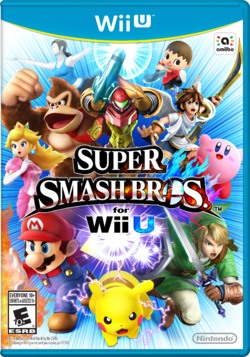 Wii U North American box art For alternate box art, see the game's gallery. | |||||||||||||||
| Developer | Sora Ltd. Bandai Namco Games | ||||||||||||||
| Publisher | Nintendo | ||||||||||||||
| Platform(s) | Wii U | ||||||||||||||
| Release date | |||||||||||||||
| Language(s) | English (United Kingdom) English (United States) French (France) French (Canada) German Spanish (Spain) Spanish (Latin America) Italian Dutch Portuguese (Portugal) Russian Japanese | ||||||||||||||
| Genre | Fighting | ||||||||||||||
| Rating(s) |
| ||||||||||||||
| Mode(s) | Single-player, Multiplayer | ||||||||||||||
| Format | Wii U: | ||||||||||||||
| Input | Wii U: | ||||||||||||||
| Serial code(s) | |||||||||||||||
Super Smash Bros. for Wii U is the Wii U version of the fourth installment of the Super Smash Bros. series and was developed by Sora Ltd. and Bandai Namco Games.[3] While this game and Super Smash Bros. for Nintendo 3DS were developed simultaneously, the Nintendo 3DS version launched earlier due to its earlier completion of development.
Like with most other Nintendo 3DS and Wii U software titles, this title can be purchased at retail stores and could be purchased from the Nintendo eShop until March 27, 2023, with the digital version requiring 15,700 MB (about 15.3 GB) of memory to be installed. Due to the amount of space that it requires, standard set Wii U consoles cannot download this title without an external storage device, but deluxe set Wii U consoles can.
The game could be played online via Nintendo Network, but the service was terminated on April 8, 2024, making the game no longer playable online.[4][5]
A follow-up title for the Nintendo Switch, Super Smash Bros. Ultimate, was released four years after Super Smash Bros. for Wii U on December 7, 2018.
Gameplay[edit]
Super Smash Bros. for Nintendo 3DS and Super Smash Bros. for Wii U have some similarities and differences from Super Smash Bros. Brawl, as well as differences between the two versions. Final Smashes and Footstool Jumping make a return, while the "tripping" mechanic has been removed.[6] The pace of battles has also been stated to be in between Super Smash Bros. Melee and Super Smash Bros. Brawl.
Both games have the same roster of playable characters in order to keep them consistent. The movesets and animations of some returning characters were changed more significantly than during the transition from Super Smash Bros. Melee to Super Smash Bros. Brawl, with many returning characters having completely new moves, and major alterations (such as Pit). Aesthetically, the games are much more stylized and visually intense than the previous entries, with the overall colors being bolder and brighter and many elements having been redone to stand out more, and the characters also appear more similar to their current appearances from their franchises of origin, lacking realistic details in them.
The Wii U version does not make much use of the GamePad's touch screen during gameplay. However, in addition to Off-TV Play, the Wii U GamePad can display in-battle stats, such as damage percentages.[7] Like in all games, Smash has its traditional fighting game mode with its customized rules where four chosen fighters play on chosen stages. This includes the Stamina mode (where players get HP that decreases), Time (time limit), Stock (lives) and Coin Battle (winner is the one that collects the most coins). Special Smash also returns in this version, allowing players to battle under certain conditions.[7]
Customization/cross-connectivity[edit]
- Main article: Equipment
Players can send customized fighters from one version to the other. Players can customize fighter's special attacks with one of three variations for each. The Mii Fighters and Palutena, however, have custom special attacks that are not variants of the original attacks; these are unlocked from the beginning. Players can also equip items to fighters to increase specific attributes (attack, defense, or speed) while sacrificing others. Up to three items can be equipped at a time, and some items provide additional side effects to the fighter.[8]
Custom characters cannot be used in "With Anyone" online. Additionally, by connecting the two games the player can use their Nintendo 3DS as a controller for the Wii U version;[9] alternatively, players were able to purchase the "Smash Controller" application that was released on June 14, 2015 from the Nintendo 3DS eShop to use their system as a controller.[10] The "Smash Controller" application requires 314 blocks (40.1 MB) to be installed.
Exclusive modes[edit]
8-Player Smash[edit]
- SmashWiki article: 8-Player Smash
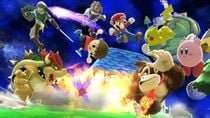
A new game mode known as 8-Player Smash is also available. As opposed to the traditional four player battles Super Smash Bros. is known for, up to eight players can join a single battle. An option of four teams is allowed, with the yellow team serving as a new team color choice. In this special game mode, most stages are restricted when five or six players are playing and even more when seven or eight are playing; in stages that are playable in 8-Player Smash, stage hazards such as bosses and other features are removed for optimization purposes, though stage incompatibility has shown to be mostly arbitrary, with even some incompatible stages featuring 8-Player spawn points.[11] Omega variants of the same stage may allow for more players. Players additionally cannot play coin battles in 8-Player Smash.
Smash Tour[edit]
- SmashWiki article: Smash Tour
Smash Tour is a new mode serving as the exclusive mode for the Wii U version. Smash Tour is a board game mode in which players (as Miis) travel around a board by spinning a wheel, collecting fighters and power-ups for their fighters scattered around the board. Players start with two fighters by default. If two players cross paths, then all players are pitted into a Smash battle for a reward, and the winner obtains a fighter from one of the other players. Players may also obtain items that can be used to trigger various effects, and random events may also occur on the board. Checkpoints are also scattered around the board which boost players' stats when they pass over them. The number of turns can be set between 15 and 25, and after all the turns have ended, players fight in a Stock match using their stat boosts, their stock based on the fighters they collected. The player can choose between a small, normal-sized, and big board to play on.[7]
Special Orders[edit]
- SmashWiki article: Special Orders
In Special Orders, the player has the choice of playing either "Master Orders" or "Crazy Orders", referring to Master Hand and Crazy Hand. In their respective modes, Master Hand and Crazy Hand construct challenges for the player. Players purchase tickets in order to face challenges. In Master Orders, players purchase tickets in order to try one of three challenges, the reward depending on the difficulty; each ticket is used separately, and each challenge may only be tried once. Playing Crazy Orders requires the player to either use a pass or pay 5,000 gold; the player can then play any number of challenges to rack up rewards within a set time limit before facing Crazy Hand in a final battle. If the player loses at any point they lose some of their rewards.[7]
Events[edit]
Events return from the previous two installments, in which players take on a series of themed battles. Events are arranged in a grid, however, and the path forward reveals itself when the player completes a given event. Players can also receive various rewards such as trophies, gold, and Special Orders passes by completing challenges. Like in Super Smash Bros. Brawl, two player Events are also available.[7]
Masterpieces[edit]
- SmashWiki article: Masterpieces
Masterpieces from Super Smash Bros. Brawl returns as a feature in the Vault. It offers short demos of past Nintendo games that can be played for a certain amount of time. The game can redirect the player to the Nintendo eShop where they may purchase the Virtual Console version of the game, if it is available on the service.
The following is a list of the Masterpieces:
| Game | Time | Menu Artwork | Description |
|---|---|---|---|
| Super Mario Bros. (NES) | 3:00 | Mario | The game begins at the title screen rather than World 1-1 like in Super Smash Bros. Brawl. |
| Super Mario Bros.: The Lost Levels (NES) | 3:00 | Mario | The game begins at the title screen, where the player can choose to play as Mario or Luigi. |
| Wrecking Crew (NES) | 2:00 | Mario | The game begins at the title screen. |
| Kirby's Dream Land (Game Boy) | 3:00 | Kirby | The game begins at the title screen. |
| Kirby's Adventure (NES) | 3:00 | Kirby | The game begins at the title screen and allows the player to choose from three save files: Two from the beginning of the game, and one before the final battle. The Masterpiece is unlocked by clearing Solo Classic as Kirby on intensity 5.5 or higher. |
| Kirby Super Star (SNES) | 3:00 | Kirby | The game begins in the Great Cave Offensive. |
| The Legend of Zelda (NES) | 4:00 | Link | Like the Masterpiece in Super Smash Bros. Brawl, the player immediately starts from the beginning of the game. |
| Zelda II: The Adventure of Link (NES) | 4:00 | Link | The player immediately starts from the beginning of the game. |
| Fire Emblem: Shadow Dragon and the Blade of Light (NES) (Japan only) | Marth | ||
| Super Mario World (SNES) | 3:00 | Mario | The game starts on the world map in front of Yoshi's House, where the player can choose to start from Yoshi's Island 1 or Yoshi's Island 2. |
| Super Mario Kart (SNES) | 3:00 | Mario | The player starts in Mario Circuit 1 of the Mushroom Cup, racing as Mario. |
| Dr. Mario (Game Boy) | 3:00 | Dr. Mario | The game starts at the settings menu after the title screen. It is unlocked by clearing 10-Man Smash without taking damage as Dr. Mario. |
| Yoshi (NES) | 3:00 | Yoshi | The game begins at the title screen. It is unlocked by clearing Solo Classic as Yoshi on any intensity. |
| Mega Man 2 (NES) | 3:00 | Mega Man | Despite the menu icon depicting a screenshot of Air Man's stage, the game begins from the cutscene leading to the first stage of Wily Castle. The player has two Energy Tanks as well as every upgrade and Robot Master's weapon. |
| F-Zero (SNES) | 3:00 | Captain Falcon | The player starts in Mute City, racing as the Blue Falcon. |
| Pilotwings (SNES) | 2:00 | Light Plane | The game starts in the Light Plane training level. |
| Pac-Man (NES) | 2:00 | Pac-Man | The game begins at the title screen. |
| Balloon Fight (NES) | 2:00 | Villager (Balloon Trip) | The game begins at the title screen, where the player is given the choice to play the main game or Balloon Trip mode. |
| Donkey Kong (NES) | 2:00 | Donkey Kong | The player starts at 75m, the second level of the NES port of the game. |
| Punch-Out!! (NES) | 3:00 | Little Mac | The game begins at the title screen. The player can choose to start from the beginning or input a password to fight an opponent encountered later in the game. The Masterpiece is unlocked by clearing the Event "No Mere Sparring Match" ("Intensive Sparring" in PAL versions) on Normal or Hard difficulty. |
| Metroid (NES) | 3:00 | Samus | The player starts directly from the beginning of the game, where Samus first arrives on Brinstar. |
| Super Metroid (SNES) | 4:00 | Samus | The Masterpiece is exactly the same as the one in Super Smash Bros. Brawl, with two save files to choose from: One at the beginning of the game, and one in Norfair. |
| Kid Icarus (NES) | 3:00 | Pit | The player starts in the first level, the Underworld. |
| EarthBound (SNES) | 5:00 | Ness | The game starts at the opening cutscene. It is unlocked by hitting Sandbag at least 1968 ft./600 m. in Home-Run Contest. |
Classic[edit]
- SmashWiki article: Classic Mode (SSB4-Wii U)
The Wii U version's Classic Mode operates in a different manner from that of the 3DS version. It still maintains the intensity system in the 3DS version; players can spend gold to increase the intensity level, and if the player gets a Game Over, some of their rewards will be lost, and the intensity will lower by .5, unless the intensity level is set at 2.0. Classic Mode can be played with two players together.
Instead of paths, the player has to choose which group of fighters that they want to fight. As many as seven opponents may be fought in a single stage. One of the opponents includes the rival, which is programmed to be harder than the other opponents. The longer the rival stays alive, the stronger it becomes. On some occasions, an intruder may pop up for one match; the intruder will either be giant-sized or metallic. Some opponents may even possess rewards, which can either be gold, trophies, custom parts, or a Crazy Orders Pass.
When the player KOs any opponents, their trophies will be displayed in the "Fighters Defeated" box. The defeated opponents can later be used as allies for any team battle matches. In team battles, opponents that the player's allies KO will also be added to the "Fighters Defeated" box.
There are a total of seven stages, with the first three stages consisting of battles against default opponents and the rival. For stages 4 and 5, the player will face an additional group of opponents, but they will use their alternate color schemes; these opponents may also come equipped with their custom special moves. Stage 6 pits the player against the Fighting Mii Team, where they must KO twenty Fighting Miis. Stage 7 pits the player against Master Hand, but higher intensities will add Crazy Hand, and even Master Core to the mix. Unlike in the 3DS version, the player does not have the option to avoid fighting Crazy Hand on intensity levels 3.0 and higher. Upon completing the mode, the player earns a trophy of their current character.
| Level | Intensity | Wager | Final Battle |
|---|---|---|---|
| Effortless | 0.0 to 0.9 | 55 to 100 | Master Hand |
| Easy | 1.0 to 1.9 | 5 to 50 | Master Hand |
| Standard | 2.0 to 2.9 | 0 to 72 | Master Hand |
| Tougher | 3.0 to 3.9 | 80 to 188 | Master Hand and Crazy Hand |
| Challenging | 4.0 to 4.9 | 200 to 335 | Master Hand and Crazy Hand |
| Heatin' Up | 5.0 to 5.9 | 350 to 530 | Master Hand, Crazy Hand, and Master Core (5.1 or higher) (Master Edges, Master Shadow) |
| Extra Spicy | 6.0 to 6.9 | 550 to 775 | Master Hand, Crazy Hand, and Master Core (Master Beast, Master Edges, Master Shadow) |
| Infernal | 7.0 to 7.9 | 800 to 1205 | Master Hand, Crazy Hand, and Master Core (Master Giant, Master Beast, Master Edges, Master Shadow) |
| White Hot | 8.0 to 8.9 | 1250 to 2105 | Master Hand, Crazy Hand, and Master Core (Master Giant, Master Beast, Master Edges, Master Shadow, Master Fortress (Solo only)) |
| Nothing Harder! | 9.0 | 2200 | Master Hand, Crazy Hand, and Master Core (Master Giant, Master Beast, Master Edges, Master Shadow, Master Fortress (Solo only)) |
All-Star[edit]
- SmashWiki article: All-Star Mode
Unlike Classic, All-Star is almost the same as in the Nintendo 3DS version. Some differences include a larger rest area, and the characters appear in reverse chronological order; at the beginning, players face the newest characters and finish with the oldest fighters in the game. All-Star Mode can be played with two players together.
Like in Super Smash Bros. Brawl's Boss Battles Mode, the player receives a Game Over with no continues if they lose their one stock or run out of time, which then leads to the results display screen showing the gold, Global Smash Power, score, trophies, Crazy Orders Passes, and custom parts that the player earned so far.
Upon completing the mode, the player earns a Final Smash trophy of their current character.
* - Only available in the full All-Star mode. ** - Downloadable content. Only available in this mode after downloading, but it will be removed if the player deletes the game's DLC data. Inclusion does not affect any of the game's challenges.
Stadium[edit]
- SmashWiki article: Stadium
Just like in the Nintendo 3DS version, three stadium games are playable. Home-Run Contest follows the same rules as in the previous installment but with an option to compete with four players. Target Blast now has three stages to play with instead of one, up to four players can participate, and the bomb is bigger in the second round, resulting a bigger explosion when that happens. Multi-Man Smash remains the same as in the Nintendo 3DS version. Multi-Man Smash can be played with up to four players.
Vault[edit]
- SmashWiki article: Vault
Similar to the Nintendo 3DS version, the Vault allows players to view and buy Trophies and view records, tips, and replays as well as listen to the sound effects and music. In this version, however, players can also view the games' promotional trailers, ending movies for the fighters, as well as play Masterpieces.
Trophies[edit]
- Main article: List of trophies in Super Smash Bros. for Wii U
There are a total of 743 trophies in the Wii U version. In the Trophies menu, players have the option to buy Trophies from the Trophy Shop like in the Nintendo 3DS version. Trophy Rush is also available, though in this version up to two players can play. Like in Super Smash Bros. Brawl, Photo Studio allows the player to pose and resize their Trophies on various backgrounds and take pictures of them. Another new mode known as Trophy Box allows the player to fill boxes with trophies based on given criteria, such as game series (Paper Mario, New Super Mario Bros.) or specific games (Super Mario Galaxy, Super Mario Galaxy 2).[7]
Online Play[edit]
This game features online play similar to Super Smash Bros. Brawl in that players from all over the world can face others in matches. When playing With Friends, players can customize the rules to their liking. Voice chat is also available when playing With Friends, though like Mario Kart 8 it can only be used between battles.[7] When playing With Anyone, two basic options are available: For Fun and For Glory. In For Fun mode, players battle on randomly-selected normal stages, excluding Final Destination, with all items turned on. Losses are not recorded in this mode. In For Glory mode, players only play on the flat, Final Destination versions of stages, without items. Players can either play standard Smash or Team Smash matches in both modes, and For Glory offers a 1-on-1 mode as well.
Conquest pits some of the game's various characters against each other, and players who win battles with them in With Anyone mode will add points to that character's score. After a few days, the winning fighter is revealed, players who took part in the conquest by playing as that character get rewarded with gold, and the next conquest begins.
Spectate mode allows players to view matches and bet gold on their outcome, view replays of past online matches, and view a map showing the players currently online.
Rather than an online leaderboard, the game makes use of a different type of ranking system, called "Global Smash Power". A player's GSP score is recorded for each of the various single-player modes, the number indicating how many players around the world they outrank.
Playable characters[edit]
Including DLC characters, this installment features a total of 58 playable characters. These consist of 37 veterans and 21 newcomers. Certain characters from the previous Super Smash Bros. games have been removed from the rosters of both the Nintendo 3DS and Wii U versions in order to keep them consistent, partly due to limitations with the Nintendo 3DS version. Unlike the previous games in the series, with the removal of in-game transformations, Sheik, Zero Suit Samus, and Charizard are now standalone characters. Of the playable character roster, if excluding Mii Fighters and Roy, eleven originate from the Super Mario franchise and its spin-off series (eighteen if counting each of the Koopalings), with Mario, Luigi, Peach, Bowser, Rosalina & Luma, Dr. Mario, Bowser Jr., Donkey Kong, Diddy Kong, Yoshi, and Wario being playable.
Mewtwo returns from Super Smash Bros. Melee as a downloadable, 50th character, releasing for free to Club Nintendo members who signed up for a promotion involving the purchase of both the Nintendo 3DS and Wii U versions of the game.[12] It was released as a paid download later on for those who did not register both versions.[13] In addition, two more characters return from the previous installments as downloadable characters, namely Roy from Super Smash Bros. Melee and Lucas from Super Smash Bros. Brawl. Four more newcomers made their debut as playable characters: Ryu from the Street Fighter series, Cloud Strife from Final Fantasy VII, Corrin from Fire Emblem Fates, and Bayonetta from the Bayonetta series. DLC characters do not have any custom special moves or any unique Palutena's Guidance conversations.
With the discontinuation of digital purchases for Wii U in March 2023, it is no longer possible to buy the downloadable characters, though they can still be downloaded by those who purchased them when they were available.
NOTE: Characters in italics are newcomers.
Default characters[edit] | ||||
|---|---|---|---|---|
| Character | Trophy description | Special Attacks | Final Smash | |
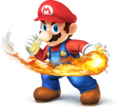 Mario |
As iconic as iconic gets, this gaming celebrity is known for saving the world from Bowser. He's got amazing jumping skills and makes use of a wide range of transformations. In his free time, he plays too many sports to count. In Smash Bros., he's a well-rounded fighter you can rely on. Say it with me: "It’s-a me, Mario!" | Standard - Fireball Side - Cape Up - Super Jump Punch Down - F.L.U.D.D. |
Mario Finale | |
 Luigi |
Luigi recently celebrated his 30th anniversary with the Year of Luigi, but all that attention just made him even more shy and awkward. In Smash Bros., Luigi takes a lot of cues from his brother in fighting style, adding flair to moves like Super Jump Punch. His taunts, however, are truly unique. | Standard - Fireball Side - Green Missile Up - Super Jump Punch Down - Luigi Cyclone |
Poltergust 5000 | |
 Peach |
Princess of the Mushroom Kingdom, Peach continues to prove that "powerful" and "cute" are not mutually exclusive. In Smash Bros., Peach uses her dress to float above the fray, suddenly descending and attacking with numerous weapons. A frying pan? Umbrella? TOAD?! Where does she keep it all? | Standard - Toad Side - Peach Bomber Up - Peach Parasol Down - Vegetable |
Peach Blossom | |
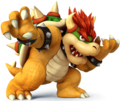 Bowser |
The archenemy of Mario and the reason Peach spends more time kidnapped than in her own castle. His plans aren't always the best, and occasionally he even finds himself on Mario's side. In Smash Bros., he's a serious heavyweight who laughs off weaker attacks. Hit him hard to send him flying! | Standard - Fire Breath Side - Flying Slam Up - Whirling Fortress Down - Bowser Bomb |
Giga Bowser | |
 Yoshi |
As dependable a partner as one could hope for, Yoshi often aids Mario in his adventures. Yoshi can swallow just about anything and make an egg of it instantly. He's got some serious airborne power, making launching opponents skyward and then following up with more attacks a wise choice. | Standard - Egg Lay Side - Egg Roll Up - Egg Throw Down - Yoshi Bomb |
Super Dragon | |
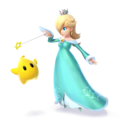 Rosalina & Luma |
The mysterious Rosalina lives in the Comet Observatory with the Lumas. She first traveled with them in search of their mother. In Smash Bros., Rosalina and Luma can fight in different places at the same time. If you can trap someone between Rosalina and Luma, you'll be able to unleash incredible damage! | Standard - Luma Shot Side - Star Bits Up - Launch Star Down - Gravitational Pull |
Power Star | |
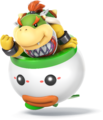 Bowser Jr. Alternate characters: The seven Koopalings |
Bowser's beloved, spoiled son sports a bandanna with a large mouth drawn on it. Like his father, Bowser Jr. longs to take Mario down. In Smash Bros., he'll fight from inside his heavily armed Junior Clown Car. The Clown Car takes less damage than Bowser Jr., so mind your positioning. | Standard - Clown Cannon Side - Clown Kart Dash Up - Abandon Ship Down - Mechakoopa |
Shadow Mario Paint | |
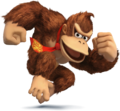 Donkey Kong |
This king of the jungle really, really loves bananas. His adventures usually start with people stealing his hoard of them. In Smash Bros., he's known for his incredible strength and long reach. Despite his size, he's still pretty quick. He can even jump carrying heavy items! Use this knowledge well. | Standard - Giant Punch Side - Headbutt Up - Spinning Kong Down - Hand Slap |
Konga Beat | |
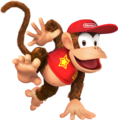 Diddy Kong |
Donkey Kong's trusty partner. He sports his signature look: red hat, red shirt, Rocketbarrel Pack. In Smash Bros., he's incredibly agile. Charge the Rocketbarrel Pack by holding down the button before launch, and you can steer with left and right. Don't forget to drop banana peels--enemies love it! | Standard - Peanut Popgun Side - Monkey Flip Up - Rocketbarrel Boost Down - Banana Peel |
Rocketbarrel Barrage | |
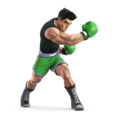 Little Mac |
This little boxer from the Punch-Out!! series makes up in heart what he lacks in height. He wasn't afraid to take on the boxing champs, and he's not afraid of the Nintendo stars. In Smash Bros., he packs a serious punch. When his KO Meter fills up, wade in and trigger a devastating uppercut. | Standard - Straight Lunge Side - Jolt Haymaker Up - Rising Uppercut Down - Slip Counter |
Giga Mac | |
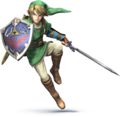 Link |
Green clothes? Pointy hat? Yep, it's Link, all right! In this game, his sword and shield make for effective attacking and blocking, and his bow, bombs and boomerang will spice up any battle. He's even brought his Clawshot for grabbing enemies and edges. Jeez, just how much stuff can Link carry? | Standard - Hero's Bow Side - Gale Boomerang Up - Spin Attack Down - Bomb |
Triforce Slash | |
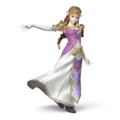 Zelda |
This is the namesake of the Legend of Zelda games. Her appearance may change, but she always plays an important role. In Smash Bros., she's quick on the draw when it comes to magic, though a bit slow when moving. She has a new move that summons a Phantom to her aid. | Standard - Nayru's Love Side - Din's Fire Up - Farore's Wind Down - Phantom Slash |
Light Arrow | |
 Sheik |
In The Legend of Zelda: Ocarina of Time, Sheik claimed to be a surviving Sheikah. However, this was just a cunning disguise for Princess Zelda so that she could escape Ganondorf. In Smash Bros., she's the complete opposite of Zelda, striking with fast attacks that can keep an opponent off balance. | Standard - Needle Storm Side - Burst Grenade Up - Vanish Down - Bouncing Fish |
Light Arrow | |
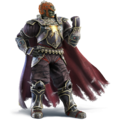 Ganondorf |
The King of Evil that awaits Link at the end of most of his adventures. Ganondorf possesses the Triforce of Power. In Smash Bros., he makes up for his low speed with devastating power. The strength of his blows can knock back most opponents. Get close with a dash attack and pummel your foes! | Standard - Warlock Punch Side - Flame Choke Up - Dark Dive Down - Wizard's Foot |
Beast Ganon | |
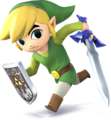 Toon Link |
This cartoonish version of Link is how he appeared in The Legend of Zelda: The Wind Waker and a few other titles. In Smash Bros., he uses moves much like his older, taller counterpart. His small size gives him extra speed, though, so take advantage of that to send your foes flying. | Standard - Hero's Bow Side - Boomerang Up - Spin Attack Down - Bomb |
Triforce Slash | |
 Samus |
Samus Aran has fought her way across a variety of planets in the Metroid series. She wears a Power Suit designed by the Chozo, giving her incredible versatility in a fight. She can wade in, but she favors beams and missiles. A fully charged Charge Shot packs a serious punch! | Standard - Charge Shot Side - Missile Up - Screw Attack Down - Bomb |
Zero Laser | |
 Zero Suit Samus |
Samus is far from helpless when her Power Suit is deactivated. Sure, she loses a lot of the moves and weapons she had access to before, but her Jet Boots pick up the slack! She also has the Paralyzer, a versatile weapon that can shock her rivals or change into a Plasma Whip to grab edges and enemies. | Standard - Paralyzer Side - Plasma Whip Up - Boost Kick Down - Flip Jump |
Gunship | |
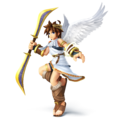 Pit |
Pit is the captain of Palutena's royal guard. Despite the wings on his back, Pit needs the Power of Flight from Palutena in order to truly fly. In Smash Bros., he can still get more air than most, with four jumps and a special move that boosts him higher. He has a new reflect move-it protects both sides! | Standard - Palutena Bow Side - Upperdash Arm Up - Power of Flight Down - Guardian Orbitars |
Three Sacred Treasures | |
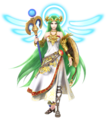 Palutena |
In Kid Icarus: Uprising, the goddess of light uses telepathy to communicate and grants miracles to support Pit on his adventure. In Smash Bros., she has special moves like Warp and Heavenly Light at her disposal. She's very adaptable-you can customize her into a long- or close-range fighter! | Standard - Autoreticle / Explosive Flame / Heavenly Light Side - Reflect Barrier / Angelic Missile / Super Speed Up - Warp / Jump Glide / Rocket Jump Down - Counter / Lightweight / Celestial Firework |
Black Hole Laser | |
 Marth |
The first hero from the Fire Emblem series, Marth is the prince of Altea and descendant of the hero Anri. In Smash Bros, he's known as an exceptional swordfighter, swinging his blade with grace. Striking with the tip will maximize the damage dealt. Teach aggressive foes a lesson with his strong Counter move. | Standard - Shield Breaker Side - Dancing Blade Up - Dolphin Slash Down - Counter |
Critical Hit | |
 Ike |
One of the main characters of the Fire Emblem series. Having fought in the Mad King's War, restored the fallen nation of Crimea and taken on the Begnion Empire, Ike is rightly called a hero. He has the strength to back the title-one good swing of his blade can launch the heaviest of foes. | Standard - Eruption Side - Quick Draw Up - Aether Down - Counter |
Great Aether | |
 Robin Male/female variants |
This is the male Robin, an avatar in Fire Emblem Awakening. The goal of that game doesn't change much because of your gender choice, but Robin's hairstyle options do. In Smash Bros., Robin brings powerful magic and swordplay to bear. He can exhaust his moves, but they'll be restored over time. | Standard - Thunder Side - Arcfire Up - Elwind Down - Nosferatu |
Pair Up | |
 Kirby |
Round little Kirby lives on the peaceful Planet Popstar, in Dream Land. He can inhale things with his big mouth, either copying their abilities or spitting them out again. In Smash Bros., Kirby can inhale opponents and copy their standard specials. He gets launched easily but recovers well. | Standard - Inhale Side - Hammer Flip Up - Final Cutter Down - Stone |
Ultra Sword | |
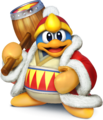 King Dedede |
He calls himself the King of Dream Land, but he doesn't have a lot of interest in ruling. He really loves to eat, so it's no surprise he's a heavyweight fighter. Despite his size and low speed, he can easily recover with his four jumps. His Jet Hammer will leave a mark on everyone he meets. | Standard - Inhale Side - Gordo Throw Up - Super Dedede Jump Down - Jet Hammer |
Dedede Burst | |
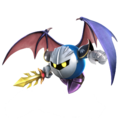 Meta Knight |
Kirby's mysterious rival, this masked swordsman appears in several Kirby games. His cape transforms into wings to grant him flight. In Smash Bros., his quick sword skills and aerial agility set him apart. He can jump up to five times in a row and he has a special move to soar higher. | Standard - Mach Tornado Side - Drill Rush Up - Shuttle Loop Down - Dimensional Cape |
Galaxia Darkness | |
 Fox |
Fox is the leader of the mercenary unit Star Fox, often enlisted to defeat the evil Andross. His piloting skills are top notch, but in Smash Bros. he brings speed and fast attacks to the battle. His Reflector move allows him to turn projectile attacks against his foes, increasing their power for a punishing blow. | Standard - Blaster Side - Fox Illusion Up - Fire Fox Down - Reflector |
Landmaster | |
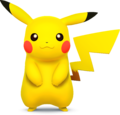 Pikachu |
Recognized the world over, Pikachu is an Electric-type Pokémon that stores energy in its cheeks for use in battle. In Smash Bros., Pikachu is a well-rounded fighter with speedy, powerful electric attacks. Quick Attack can be used twice in a row if two directions are input, one after another. | Standard - Thunder Jolt Side - Skull Bash Up - Quick Attack Down - Thunder |
Volt Tackle | |
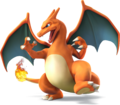 Charizard |
The iconic Fire/Flying-type Pokémon. Charizard's scorching breath can melt anything in its path. It soars through the air, seeking only worthy foes to test itself against. In Smash Bros., Charizard unleashes the destructive Flare Blitz special move-a move so strong, it even injures the user! | Standard - Flamethrower Side - Flare Blitz Up - Fly Down - Rock Smash |
Mega Evolution | |
 Lucario |
A Fighting/Steel-type Pokémon that excels in combat through the reading and manipulation of Aura. As Lucario takes more damage, its attacks grow in strength. At maximum power, Lucario deals triple damage and its Aura Sphere is particularly devastating! Foes won't even know what hit them! | Standard - Aura Sphere Side - Force Palm Up - Extreme Speed Down - Double Team |
Mega Evolution | |
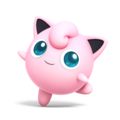 Jigglypuff |
This Normal/Fairy-type Pokémon is best known for its soothing singing, which can put foes to sleep. In Smash Bros., it fights best in the air and can even jump six times in a row. The downside, though, is that Jigglypuff's so light, most opponents could launch it in their sleep! | Standard - Rollout Side - Pound Up - Sing Down - Rest |
Puff Up | |
 Greninja |
This Water/Dark-type Pokémon is the fully evolved form of Froakie. It's just as fast and dangerous as any other ninja, and the throwing stars it can make out of water can shear metal. In Smash Bros., as well as being a graceful, speedy fighter, it can also use moves like Hydro Pump to let it move through the air and avoid falling. | Standard - Water Shuriken Side - Shadow Sneak Up - Hydro Pump Down - Substitute |
Secret Ninja Attack | |
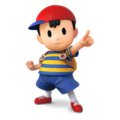 Ness |
Hailing from Onett, a small town in Eagleland, this young boy's ordinary looks hide his psychic powers. Ness fought against the evil Giygas in EarthBound, and in Smash Bros. he unleashes some of the same PSI moves. Watch out for PK Thunder, a guided attack that can also launch Ness like a rocket! | Standard - PK Flash Side - PK Fire Up - PK Thunder Down - PSI Magnet |
PK Starstorm | |
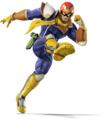 Captain Falcon |
In the F-Zero racing scene, Captain Falcon uses his Blue Falcon to win big. His origins largely a mystery, he's made his way to the Smash Bros. battlefield to prove his worth outside the cockpit. He's got speed and power, and his distinct Falcon Punch leaves a dent. Start it in the air to surprise your foes! | Standard - Falcon Punch Side - Raptor Boost Up - Falcon Dive Down - Falcon Kick |
Blue Falcon | |
 Villager Male/female variants |
An energetic young man from a peaceful town in Animal Crossing, he is eager to make his Smash Bros. debut! His Balloon Trip recovery lets him fly like a character from Balloon Fight. The Villager sets out to answer that age-old question: If a tree falls on the battlefield and foes are beneath it, do they get launched? | Standard - Pocket Side - Lloid Rocket Up - Balloon Trip Down - Timber |
Dream Home | |
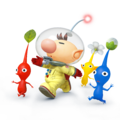 Olimar Alternate character: Alph |
A veteran spaceship pilot for Hocotate Freight, Captain Olimar partners with Pikmin in Smash Bros. to help him in battle. Olimar is much stronger when he's got Pikmin with him, so keep them plucked and good to go. Pikmin abilities are based on their color-learn where each is best at! | Standard - Pikmin Pluck Side - Pikmin Throw Up - Winged Pikmin Down - Pikmin Order |
End of Day | |
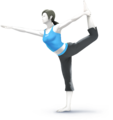 Wii Fit Trainer Male/female variants |
The female trainer who helps you in the Wii Fit series. She favors a fighting style composed of yoga poses. This makes her a capable close-quarters fighter, but she has ranged attacks as well. She also has a move called Deep Breathing, which can heal you and increase attack power if timed right. | Standard - Sun Salutation Side - Header Up - Super Hoop Down - Deep Breathing |
Wii Fit | |
 Shulk |
In Xenoblade Chronicles, this young lad's colony is attacked by the Mechon, so he and his friends set off to take them down. In Smash Bros., his Monado Arts let him change his specialization during battle. You can choose to boost a stat-his jump or attack, for example-but other stats might drop as a result, so choose wisely. | Standard - Monado Arts Side - Back Slash Up - Air Slash Down - Vision |
Chain Attack | |
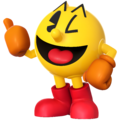 Pac-Man |
The yellow, circular hero of the game PAC-MAN, which is recognized as the "Most Successful Coin-Operated Arcade Game" by Guinness World Records. In Smash Bros., he uses several moves inspired by the original PAC-MAN. Wakawaka your foes by charging up the Power Pellet move and aiming at them. | Standard - Bonus Fruit Side - Power Pellet Up - Pac-Jump Down - Fire Hydrant |
Super Pac-Man | |
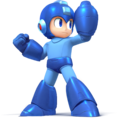 Mega Man |
The main hero from Capcom's 1987 action game, Mega Man. He travels from stage to stage, defeating Robot Masters to obtain new weapons. He uses this vast arsenal in Smash Bros. in a variety of ways. Metal Blades, for example, can be fired in eight directions and picked up off the ground! | Standard - Metal Blade Side - Crash Bomber Up - Rush Coil Down - Leaf Shield |
Mega Legends | |
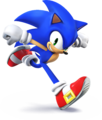 Sonic |
The main star of the Sonic the Hedgehog series. He's an easygoing hedgehog who blows past the competition with his speed. Seriously, on the ground he's faster than anyone else in Smash Bros. Use this to your advantage, avoiding blows while landing lightning-fast attacks. | Standard - Homing Attack Side - Spin Dash Up - Spring Jump Down - Spin Charge |
Super Sonic | |
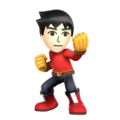 Mii Brawler |
This fighter is based on a player's Mii. It excels at fighting with punches and kicks. This type of Mii is very agile, blending attacks with movement to get the battle flowing. It has superior dash and jump compared to other types. Stay close and keep whaling on foes-you'll KO them in no time! | Standard - Shot Put / Ultimate Uppercut / Exploding Side Kick Side - Onslaught / Burning Drop Kick / Headache Maker Up - Soaring Axe Kick / Helicopter Kick / Piston Punch Down - Head-On Assault / Feint Jump / Foot Flurry |
Omega Blitz | |
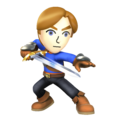 Mii Swordfighter |
This fighter is based on a player's Mii and favors a sword in battle. Enjoy the extra reach the sword offers, but remember that it takes a bit longer for strikes to reach your opponent as a result. Customize your Mii with chargeable moves, counters, or projectile attacks. | Standard - Gale Strike / Shuriken of Light / Blurring Blade Side - Airborne Assault / Slash Launcher / Chakram Up - Stone Scabbard / Skyward Slash Dash / Hero's Spin Down - Blade Counter / Reversal Slash / Power Thrust |
Final Edge | |
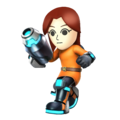 Mii Gunner |
A Mii sporting a blaster arm, this fighter is a great choice for those who prefer to fight the battle from a distance. The Mii Gunner has a lot of special projectile moves available, so pick your favorites and use them when needed. Don't forget about standard and smash attacks! | Standard - Charge Blast / Laser Blaze / Grenade Launch Side - Flame Pillar / Stealth Burst / Gunner Missile Up - Lunar Launch / Cannon Uppercut / Arm Rocket Down - Echo Reflector / Bomb Drop / Absorbing Vortex |
Full Blast | |
Unlockable characters[edit] | ||||
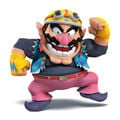 Wario |
A living embodiment of gross, this villian hates Mario and loves money. He claims to have known Mario since childhood, but who can tell if that's true? In Smash Bros., he's a seriously agile heavyweight fighter. He can store up his trademark Wario Waft for explosive results. Did I mention he's gross? | Standard - Chomp Side - Wario Bike Up - Corkscrew Down - Wario Waft |
Wario-Man | |
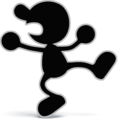 Mr. Game & Watch |
Game & Watch was first released in 1980, making the series the father of the Game Boy and Nintendo DS. Or maybe an older sibling? Anyway...in Smash Bros., Mr. Game & Watch uses distinct retro moves to damage his foes. However, he's only two dimensional, so he's pretty easy to send flying. | Standard - Chef Side - Judge Up - Fire Down - Oil Panic |
Octopus | |
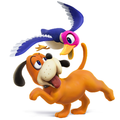 Duck Hunt Duck Hunt Duo in European languages |
You could call these two the stars of the NES 1985 launch title Duck Hunt. The goofy dog would chase down any ducks hit by the NES Zapper. In Smash Bros., these two work as a team to fight. When a can or a clay pigeon is in play, hit the button again to fire at it. Show your foes how the ducks felt! | Standard - Trick Shot Side - Clay Shooting Up - Duck Jump Down - Wild Gunman |
NES Zapper Posse | |
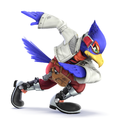 Falco |
A talented pilot and part of the Star Fox team, Falco can be a bit rough around the edges. He once led his own galactic gang before joining up with Fox. In Smash Bros. his ability to jump high and deal damage in the air makes him a powerful threat and his thrown Reflector can catch foes by surprise. | Standard - Blaster Side - Falco Phantasm Up - Fire Bird Down - Reflector |
Landmaster | |
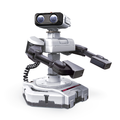 R.O.B. |
This NES accessory was released in 1985, a groundbreaking system that controlled the robot via a game on the screen. In Smash Bros., R.O.B. has two projectile weapons and can use his rocket base to fly through the air. If you let his Robo Beam charge over time, it'll make a powerful blast. | Standard - Robo Beam Side - Arm Rotor Up - Robo Burner Down - Gyro |
Super Diffusion Beam | |
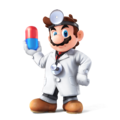 Dr. Mario |
In the 1990 puzzle game Dr. Mario, Mario threw on a white coat and decided to take a shot at that whole "medicine" thing. In this game, he's a balanced fighter who can throw Megavitamin capsules and nimbly deflect blows with his Super Sheet. He's not quite as quick as normal Mario, but his attacks deal a bit more damage. | Standard - Megavitamin Side - Super Sheet Up - Super Jump Punch Down - Dr. Tornado |
Doctor Finale | |
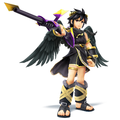 Dark Pit |
Pit's mysterious, black-clad doppelgänger, Dark Pit. (Some call him Pittoo, but he really doesn't like that.) When he first appears, he immediately goes after both Pit and the Underworld Army. In Smash Bros., he uses moves a lot like Pit's, though both his bow and his Sacred Treasures are different. | Standard - Silver Bow Side - Electroshock Arm Up - Power of Flight Down - Guardian Orbitars |
Dark Pit Staff | |
 Lucina |
Chrom's daughter and the future Princess of Ylisse. When she arrives from a doomed future seeking to prevent it from ever happening, she goes by the name Marth before her identity is revealed. She fights much like her adopted namesake, but her entire blade is equally powerful instead of having a more powerful tip. | Standard - Shield Breaker Side - Dancing Blade Up - Dolphin Slash Down - Counter |
Critical Hit | |
Downloadable characters[edit] | ||||
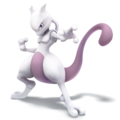 Mewtwo |
Mewtwo puts its psychic powers to great use in this game. Not only does it have floaty jumps, but its telekinesis gives its extra reach and its throws added power. However, its light body makes it easy to launch, so if you're willing to take the risk of getting in close, it might be worth it! | Standard - Shadow Ball Side - Confusion Up - Teleport Down - Disable |
Psystrike | |
| Release Date: April 28, 2015 (April 15, 2015 for Club Nintendo members who have purchased and registered both versions of the game) Price: US$3.99; US$4.99 if purchased with the 3DS version; free download for Club Nintendo members who have purchased and registered both versions of the game | ||||
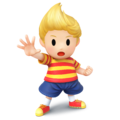 Lucas |
The younger of the twin brothers from Nowhere makes his triumphant return to the game of Smash. Hailing from the Japan-only game Mother 3, Lucas's specialty is psychic projectile attacks. He can use these PSI attacks to do things like absorb enemy projectiles and deal supernatural damage! | Standard - PK Freeze Side - PK Fire Up - PK Thunder Down - PSI Magnet |
PK Starstorm | |
| Release Date: June 14, 2015 Price: US$3.99; US$4.99 if purchased with the 3DS version | ||||
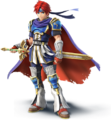 Roy |
Roy, the main character of Fire Emblem: The Binding Blade, returns for the first time since Melee! In The Binding Blade, Roy led the troops of Pherae into battle in his ailing father’s stead, and now he brings his speed and talent for short-range combat into this game. His sword, the Sword of Seals, is uniquely powerful at the base of the blade. | Standard - Flare Blade Side - Double-Edge Dance Up - Blazer Down - Counter |
Critical Hit | |
| Release Date: June 14, 2015 Price: US$3.99; US$4.99 if purchased with the 3DS version | ||||
 Ryu |
Ryu visits from the Street Fighter series! Ryu's fighting style is based on karate, but he's mixed in some other martial arts to make his own unique style. In Smash, he will perform either weak or strong attacks depending on if you press or hold down the buttons. His special attacks also have three power levels! | Standard - Hadouken Side - Tatsumaki Senpukyaku Up - Shoryuken Down - Focus Attack |
Shinku Hadoken / Shin Shoryuken | |
| Release Date: June 14, 2015 Price: US$5.99; US$6.99 if purchased with the 3DS version (both bundled with Suzaku Castle) | ||||
 Cloud |
The protagonist of FINAL FANTASY VII, Cloud wields the enormous Buster Sword, a memento from his comrad Zack. Once a SOLDIER of Shinra, he now fights as a mercenary against the corporation he originally served. His decision to join AVALANCHE's insurgence, however, will transform his destiny. | Standard - Blade Beam Side - Cross Slash Up - Climhazzard Down - Limit Charge / Finishing Touch |
Omnislash | |
| Release Date: December 15, 2015 Price: US$5.99; US$6.99 if purchased with the 3DS version (both bundled with Midgar) | ||||
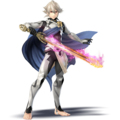 Corrin |
Corrin joins the battle from Fire Emblem Fates. Born in Hoshido but kidnapped by Nohr at a young age, Corrin was brought up by Nohrian royalty. Descended from the First Dragons, Corrin has the power to transform into a dragon. In Smash, Corrin can change parts of the body into lance-like hands and feet that have a long reach that deal more damage at the tips. | Standard - Dragon Fang Shot Side - Dragon Lunge Up - Draconic Ascent Down - Counter Surge |
Torrential Roar | |
| Release Date: February 3, 2016 Price: US$4.99; US$5.99 if purchased with the 3DS version | ||||
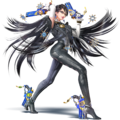 Bayonetta |
Bayonetta is one of the last of the near-extinct Umbra Witches clan. She's a master of the Bullet Arts and can use her hair as a conduit to bring forth Infernal Demons. She brings all these skills and more to Smash, where she'll unleash additional damage if you hold the attack button. Damage and distract your foes with this move! | Standard - Bullet Climax Side - Heel Slide / After Burner Kick Up - Witch Twist Down - Witch Time |
Infernal Climax | |
| Release Date: February 3, 2016 Price: US$5.99; US$6.99 if purchased with the 3DS version (both bundled with Umbra Clock Tower) | ||||
Unlocking criteria[edit]
| Character | Criteria I | Criteria II | Stage of battle |
|---|---|---|---|
| Falco | Clear Classic Mode | Play 10 matches | Orbital Gate Assault |
| Wario | Clear 100-Man Smash | Play 20 matches | Gamer |
| Lucina | Clear Classic Mode on intensity 5.5 or higher | Play 30 matches | Coliseum |
| Dark Pit | Clear All-Star mode on Normal difficulty | Play 40 matches | Palutena's Temple |
| Dr. Mario | Clear a Hard difficulty Master Orders ticket | Play 50 matches | Delfino Plaza |
| R.O.B. | Clear Crazy Orders after 10 rounds and defeat Crazy Hand | Play 60 matches | Wrecking Crew |
| Mr. Game & Watch | Clear Classic Mode on intensity 2.0 or higher with 5 characters | Play 80 matches | Flat Zone X |
| Duck Hunt | Earn 1 KO in Cruel Smash | Play 100 matches | Duck Hunt |
| Mii Fighter | Create in Custom | N/A | N/A |
Other characters[edit]
Character movesets[edit]
- F.L.U.D.D. (Mario attack)
- Toad (Peach attack)
- Mechakoopa (Bowser Jr. attack)
- Shadow Mario (Bowser Jr.'s Final Smash)
- Navi (Link taunt)
- Phantom (Zelda attack)
- Gordo (King Dedede attack)
- Chrom (Robin's Final Smash)
- Pikmin (Olimar attack)
- Lloid (Villager attack)
- Tom Nook (Villager's Final Smash)
- Timmy and Tommy Nook (Villager's Final Smash)
- Rush (Mega Man attack)
- Mega Man X (Mega Man's Final Smash)
- Mega Man Volnutt (Mega Man's Final Smash)
- MegaMan.EXE (Mega Man's Final Smash)
- Star Force Mega Man/Geo Stellar (Mega Man's Final Smash)
- Wild Gunman (Duck Hunt attack and Final Smash)
- Blinky, Pinky, Inky, and/or Clyde (Pac-Man attack and taunt)
- Fighter (Galaga) (Pac-Man attack and taunt)
- Galaxip (Pac-Man taunt)
- Hypership (Gaplus) (Pac-Man taunt)
- Mappy (Pac-Man taunt)
- Pooka (Pac-Man taunt)
- King (King & Balloon) (Pac-Man taunt)
- Souvalou (Xevious) (Pac-Man taunt)
- Boscononian (Pac-Man taunt)
- Gilgamesh (Tower of Druaga) (Pac-Man taunt)
- Clovis (Dragon Buster) (Pac-Man taunt)
- Red Baron (Sky Kid) (Pac-Man taunt)
- Rally-X Car (Pac-Man taunt)
- Paccet (Pac-Man taunt)
- Topcup (Pac-Man taunt)
- Don-chan (Pac-Man taunt)
- Dunban (Shulk's Final Smash)
- Riki (Shulk's Final Smash)
Stage cameos[edit]
|
|
|
Stage bosses[edit]
- Nabbit (Mushroom Kingdom U)
- Yellow Devil (Wily Castle)
- Ridley/Meta Ridley (Pyrosphere)
- Metal Face (Gaur Plain)
- Master Hand
- Crazy Hand
- Master Core
Stages[edit]
Super Smash Bros. for Wii U has a total of 55 stages, mostly based on home console games to differ from Super Smash Bros. for Nintendo 3DS's stages, which are mostly based on handheld games. 34 of the stages are new with 21 returning from the previous three games. 41 of the stages are immediately available with five being locked and nine being downloadable. Thirteen stages are shared between both versions, which includes all downloadable stages aside from Pirate Ship and Miiverse.
Unlike Super Smash Bros. for Nintendo 3DS, this game has a full My Music feature, allowing players to change the frequency at which each song plays for every stage. Players can change the music settings in the My Music menu, or on the stage select screen by pressing ![]() . Finally, every stage in the game has an "omega" ("Ω") variant, a completely flat stage similar to Final Destination, which can be selected on the stage select screen by pressing
. Finally, every stage in the game has an "omega" ("Ω") variant, a completely flat stage similar to Final Destination, which can be selected on the stage select screen by pressing ![]() .
.
With the discontinuation of digital purchases for Wii U in March 2023, it is no longer possible to buy the paid downloadable stages, though they can still be downloaded by those who purchased them when they were available.
Stages listed in italics are unlockable.
| Stage | Description | Songs | Maximum # of players | ||||
|---|---|---|---|---|---|---|---|
| Normal | Omega | ||||||
| Normal Stages | |||||||
 Battlefield† |
The general layout of this stage has not changed since the original Super Smash Bros. It has a long base platform with three semi-solid platforms hanging above it. In this game, ruins surround the Battlefield and the time of day rotates as battles continue. This is one of the few stages shared between versions. |
|
8 | 8 | |||
 Big Battlefield |
A bigger version of the Battlefield stage, made to hold a larger number of players to accommodate for the new 8-Player Smash mode. Like Battlefield, it has a long, solid base platform, but six platforms hanging above it instead of three. | 8 | 8 | ||||
 Final Destination† |
Like in previous installments, Final Destination is a simple stage, consisting only of a large platform with no stage hazards or other gimmicks. When playing through Classic Mode, the bosses Master Hand, Crazy Hand, and/or Master Core are fought here. The scenery changes as battles continue. This is one of the few stages shared between versions. |
|
4 | 4 | |||
 Mushroom Kingdom U (New Super Mario Bros. U) |
Mushroom Kingdom U changes between areas based on New Super Mario Bros. U, each with its own properties and hazards. Additionally, the character Nabbit occasionally appears to trap players in his bag and carry them off-screen. |
|
4 | 8 | |||
 Mario Galaxy (Super Mario Galaxy) |
Taking place on the Gateway Galaxy planet from Super Mario Galaxy, this stage has a large planet with a curved gravity which affects the characters and most projectiles. Two semi-solid platforms also hang above the stage. |
|
8 | 8 | |||
 Delfino Plaza* (Super Mario Sunshine) |
Returning from Super Smash Bros. Brawl, the stage has players battle in Delfino Plaza from Super Mario Sunshine. The main stage itself is a large platform with several semi-solid platforms above it, the layout of which changes each time the stage returns to pick up player after dropping them at a location in Delfino Plaza. Players can fight in locations ranging from Bianco Square to on top of the Shine Gate. |
|
4 | 8 | |||
 Mario Circuit (Mario Kart 8) |
This stage is based on the Mario Circuit from Mario Kart 8. The main stage carries players around the race track and drops them at certain points, much like Delfino Plaza. Several Shy Guys are seen racing around the track and can damage the players if they come into contact with them. |
|
4 | 4 | |||
 Mario Circuit (Brawl)* (Mario Kart) |
This stage returns from Super Smash Bros. Brawl. Despite being called "Mario Circuit", it does not appear to be based on any Mario Circuit in particular, instead more closely resembling the Figure-8 Circuit track from Mario Kart DS. It consists of three semi-solid platform placed above the ground, all of which Shy Guys drive on, damaging players if the Shy Guys run into them.
If battling with more the four players, the Shy Guys are absent. |
|
8 | 8 | |||
 Luigi's Mansion* (Luigi's Mansion) |
Returning from Super Smash Bros. Brawl, this stage is based on the mansion of the same name. There are three levels to the stage which players can jump between, though the mansion itself is situated over a large chasm. The pillars holding the mansion up can be destroyed, collapsing the mansion upon doing so. However, the pillars cannot be destroyed when battling with more than four characters. |
|
8 | 8 | |||
 Jungle Hijinxs (Donkey Kong Country Returns) |
A stage based on the level of the same name from Donkey Kong Country Returns. Unique to this stage are dual planes, a feature taken from Donkey Kong Country Returns; there is a battlefield in the front and one in the back. Both have several platforms the players can jump between and the Barrel Cannons are the means of transport between the two planes. |
|
4 | 8 | |||
 Kongo Jungle 64*** (Donkey Kong Country) |
Returning from the first Super Smash Bros., this stage has a base platform with two semi-solid platforms above it and a rotating set of platforms in the center. A single, rotating Barrel Cannon travels beneath the stage, launching anyone within it. |
|
8 | 8 | |||
 Skyloft (The Legend of Zelda: Skyward Sword) |
This stage has players fighting on a large platform containing several semi-solid platforms above it as the stage travels around Skyloft from The Legend of Zelda: Skyward Sword. The stage drops players off at various locations on Skyloft for players to continue fighting on, ranging from underneath the floating island to the top of the Statue of the Goddess. |
|
4 | 4 | |||
 Bridge of Eldin* (The Legend of Zelda: Twilight Princess) |
Returning from Super Smash Bros. Brawl, the stage is based on the Bridge of Eldin from The Legend of Zelda: Twilight Princess. It is a long, stone platform. Occasionally, the character King Bulblin will ride across the stage and drop a bomb, destroying the center part of the bridge. Later on, a Portal will appear to repair the bridge. |
|
8 | 8 | |||
 Temple** (The Legend of Zelda) |
Returning from Super Smash Bros. Melee, this stage is based on the temples found in The Legend of Zelda series. It is a large stage with several platforms and an underground area, all suspended in midair. |
|
8 | 8 | |||
 Pyrosphere (Metroid: Other M) |
Based on the Pyrosphere from Metroid: Other M, specifically the Geothermal Power Plant. The stage consists of a large base platform with semi-solid platforms hanging on either side. Like in Metroid: Other M, Ridley can be fought here, though he'll join a player's side if he is attacked by that player enough times. Other enemies from the game also appear. |
|
8 | 8 | |||
 Norfair* (Metroid) |
Returning from Super Smash Bros. Brawl, this stage is based on the location of the same name from the Metroid series. The stage has several platforms situated over a large pool of lava. The lava will occasionally rise up, encompassing most of the stage, along with large geysers and walls of lava coming from behind and the sides of the stage. When battling with more than four players, the lava geysers and walls will not appear. |
|
8 | 8 | |||
 Port Town Aero Dive* (F-Zero GX) |
Returning from Super Smash Bros. Brawl, this stage is based on the Port Town - Aero Dive from F-Zero GX. It has the player fight on a long platform that goes around the track, occasionally lowering the players onto the track itself. Several F-Zero machines race along the track and will damage the player if they come into contact. |
|
4 | 8 | |||
 Woolly World (Yoshi's Woolly World) |
A stage based on the aesthetics of Yoshi's Woolly World. The stage has a large mobile with hanging platforms that will rise into the air after enough time has passed. |
|
4 | 8 | |||
 Yoshi's Island** (Super Mario World) |
A stage based on the elements from Super Mario World and returns from Super Smash Bros. Melee. It has several Rotating Blocks acting as platforms, a hill to the right, and a sloped Warp Pipe to the left. |
|
8 | 8 | |||
 The Great Cave Offensive (Kirby Super Star) |
Based on the Great Cave Offensive from Kirby Super Star, the stage is a giant labyrinth filled with platforms, Danger Zones, and randomly generated treasure chests. It is the largest stage in the game. |
|
8 | 8 | |||
 Halberd* (Kirby Super Star) |
A stage returning from Super Smash Bros. Brawl. The main platform circles around Meta Knight's Halberd ship. The platform will eventually rest at an opening on the ship where the players will become vulnerable to the ship's large cannon. |
|
4 | 8 | |||
 Orbital Gate Assault (Star Fox: Assault) |
A stage based on the Orbital Gate from the Star Fox series, specifically during the Aparoid invasion from Star Fox Assault. The platform layout constantly changes as the ships and the Aparoid missiles move around. If Fox and Falco aren't present during a match, a conversation between the Star Fox crew can be activated. |
|
4 | 8 | |||
 Lylat Cruise* (Star Fox) |
A returning stage from Super Smash Bros. Brawl. The layout of the stage is similar to Battlefield's, though the platforms are more angled. As the ship goes through the stage's scenery, the stage will tilt slightly, making certain moves difficult to connect. |
|
8 | 8 | |||
 Kalos Pokémon League (Pokémon X and Pokémon Y) |
This stage is based on the Kalos Region's variant of the Pokémon League from Pokémon X and Pokémon Y. The stage cycles between the main hall and the four other chambers, representing a member of the Pokémon League and the appearance and gimmicks of the stage change accordingly. |
|
4 | 8 | |||
 Pokémon Stadium 2* (Pokémon) |
A returning stage from Super Smash Bros. Brawl. The stage's layout constantly changes, and the hazards change depending on the current "type" variation the stage is on. |
|
8 | 8 | |||
 Onett** (EarthBound) |
Returning from Super Smash Bros. Melee, this stage has several buildings the player can jump between, including two houses and a drug store. Occasionally, cars will drive by close enough to the stage to damage players if they're on the ground. Additionally, the rafters on the drug store will collapse if player jump on it too many times. |
|
8 | 8 | |||
 Coliseum (Fire Emblem) |
A stage based on the several arenas from the Fire Emblem series. At first, the stage is long and flat, though platforms will continuously rise and fall as the battle continues. |
|
4 | 4 | |||
 Castle Siege* (Fire Emblem) |
A returning stage from Super Smash Bros. Brawl. The stage cycles between three phases: a castle's exterior, the castle's interior, and a lava-filled underground area. All of which are common areas seen in the Fire Emblem games. |
|
8 | 8 | |||
 Flat Zone X (Game & Watch) |
A combination of the Flat Zone stage from Super Smash Bros. Melee and the Flat Zone 2 stage from Super Smash Bros. Brawl and Super Smash Bros. for Nintendo 3DS. As such, it features elements from both of those stages. |
|
6 | 8 | |||
 Palutena's Temple (Kid Icarus: Uprising) |
A large stage based on Palutena's Temple from Kid Icarus: Uprising. It features many platforms and hazards, some of which can be destroyed or will move. Pit, if present on the stage, is also able to communicate with Palutena and Viridi to get advice on his opponents. |
|
8 | 8 | |||
 Skyworld* (Kid Icarus) |
A returning stage from Super Smash Bros. Brawl. The platforms present on the stage can be temporarily broken, allowing players to fall through them. |
|
6 | 8 | |||
 Gamer (Game & Wario) |
A stage based on the game of the same name that can be played in Game & Wario. The stages layout changes each time it's played on, but it always takes place on a large table. 5-Volt constantly appears and any characters caught in her gaze will be launched. Players can use the layout to hide from her when she is present, however. |
|
4 | 8 | |||
 Garden of Hope (Pikmin 3) |
A stage based on Garden of Hope from Pikmin 3. As well as featuring many platforms, a Peckish Aristocrab will occasionally appear to destroy the structures and heavily damage players it comes into contact with. |
|
4 | 8 | |||
 Town and City (Animal Crossing: City Folk) |
A stage based on both the player's town and the city from Animal Crossing: City Folk. It moves between two locations, with the characters and background changing respectively. The stage itself is one solid platform with several semi-solid platforms above it. The time of day is affected by the Wii U system's built-in clock. |
|
8 | 8 | |||
 Smashville* (Animal Crossing) |
A returning stage from Super Smash Bros. Brawl. It is similar to Town and City in design, but does not feature the city background (as this stage is based on Animal Crossing: Wild World, which did not feature the city). The time of day, like Town and City, is affected by the Wii U system's built-in clock. |
|
8 | 8 | |||
 Wii Fit Studio (Wii Fit) |
A stage based on the Wii Fit series. The stage features a mirror that will change occasionally to a silhouette demonstrating yoga poses and platforms designed after Wii Balance Boards. |
|
8 | 8 | |||
 Boxing Ring† (Punch-Out!!) |
A stage based on the Boxing Ring of the Punch-Out!! series. The ropes around the ring of the stage act as springs and can be used to get to the stage's light fixture, which can be knocked down and damage opponents. |
|
4 | 4 | |||
 Gaur Plain† (Xenoblade Chronicles) |
Based on the Gaur Plain from Xenoblade Chronicles, the stage consists of a multitude of platforms. Metal Face attacks fighters at night and can destroy the platforms. This is one of the stages shared between versions, though the 3DS's variant is smaller and lacks Metal Face. |
|
8 | 8 | |||
 Duck Hunt† (Duck Hunt) |
A stage based on the game Duck Hunt. The stage is one long platform with the trees acting as platforms above it. The Duck Hunt dog will pop out of the grass occasionally, acting as another platform himself. Initially available only for the Wii U version, it was included in a free update for the 3DS version on September 30, 2015. |
|
8 | 8 | |||
 75 m* (Donkey Kong) |
Returning from from Super Smash Bros. Brawl, this stage is based on the 75m level from the original Donkey Kong game. It features many ladders, platforms, and obstacles. The retro Donkey Kong found here will even occasionally send springs from the left side to act as obstacles. |
|
8 | 8 | |||
 Wrecking Crew (Wrecking Crew) |
This stage stays true to its origin of the NES game, Wrecking Crew, though with a big overhaul in design. The bombs will cause the above floor to fall when attacked and the barrels can trap characters temporarily if they fall on them. |
|
4 | 8 | |||
 Pilotwings (Pilotwings) |
A stage based on two areas from the Pilotwings series. As it travels between locations, characters battle on planes. The match starts on the classic red bi-plane from the original Pilotwings before shifting onto the modern yellow bi-plane from Pilotwings Resort. |
|
4 | 8 | |||
 Wuhu Island (Wii Sports Resort) |
A stage taking place on Wuhu Island; a location which first appeared in Wii Sports Resort. Its main platforms bring players around the stage, dropping them at several locations for the fight to continue on. |
|
4 | 4 | |||
 Windy Hill Zone (Sonic Lost World) |
A medium-sized stage, based on the first area from the Lost Hex, found in Sonic Lost World. It features many different types of platforms, including a large wheel with rotating platforms. Like with the Mario Galaxy stage, the main platform is curved, affecting players' and some projectiles' gravity. |
|
8 | 8 | |||
 Wily Castle† (Mega Man) |
A stage based on Wily Castle from the Mega Man series, with this iteration specifically based on Mega Man 2. Several platforms move around the stage. The Yellow Devil appears occasionally and interfere with the battle. |
|
4 | 8 | |||
 Pac-Land (Pac-Land) |
A stage based on the game PAC-LAND. It is a scrolling stage, moving between locations from said game. |
|
6 | 8 | |||
| Extra Stages | |||||||
 Dream Land (64)†*** (Kirby) |
Release date: June 14, 2015 A stage returning from Super Smash Bros. It is based on the Dream Land stages of the Kirby series. Its layout is exactly like Battlefield's: A base platform with three platforms above it. Whispy Woods will occasionally blow wind to push characters toward the edges of the stage. Bronto Burts and King Dedede appear in the background of the stage. |
|
8 | 8 | |||
 Suzaku Castle†[7] (Street Fighter II) |
Release date: June 14, 2015 A stage based on Ryu's home stage in Street Fighter II. The stage has four wooden platforms; the two to the right have walkoffs, while the left side has one small platform above another small platform. There are signs that can be broken, but they do not have any influence on gameplay. |
|
8 | 8 | |||
 Miiverse (Miiverse) |
Release date: June 14, 2015 A stage available as free DLC from the 1.0.8 update. It is based on Miiverse (Nintendo's social website service) and posts from players can be displayed in the stage's background. The layout is exactly like Battlefield's. This stage cannot be played online. |
|
4 | 4 | |||
 Peach's Castle (64)†*** (Super Mario) |
Release date: July 31, 2015 A stage returning from Super Smash Bros. This stage has a tower with a moving board and a thin, pass-through platform as well as two slanted platforms hovering in mid-air. A bumper is situated above the stage which will knock away players that hit it. |
|
8 | 8 | |||
 Hyrule Castle (64)†*** (The Legend of Zelda) |
Release date: July 31, 2015 A stage returning from Super Smash Bros. This stage plays out on the top of Hyrule Castle from The Legend of Zelda: Ocarina of Time. Aside from the base platform, it has a slanted area to the left, floating platforms in the middle, and a covered area to the right. Every 30 seconds, a whirlwind appears, able to catch players and fire them up into the air, which can KO them at high percentages. |
|
8 | 8 | |||
 Super Mario Maker† (Super Mario Maker) |
Release date: September 30, 2015 A stage based on Super Mario Maker. The layout of the stage is different every time it is played on, containing several platforms ? Blocks, and Brick Blocks. It also has elements the original game does not, such as placable lava and slopes. The style of the stage changes throughout the battle, changing through the styles of Super Mario Bros., Super Mario Bros. 3, Super Mario World, and New Super Mario Bros. U. |
|
8 | 8 | |||
 Pirate Ship* (The Legend of Zelda: The Wind Waker) |
Release date: September 30, 2015 A returning stage from Super Smash Bros. Brawl based on Tetra's Pirate Ship from The Legend of Zelda: The Wind Waker. The deck of the ship acts as the main platform with the mast containing two more platforms above it. A catapult also comes out of the ship and will launch players standing on or near it. The King of Red Lions will sometimes sail up to the stern of the ship acting as another platform. |
|
4 | 8 | |||
 Midgar† (Final Fantasy VII) |
Release date: December 15, 2015 Midgar is the city from Final Fantasy VII. The stage has a similar layout to Battlefield, but during the battle, collecting a Summon Materia causes one of the game's summons to appear and attack the stage and combatants. |
|
8 | 8 | |||
 Umbra Clock Tower† (Bayonetta) |
Release date: March 2, 2016 A piece of the falling clock tower from the opening of Bayonetta. While the stage itself is completely flat, pieces of debris may fly by to serve as platforms. |
|
8 | 8 | |||
† - Stages that also appear in Super Smash Bros. for Nintendo 3DS
* - Returning stages from Super Smash Bros. Brawl
** - Returning stages from Super Smash Bros. Melee
*** - Returning stages from Super Smash Bros.
Unlocking criteria[edit]
| Stage | Criteria |
|---|---|
| Kongo Jungle 64 | Clear the "The Original Heavyweights" Event |
| Pokemon Stadium 2 | Clear the "When Lightning Strikes" Event |
| Flat Zone X | Break 100 blocks in Trophy Rush as Mr. Game & Watch |
| Smashville | Clear the "Playing Tricks" event |
| PAC-LAND | Play all maps in Smash Tour |
| Duck Hunt | Defeat at least one opponent in Solo Cruel Smash in Multi-Man Smash |
Items[edit]
Super Smash Bros. for Nintendo 3DS and Super Smash Bros. for Wii U feature many new items. Both versions feature the same types of items.
Normal items[edit]
75 items, 26 of which are new, appear in the games.
New items[edit]
Returning items[edit]
Assist Trophies[edit]
In both games, Assist Trophies return. 37 Assist Trophies are featured, of which 21 are new, and the other 18 are returning from Super Smash Bros. Brawl.
New Assist Trophies[edit]
Returning Assist Trophies[edit]
Pokémon[edit]
Just like the Assist Trophies, Nintendo has implemented the use of Pokémon. This set of Pokémon features more focus on the fifth and sixth generations, but still features Pokémon from the previous generations. The Wii U and 3DS versions have the same amount of Pokemon. 40 different species are featured, of which 23 are new.
New Pokémon[edit]
|
|
|
Returning Pokémon[edit]
|
|
|
Reception[edit]
Critical reception[edit]
Super Smash Bros. for Wii U has received critical acclaim, praising its variety of modes and character selection.
| Reviews | |||
|---|---|---|---|
| Reviewer, Publication | Score | Comment | |
| Griffin McElroy, Polygon | 9.5/10 | "Pound for pound, Super Smash Bros. for Wii U has been the most fun I've had playing video games in 2014, and a well-polished crown jewel in the Wii U's library. I've spent dozens of hours Smashing roomfuls of friends into oblivion, grinding through events and hunting down unlockables — and, happily, I feel like I'm just getting started." | |
| Daniel Starkey, GameSpot | 9/10 | "Poor internet functionality is, thankfully, a blight on an otherwise incredible game. Between the Masterpiece Collections, which are short demos of the classic games that inspired Smash Bros., the many fighters and stages, the deep character customization for fine-tuning your fighters to suit your play style, and the extensive screenshot editing tools, there's just so much to do. With the Wii U release, Smash Bros. has fully realized its goals. There's something here for nearly everyone--from young to old, from novice to expert--presented almost without compromise. Super Smash Bros. Wii U invites everyone to join in its undiluted, joyous celebration of the broad community that Nintendo has built over the past forty years." | |
| Jose Otero, IGN | 9.8/10 | "Nearly every aspect of Smash Wii U seems fine-tuned not only to appeal to the nostalgia of long-time Nintendo fans, but also to be accessible to new players. Once they're hooked, it draws them in deeper with a set of great modes and tempting rewards. There's just so much here, and I've rarely seen a game with so many enjoyable and replayable ideas in a single package. Playing eight-player matches and classic four-player brawls are only the beginning, and I don't see a reason to stop playing Super Smash Bros. for Wii U for a long time." | |
| Aggregators | |||
| Compiler | Platform / Score | ||
| Metacritic | 92 | ||
| GameRankings | 92.39% | ||
Sales[edit]
Within three days of launch in North America, Super Smash Bros. for Wii U sold over 490,000 units, making it the fastest-selling Wii U title in North America.[14] As of September 30, 2021, the game had sold 5.38 million units worldwide.[15]
Awards[edit]
Super Smash Bros. for Wii U also won the award for the "Best Fighting Game" at The Game Awards 2014.[16]
Updates[edit]
Note that the most recent software update must be downloaded to access Nintendo Online. In addition, most updates invalidate replay data created before that update, making them unplayable, due to replays reading game data and inputting recordings of data live, rather than actual footage.
1.0.1[edit]
Release date: November 21, 2014
On the same day as the release of the game, update version 1.0.1 was released for Super Smash Bros. for Wii U. The update makes fixes to enhance gameplay stability. For those who pre-ordered the game digitally, the update is part of the game download.[17]
1.0.2[edit]
Release date: January 29, 2015
The second update was released January 29, 2015, the update's download size is 316 MB, and it updates the game to version 1.0.2. It is also required for online play. The update adds 15 additional stages to 8-Player Smash mode, nine standard and six omega forms, in addition to making other minor fixes.[18]
1.0.6[edit]
Release date: April 15, 2015[19]
The third update for Super Smash Bros. for Wii U was released the same day as the Mewtwo downloadable content for Club Nintendo members as well as the additional Mii suits, updating the game directly to version 1.0.6, the same as the current version of the Nintendo 3DS game. In addition to adjusting the character balance, the update adds a prompt to the Notifications menu to take players directly to the Nintendo eShop to purchase downloadable content. The update also adds Share mode to Super Smash Bros. for Wii U, allowing players to post, view, and download replays, photos, Mii Fighters, and custom stages online.[19] The update also adds six additional Ω versions of stages to 8-Player Smash mode. The update also adds compatibility with the first set of released downloadable content.
1.0.7[edit]
Release date: April 23, 2015
For the game's fourth update, a glitch in interpreting Global Smash Power for Mewtwo was fixed that prevented players from accessing Online, since the data was interpreted as invalid.
1.0.8[edit]
Release date: June 14, 2015
The fifth game update allows for the game to receive the latest set of downloadable content. The Miiverse stage, along with Dreamland N64 has been added into the game, and individual communities have been created for every character allowing users to post comments to cheer that fighter on. Various other gameplay adjustments have also been made.
1.0.9[edit]
Release date: July 2, 2015
This update simply makes unspecified gameplay changes.[20]
1.1.0[edit]
Release date: July 30, 2015
The version 1.1.0 update adds Tournament mode to the game, as well as the ability to post saved replays to YouTube. This also adds compatibility with the latest set of downloadable content released July 31. In addition, upon downloading, players receive the K.K. Slider Outfit and Hat for free.[21]
1.1.1[edit]
Release Date: September 30th, 2015
Version 1.1.1 adds compatibility with the latest set of downloadable content released the same day. The update also makes various gameplay changes and it added a wave for the female Robin using the Levin Sword in one of her Victory Poses.[22]
1.1.2[edit]
Release Date: October 8, 2015
For update version 1.1.2, the only update to the game is a fix for a glitch which makes Diddy Kong unable to be grabbed after being hit with a multi-hit attack while shielding.[23]
1.1.3[edit]
Release Date: December 15, 2015
The tenth update of the game adds compatibility with the latest set of downloadable content released the same day.
1.1.4[edit]
Release date: February 3, 2016
The eleventh update of the game adds compatibility with the latest set of downloadable content released the same day.
1.1.5[edit]
Release date: March 15, 2016
The twelfth update includes new changes for characters.
1.1.6[edit]
Release date: May 20, 2016
The thirteenth update includes new changes only for Bayonetta.
1.1.7[edit]
Release date: July 18, 2017
The fourteenth update adds amiibo compatibility for Bayonetta, Cloud Strife, and Corrin. Due to no balance changes, replays from version 1.1.6 are unaffected.
Downloadable content[edit]
Sixteen downloadable features have been released, consisting of nine stages and seven playable characters. Mewtwo was released in April 2015; owners of both versions that registered the games in Club Nintendo received the DLC for free. Lucas, Roy and Ryu were released in June 2015. Cloud was released in December 2015. Corrin and Bayonetta were released in February 2016. The stages Miiverse, Dream Land (64) and Suzaku Castle were also released in June 2015, while Peach's Castle (64) and Hyrule Castle (64) were released in July, Pirate Ship and Super Mario Maker were released in September, Midgar was released in December 2015, and Umbra Clock Tower was released in February 2016. Finally, six waves of additional Mii Costumes have been released alongside the characters and stages.
Bundles also exist which allow players to purchase entire waves or specific portions of the downloadable content.
amiibo[edit]
Super Smash Bros. for Wii U natively features amiibo support, and is the first Wii U game to feature amiibo compatibility. Using these figures allows players to have the figure's character appear in the game and fight, either with or against the player or against each other.[24] Every time an amiibo competes in battle, it increases its level and battle stats,[25] the highest level being fifty.[26] Its moves are also customizable.[25] The Super Smash Bros. line of amiibo launched alongside the Wii U game as the first line of amiibo figurines; the Super Smash Bros. line is being released in waves, with every fighter planned to receive an amiibo.[27]
Soundtrack[edit]
A two-disc soundtrack for Super Smash Bros. for Nintendo 3DS / Wii U was distributed exclusively to Club Nintendo members who registered a copy of both the Wii U and Nintendo 3DS game before January 13, 2015.[12] The red disc contains tracks from the Nintendo 3DS game, while the blue disc contains tracks from the Wii U game.[7]
Pre-release and unused content[edit]
According to Masahiro Sakurai on Famitsu, he was planning on adding the Ice Climbers for Super Smash Bros. for Nintendo 3DS / Wii U, but despite the characters running without problems on the Wii U version, the team had trouble getting the Ice Climbers working in the Nintendo 3DS, as Masahiro Sakurai stated that the fighters in the 3DS version would be running at 60 frames per second.[28]
Staff[edit]
- Main article: List of Super Smash Bros. for Wii U staff
Glitches[edit]
- Main article: List of Super Smash Bros. for Wii U glitches
Gallery[edit]
- For this subject's image gallery, see Gallery:Super Smash Bros. for Wii U.
Media[edit]
- For this subject's sound test, see Super Smash Bros. for Nintendo 3DS / Wii U sound test.
| File info 0:29 |
| File info 0:29 |
| File info 0:29 |
| File info 0:30 |
Names in other languages[edit]
| Language | Name | Meaning | Notes |
|---|---|---|---|
| Japanese | 大乱闘スマッシュブラザーズ for Wii U[?] Dairantō Sumasshu Burazāzu fō Wī Yū |
Great Melee Smash Bros. for Wii U | |
| Chinese (simplified) | 群星劲爆大乱斗 for Wii U[?] Qúnxīng Jìngbào Dàluàndòu for Wii U |
All-Stars Exciting Great Melee for Wii U | |
| Chinese (traditional) | 任天堂明星大亂鬥 for Wii U[?] Rèntiāntáng Míngxīng Dàluàndòu for Wii U |
Nintendo Stars: Great Melee for Wii U | |
| Italian | Super Smash Bros. per Wii U (Italian game site's title)[?] | Super Smash Bros. for Wii U | |
| Super Smash Bros. for Wii U (on Nintendo.it)[?] | - | ||
| Korean | 슈퍼 스매시브라더스 for Wii U[?] Syupeo Seumaeshi Beuradeoseu for Wii U |
Super Smash Bros. for Wii U |
References[edit]
- ^ Sitio oficial - Super Smash Bros. para Nintendo 3DS / Wii U. Nintendo (Latin American Spanish). Retrieved June 25, 2024.
- ^ November 27, 2014. Super Smash Bros. for Wii U and amiibo take South Africa by storm this festive season. Nintendo of South Africa (British English).
- ^ Nintendo Direct 6.21.2012. Nintendo of America (American English). Retrieved June 25, 2024.
- ^ @NintendoAmerica (October 4, 2023). As of early April 2024, online play and other functionality that uses online communication will end service for Nintendo 3DS and Wii U software. Thank you very much for your continued support of our products.. X. Retrieved February 17, 2024.
- ^ @NintendoAmerica (January 23, 2024). Update: as of 4/8, online play and other functionality that uses online communication will end service for Nintendo 3DS and Wii U software. Thank you very much for your continued support of our products.. X. Retrieved February 17, 2024.
- ^ Nintendo of America (June 11, 2013). Wii U & Nintendo 3DS Developer Direct - Super Smash Bros. for Nintendo 3DS and Wii U @E3 2013. YouTube (American English). Retrieved June 25, 2024.
- ^ a b c d e f g h i Nintendo of America (October 23, 2014). Wii U - Super Smash Bros. for Wii U 50-Fact Extravaganza. YouTube (American English). Retrieved June 25, 2024.
- ^ Super Smash Bros. for Nintendo 3DS / Wii U - Character Creation. Nintendo of America (American English). Retrieved June 25, 2024.
- ^ S. Good, Owen (September 13, 2014). Polygon (English). Retrieved June 25, 2024.
- ^ Sahdev, Ishaan (June 14, 2015). You Can Now Use Your 3DS To Control Super Smash Bros. for Wii U Without A Copy Of The Game. Siliconera. Retrieved June 25, 2024.
- ^ Soneek BCM (December 12, 2015). 8 Player Smash on ANY stage. YouTube. Retrieved June 25, 2024.
- ^ a b Super Smash Bros Offer. Club Nintendo (American English). Archived September 2, 2014, 06:07:41 UTC from the original via Wayback Machine. Retrieved June 25, 2024.
- ^ Nintendo of Europe (November 20, 2014). Mewtwo will be available to purchase later in #SmashBros, for those who don't register both versions. http://fal.cn/Efs. X (British English). Retrieved June 25, 2024.
- ^ Karmali, Luke (November 25, 2014). Super Smash Bros. is North America's Fastest-Selling Wii U Game. IGN. Retrieved November 26, 2014.
- ^ November 4, 2021. Top Selling Title Sales Unites. Nintendo (English). Retrieved November 8, 2021. (Archived November 8, 2021, 09:44:05 UTC via Wayback Machine.)
- ^ Sarkar, Samit (December 5, 2014). Here are the winners of The Game Awards 2014. Polygon (English). Retrieved June 25, 2024.
- ^ How to Update Super Smash Bros. for Wii U. Nintendo Support (American English). Retrieved June 25, 2024.
- ^ Seedhouse, Alex (January 29, 2015). Super Smash Bros. for Wii U update 1.0.2 now live. Nintendo Insider (English). Retrieved June 25, 2024.
- ^ a b Nintendo of America (April 1, 2015). Nintendo Direct 4.1.2015 (02:11). YouTube. Retrieved June 25, 2024.
- ^ McMinn, Kevin (July 2, 2015). Super Smash Bros. Wii U Update 1.0.9 Available. Nintendo News (English). Archived July 6, 2015, 03:29:33 UTC from the original via Wayback Machine. Retrieved June 25, 2024.
- ^ Whitehead, Thomas (July 30, 2015). Super Smash Bros. Version 1.1.0 Update is Now Live. Nintendo Life (English). Retrieved June 25, 2024.
- ^ Master0fHyrule (September 30, 2015). Female Robin's Victory Pose Gets Slightly Changed In Latest Patch For Super Smash Bros Wii U. YouTube. Retrieved June 25, 2024.
- ^ Whitehead, Thomas (October 6, 2015). Upcoming Super Smash Bros. Patch Will Make Diddy Kong Less Obnoxious. Nintendo Life (English). Retrieved June 25, 2024.
- ^ Nintendo of America (June 10, 2014). Play Nintendo - Nintendo E3 Digital Event. YouTube (American English). Retrieved June 25, 2024.
- ^ a b Nintendo of America (June 10, 2014). Nintendo - amiibo E3 2014 Trailer. YouTube (American English). Retrieved June 25, 2024.
- ^ Nintendo of America (June 10, 2014). You can level-up your figure player each time you use it to fight. It can go as high as level 50! #SmashBros. X. Retrieved June 25, 2024.
- ^ Otero, Jose (June 12, 2014). E3 2014: Nintendo on Amiibo, Smash Bros., and Custom Figurines. IGN (American English). Retrieved June 25, 2024.
- ^ @NE_Brian (September 16, 2014). Sakurai addresses Ice Climbers’ absence in Smash Bros. Wii U/3DS and more in new Famitsu column. Nintendo Everything (English). Retrieved June 25, 2024.
